|
ExtraordinaryMeeting Notice and Agenda
An Extraordinary Meeting of the Bega Valley Shire
Council will be held at Council Chambers, Biamanga Room Bega Valley
Commemorative Civic Centre Bega on
|
|
ExtraordinaryMeeting Notice and Agenda
An Extraordinary Meeting of the Bega Valley Shire
Council will be held at Council Chambers, Biamanga Room Bega Valley
Commemorative Civic Centre Bega on
|
Council meetings are recorded and live streamed to the Internet for public viewing. By entering the Chambers during an open session of Council, you consent to your attendance and participation being recorded.
The recording will be archived and made available on Council’s website www.begavalley.nsw.gov.au. All care is taken to maintain your privacy; however as a visitor of the public gallery, your presence may be recorded.
The Agendas for Council Meetings and Council Reports for each meeting will be available to the public on Council’s website as close as possible to 5.00 pm on the Thursday prior to each Ordinary Meeting. A hard copy is also made available at the Bega Administration Building reception desk and on the day of the meeting, in the Council Chambers.
The Minutes of Council Meetings are available on Council's Website as close as possible to 5.00 pm on the Monday after the Meeting.
1. Please be aware that the recommendations in the Council Meeting Agenda are recommendations to the Council for consideration. They are not the resolutions (decisions) of Council.
2. Background for reports is provided by staff to the Chief Executive Officer for presentation to Council.
3. The Council may adopt these recommendations, amend the recommendations, determine a completely different course of action, or it may decline to pursue any course of action.
4. The decision of the Council becomes the resolution of the Council, and is recorded in the Minutes of that meeting.
5. The Minutes of each Council meeting are published in draft format, and are confirmed by Councillors, with amendments if necessary, at the next available Council Meeting.
If you require any further information or clarification regarding a report to Counci, please contact Council’s Executive Assistant who can provide you with the appropriate contact details
Phone (02 6499 2222) or email execassist@begavalley.nsw.gov.au.
· Is the decision or conduct legal?
· Is it consistent with Government policy, Council’s objectives and Code of Conduct?
· What will the outcome be for you, your colleagues, the Council, anyone else?
· Does it raise a conflict of interest?
· Do you stand to gain personally at public expense?
· Can the decision be justified in terms of public interest?
· Would it withstand public scrutiny?
A conflict of interest is a clash between private interest and public duty. There are two types of conflict:
· Pecuniary – regulated by the Local Government Act 1993 and Office of Local Government
· Non-pecuniary – regulated by Codes of Conduct and policy. ICAC, Ombudsman, Office of Local Government (advice only). If declaring a Non-Pecuniary Conflict of Interest, Councillors can choose to either disclose and vote, disclose and not vote or leave the Chamber.
· Is it likely I could be influenced by personal interest in carrying out my public duty?
· Would a fair and reasonable person believe I could be so influenced?
· Conflict of interest is closely tied to the layperson’s definition of ‘corruption’ – using public office for private gain.
· Important to consider public perceptions of whether you have a conflict of interest.
1st Do I have private interests affected by a matter I am officially involved in?
2nd Is my official role one of influence or perceived influence over the matter?
3rd Do my private interests conflict with my official role?
For more detailed definitions refer to Sections 442, 448 and 459 or the Local Government Act 1993 and Bega Valley Shire Council (and Model) Code of Conduct, Part 4 – conflict of interest.
Whilst seeking advice is generally useful, the ultimate decision rests with the person concerned.Officers of the following agencies are available during office hours to discuss the obligations placed on Councillors, officers and community committee members by various pieces of legislation, regulation and codes.
|
Contact |
Phone |
|
Website |
|
Bega Valley Shire Council |
(02) 6499 2222 |
council@begavalley.nsw.gov.au |
www.begavalley.nsw.gov.au |
|
ICAC |
8281 5999 Toll Free 1800 463 909 |
icac@icac.nsw.gov.au |
www.icac.nsw.gov.au |
|
Office of Local Government |
(02) 4428 4100 |
olg@olg.nsw.gov.au |
http://www.olg.nsw.gov.au/ |
|
NSW Ombudsman |
(02) 8286 1000 Toll Free 1800 451 524 |
nswombo@ombo.nsw.gov.au |
Under the provisions of Section 451(1) of the Local Government Act 1993 (pecuniary interests) and Part 4 of the Model Code of Conduct prescribed by the Local Government (Discipline) Regulation (conflict of interests) it is necessary for you to disclose the nature of the interest when making a disclosure of a pecuniary interest or a non-pecuniary conflict of interest at a meeting.
The following form should be completed and handed to the Chief Executive Officer as soon as practible once the interest is identified. Declarations are made at Item 3 of the Agenda: Declarations - Pecuniary, Non-Pecuniary and Political Donation Disclosures, and prior to each Item being discussed:
Council meeting held on __________(day) / ___________(month) /____________(year)
|
Item no & subject |
|
|
Pecuniary Interest
|
In my opinion, my interest is pecuniary and I am therefore required to take the action specified in section 451(2) of the Local Government Act 1993 and or any other action required by the Chief Executive Officer. |
|
Significant Non-pecuniary conflict of interest |
– In my opinion, my interest is non-pecuniary but significant. I am unable to remove the source of conflict. I am therefore required to treat the interest as if it were pecuniary and take the action specified in section 451(2) of the Local Government Act 1993. |
|
Non-pecuniary conflict of interest |
In my opinion, my interest is non-pecuniary and less than significant. I therefore make this declaration as I am required to do pursuant to clause 5.11 of Council’s Code of Conduct. However, I intend to continue to be involved with the matter. |
|
Nature of interest |
Be specific and include information such as : · The names of any person or organization with which you have a relationship · The nature of your relationship with the person or organization · The reason(s) why you consider the situation may (or may be perceived to) give rise to a conflict between your personal interests and your public duty as a Councillor. |
|
If Pecuniary |
Leave chamber |
|
If Non-pecuniary (tick one) |
Disclose & vote Disclose & not vote Leave chamber |
|
Reason for action proposed |
Clause 5.11 of Council’s Code of Conduct provides that if you determine that a non-pecuniary conflict of interest is less than significant and does not require further action, you must provide an explanation of why you consider that conflict does not require further action in the circumstances |
|
Print Name |
I disclose the above interest and acknowledge that I will take appropriate action as I have indicated above. |
|
Signed |
|
NB: Please complete a separate form for each Item on the Council Agenda on which you are declaring an interest.
|
Extraordinary Council |
11 January 2022 |
Pecuniary, Non-Pecuniary and Political Donation Disclosures to be declared and tabled.
3.1 Election of Mayor............................................................................................................................. 7
3.2 Election of Deputy Mayor............................................................................................................. 14
3.3 Oath and Affirmation for Councillors......................................................................................... 18
3.4 Adoption of Policy 6.23 - Payment of Expenses and Provision of Facilities to Councillors 21
3.5 Council Meeting Agenda - Order of Business............................................................................ 38
3.6 Council Meeting Dates February 2022 - December 2022..................................................... 153
3.7 Establishment of Committees with Delegated Authority and Advisory Committees..... 156
3.8 Appointment of Council Delegates and Alternates to Internal and External Committees 375
3.9 Countback Elections for filling Councillor casual vacancy.................................................... 381
3.10 Local Government NSW Special Conference 2022................................................................ 384
|
Extraordinary Council |
11 January 2022 |
Staff Reports – Business and Governance
11 January 2022
3.1 Election of Mayor.................................................................................................. 7
3.2 Election of Deputy Mayor................................................................................... 14
3.3 Oath and Affirmation for Councillors.................................................................. 18
3.4 Adoption of Policy 6.23 - Payment of Expenses and Provision of Facilities to Councillors............................................................................................................................. 21
3.5 Council Meeting Agenda - Order of Business..................................................... 38
3.6 Council Meeting Dates February 2022 - December 2022................................. 153
3.7 Establishment of Committees with Delegated Authority and Advisory Committees 156
3.8 Appointment of Council Delegates and Alternates to Internal and External Committees........................................................................................................................... 375
3.9 Countback Elections for filling Councillor casual vacancy................................ 381
3.10 Local Government NSW Special Conference 2022........................................... 384
|
Extraordinary Council 11 January 2022 |
Item 3.1 |
Council is required to elect a Councillor as Mayor in keeping with Section 225 of the Local Government Act and the General Regulation.
Chief Executive Officer
1. That the election of Mayor for the period 11 January 2022 until September 2023 proceed as outlined in the report with appropriate Resolutions.
2. That the election of the Mayor for the period 11 January 2022 until September 2023 proceed by voting by way of either:
· ordinary ballot, OR
· preferential ballot, OR
· open voting by way of show of hands
3. That should there be more than one Mayoral candidate, each Mayoral candidate is provided the opportunity to speak to their nomination for five minutes with the order of speakers to be based on the order in which the nominations were received.
4. That all nomination papers (and ballot papers – if ballot papers have been used) used in connection with the election of the Mayor for the period ending September 2023 be destroyed.
5. That the Chief Executive of the Office of Local Government and the Chief Executive of the Local Government NSW be advised of the result of the election of the Mayor for the period from 11 January 2022 until September 2023.
Executive Summary
The election of the Mayor is to proceed in accordance with Schedule 7 of the Local Government (General) Regulation 2021. Schedule 7 has been included as Attachment 1 for information and reference.
Background
Part 2 Section 2 of the Local Government act 1993 outlines the provisions surrounding the role of Mayor.
Bega Valley Shire Council currently has a Councillor elected Mayor and at the 4 December 2021 Local Government Elections a constitutional referendum was conducted to determine if this would remain the method of determining the Mayor into the future after the current term of Council. The outcome of the referendum was that at the next Council election the community will elect the Mayor for the subsequent term of Council.
The election of the Mayor is to proceed in accordance with Schedule 7 of the Local Government (General) Regulation 2021
The election is to be conducted by the Chief Executive Officer or in his absence, a delegate of the Chief Executive Officer.
Nominations for this election can be via hard copy or electronic form (e-form).
If a nomination is via e-form the following will apply:
· E-forms will have security and confidentiality applied. Only Councillors will have access to the electronic form link.
· Nominators will receive a confirmation of their e-form nomination immediately after submission via email.
· An e-form nomination will be accepted only when endorsement has been received via email to the Chief Executive Officer from the nominator, seconder and nominee.
Mayors elected by Councillors normally hold their office for two years (unless a casual vacancy occurs). Because of the postponement of the ordinary council elections to 4 December 2021, Mayors elected by Councillors during the next term will have a shorter term than the usual two years.
Council’s that elect their Mayors are required under
the Act to hold mid-term Mayoral elections in the month of September. This
means that the mid-term Mayoral elections will need to be held in September
2023. The Mayor elected at the mid-term Mayoral
election will hold their office until the day of the Council’s next
ordinary election in September 2024 when their civic office as a Councillor and
Mayor will expire.
Role of the Mayor
The Local Government Act 1993 Number 30, section 226 Role of the Mayor, reads:
226 Role of Mayor
The role of the Mayor is as follows:
(a) to be the leader of the council and a leader in the local community,
(b) to advance community cohesion and promote civic awareness,
(c) to be the principal member and spokesperson of the governing body, including representing the views of the council as to its local priorities,
(d) to exercise, in cases of necessity, the policy-making functions of the governing body of the council between meetings of the council,
(e) to preside at meetings of the council,
(f) to ensure that meetings of the council are conducted efficiently, effectively and in accordance with this Act,
(g) to ensure the timely development and adoption of the strategic plans, programs and policies of the council,
(h) to promote the effective and consistent implementation of the strategic plans, programs and policies of the council,
(i) to promote partnerships between the council and key stakeholders,
(j) to advise, consult with and provide strategic direction to the general manager in relation to the implementation of the strategic plans and policies of the council
(k) in conjunction with the general manager, to ensure adequate opportunities and mechanisms for engagement between the council and the local community,
(l) to carry out the civic and ceremonial functions of the mayoral office,
(m) to represent the council on regional organisations and at inter-governmental forums at regional, State and Commonwealth level,
(n) in consultation with the councillors, to lead performance appraisals of the general manager,
(o) to exercise any other functions of the council that the council determines.
Options
There are no options to consider pertaining to this report.
Community and Stakeholder Engagement
As outlined in the background of this report a constitutional referendum was undertaken at the time of the Councill election to determine how the Mayor would be determined in the future. The outcome of the referendum was that at the next Council election the community will elect the Mayor for the subsequent term of Council.
Engagement undertaken
Nil
Engagement planned
There is nothing in legislation to either preclude or support an opportunity for Mayoral candidates to speak to their nomination as Mayor. It is recommended that Council provide an opportunity for Mayoral candidates to speak for five minutes to their Mayoral nomination.
Financial and Resource Considerations
There are no financial and resource considerations pertaining to this report.
Legal /Policy
Local Government Act 1993 No 30
Impacts on Strategic/Operational/Asset Management Plan/Risk
Strategic Alignment
This report aligns with outcome 6 of the current community strategic plan: Strong Consultative Leadership and goal 11: We are an informed and engaged community with a transparent, consultative and responsive Council.
Environment and Climate Change
There are no environment and climate change considerations pertaining to this report.
Economic
There are no economic considerations pertaining to this report.
Risk
There are no risks to consider pertaining to this report.
Social / Cultural
There are social/cultural considerations pertaining to this report.
Attachments
1⇩. Nomination form for the position of Mayor - Election 2022
2⇩. Schedule 7 - Election of Mayor by Councillors
|
Extraordinary Council |
11 January 2022 |
|
Item 3.1 - Attachment 1 |
Nomination form for the position of Mayor - Election 2022 |
|
Extraordinary Council |
11 January 2022 |
|
Item 3.1 - Attachment 2 |
Schedule 7 - Election of Mayor by Councillors |


|
Item 3.2 |
The Council has traditionally elected a Deputy Mayor under Section 231 of the Local Government Act 1993.
Chief Executive Officer
1. That Council resolve to elect a Deputy Mayor until September 2023.
2. That the election of Deputy Mayor for the period until September 2023 proceed as outlined in the report with appropriate resolutions.
3. That the election of the Deputy Mayor for the period until September 2023 proceed by voting by way of either:
· ordinary ballot, OR
· preferential ballot, OR
· open voting by way of show of hands
4. That all nomination papers (and ballot papers – if ballot papers have been used) used in connection with the election of the Deputy Mayor for the period ending September 2023 be destroyed.
5. That the Chief Executive of the Office of Local Government and the Chief Executive of the Local Government NSW be advised of the result of the election of the Deputy Mayor for the period until September 2023.
Executive Summary
As outlined in this report Council has the opportunity to determine if it wishes to appoint a Deputy Mayor and if so for how long in accordance with the provisions of the Local Government Act.
Background
The Local Government Act 1993 at section 231 states:
231 Deputy Mayor
(1) The councillors may elect a person from among their number to be the deputy mayor.
(2) The person may be elected for the mayoral term or a shorter term.
(3) The deputy mayor may exercise any function of the mayor at the request of the mayor or if the mayor is prevented by illness, absence or otherwise from exercising the function or if there is a casual vacancy in the office of mayor.
(4) The councillors may elect a person from among their number to act as deputy mayor if the deputy mayor is prevented by illness, absence or otherwise from exercising a function under this section, or if no deputy mayor has been elected.
Nominations can be made prior to the meeting or from the floor on the day.
Bega Valley Shire has traditionally elected a Deputy Mayor. Operationally it has been appropriate to have an elected Deputy Mayor to support the Mayor with civic duties and to undertake key civic activities when the Mayor is out of the Shire.
The Council therefore must resolve whether it wishes to elect a Deputy Mayor and the period for the appointment which can ordinarily be one or two years. The first recommendation of this report must be considered prior to determining the election of a Deputy Mayor if so resolved.
The procedure for the election of the Deputy Mayor is the same as that for the election of the Mayor as set out in the previous item.
Nominations for this election can be via hard copy or electronic form (e-form).
If nomination via e-form the following will apply:
· E-forms will have security and confidentiality applied. Only Councillors will have access to the electronic form link.
· Nominators will receive a confirmation of their e-form nomination immediately after submission via email.
An e-form nomination will be accepted only when endorsement has been received via email to the Executive Assistant from the nominator, seconder and nominee.
Options
Council can either elect not to have a Deputy Mayor or to have a Deputy Mayor that aligns with the term of Mayor or a shorter term.
If Council resolves to appoint Deputy Mayor the following process should be followed:
1. If only one nomination for the office of Deputy Mayor is received, the Returning Officer (Chief Executive Officer) will declare that Councillor elected to the office of Deputy Mayor for the period determined by Resolution. The declaration will be recorded in the minutes.
2. If two or more nominations are received, an election is required. The Council must resolve the method to be used for the election. An appropriate Resolution would be:
That the election of the Deputy Mayor for the period to September 2023 proceeds by way of (eg: open voting)
3. On completion of voting the Returning Officer will declare the result (which will be recorded in the Minutes).
4. At this point a Motion should be proposed authorising the destruction of nomination papers and any ballot papers. An appropriate Motion would be:
That all nomination papers (and ballot papers – if ballot papers have been used) used in connection with the election of the Deputy Mayor for the period ending September 2023 be destroyed.
5. The Regulation provides for the Office of Local Government and Local Government NSW to be informed of the results of the election. An appropriate Motion would be:
That the Chief Executive of the Office of Local Government and the Chief Executive of Local Government NSW be advised of the result of the election of the Deputy Mayor for the period ending to September 2023.
Community and Stakeholder Engagement
There are no community and stakeholder engagement considerations pertaining to this report.
Engagement undertaken
Nil
Engagement planned
Nil
Financial and Resource Considerations
There are no financial and resource considerations pertaining to this report.
Legal /Policy
Local Government Act 1993 No 30 Clause 223
Impacts on Strategic/Operational/Asset Management Plan/Risk
Strategic Alignment
There are no Strategic Alignment considerations pertaining to this report.
Environment and Climate Change
There are no Environment and Climate Change considerations pertaining to this report.
Economic
There are no Economic considerations pertaining to this report.
Risk
There are no Risks to consider pertaining to this report.
Social / Cultural
There are no Social/Cultural considerations pertaining to this report.
Attachments
1⇩. Nomination form for the position of Deputy Mayor 2022
|
Extraordinary Council |
11 January 2022 |
|
Item 3.2 - Attachment 1 |
Nomination form for the position of Deputy Mayor 2022 |
|
Extraordinary Council 11 January 2022 |
Item 3.3 |
3.3. Oath and Affirmation for Councillors
The Local Government Act 1993 requires Councillors to take an oath of office or make an affirmation of office at or before the first meeting of the Council, after the Council is elected.
Chief Executive Officer
1. That it be noted that all elected Councillors being:
Cr Russell Fitzpatrick
Cr Cathy Griff
Cr Mitchell Nadin
Cr Helen O’Neil
Cr David Porter
Cr Marcella Robin
Cr Elizabeth Seckold
Cr Karen Wright
took the oath of office or affirmation of office on Wednesday 12 January 2022 or prior in the Council Chambers, Zingel Place, Bega.
2. That a formal record of this action is kept by Council by way of the minutes of this meeting.
Executive Summary
The Local Government Act 1993 requires Councillors to take an oath of office or make an affirmation of office at or before the first meeting of the Council, after the Council is elected.
Background
Section 233A Oath and affirmation for councillors, of the Local Government Act 1993 No 30, reads:
(1) A councillor must take an oath of office or make an affirmation of office at or before the first meeting of the council after the councillor is elected.
(2) The oath or affirmation may be taken or made before the general manager of the council, an Australian legal practitioner or a justice of the peace and is to be in the following form—
I [name of councillor] swear that I will undertake the duties of the office of councillor in the best interests of the people of [name of council area] and the [name of council] and that I will faithfully and impartially carry out the functions, powers, authorities and discretions vested in me under the Local Government Act 1993 or any other Act to the best of my ability and judgment.
I [name of councillor] solemnly and sincerely declare and affirm that I will undertake the duties of the office of councillor in the best interests of the people of [name of council area] and the [name of council] and that I will faithfully and impartially carry out the functions, powers, authorities and discretions vested in me under the
Local Government Act 1993 or any other Act to the best of my ability and judgment.
(3) A councillor who fails, without a reasonable excuse, to take the oath of office or make an affirmation of office in accordance with this section is not entitled to attend a meeting as a councillor (other than the first meeting of the council after the councillor is elected to the office or a meeting at which the councillor takes the oath or makes the affirmation) until the councillor has taken the oath or made the affirmation.
(4) Any absence of a councillor from an ordinary meeting of the council that the councillor is not entitled to attend because of this section is taken to be an absence without prior leave of the council.
(5) Failure to take an oath of office or make an affirmation of office does not affect the validity of anything done by a councillor in the exercise of the councillor’s functions.
(6) The general manager must ensure that a record is to be kept of the taking of an oath or the making of an affirmation (whether in the minutes of the council meeting or otherwise).
Options
Copies of the oath/affirmation have been prepared and Councillors will be required to take an oath or affirmation as the first item of business for the meeting.
Each Councillor will stand and take their oath/affirmation. The taking of the oath/affirmation will be recorded in the minutes. Councillors may wish to sign the prepared document which will also be kept as a record.
The taking of the oath or affirmation outside a Council meeting must be publicly recorded by the Council and a Council representative must be present.
Community and Stakeholder Engagement
There are no community and stakeholder engagement considerations pertaining to this report.
Engagement undertaken
Nil
Engagement planned
Nil
Financial and Resource Considerations
There are no financial and resource considerations pertaining to this report.
Legal /Policy
Local Government Act 1993 No 30 Clause 233A Oath and affirmation for councillors
Impacts on Strategic/Operational/Asset Management Plan/Risk
Strategic Alignment
This report aligns with outcome 6 of the current community strategic plan: Strong Consultative Leadership and goal 11: We are an informed and engaged community with a transparent, consultative and responsive Council.
Environment and Climate Change
There are no environment and climate change considerations pertaining to this report.
Economic
There are no economic considerations pertaining to this report.
Risk
There are no risk considerations pertaining to this report.
Social / Cultural
There are no social/cultural considerations pertaining to this report.
Attachments
Nil
|
Extraordinary Council 11 January 2022 |
Item 3.4 |
3.4. Adoption of Policy 6.23 - Payment of Expenses and Provision of Facilities to Councillors
Council must adopt an expenses and facilities policy that complies with sections 252 and 253 of the Local Government Act 1993 and the Office of Local Government’s (OLG) Guidelines for the payment of expenses and the provision of facilities for mayors and councillors in NSW.
Director Business & Governance
1. That Council endorse draft Policy 6.23 Payment of Expenses and Provision Facilities for Councillors
2. That Policy 6.23 Payment of Expenses and Provision of Facilities for Councillors be exhibited for a period of 28 days.
3. That a further report be presented to Council on any submissions received, or if no submissions are received, the exhibited policy be adopted and published on Council’s website.
4. That Policy 6.23 replaces Procedure 6.02.4 Payment of Expenses and Provision Facilities for Councillors
Executive Summary
Councils are required to have a policy for payment of expenses and provision of facilities which must comply with sections 252 and 253 of the Local Government Act 1993 and the Office of Local Government’s (OLG) Guidelines for the payment of expenses and the provision of facilities for mayors and councillors in NSW.
These guidelines and the Local Government Act require that this policy is placed on exhibition for community consultation and comment prior to adoption by Council.
This policy replaces Council’s Procedure 6.02.4 - Payment of Expenses and Provision of Facilities for Councillors related to Council’s Policy 6.02 Behaviour of Councillors and Staff available on Council’s website: https://begavalley.nsw.gov.au/cp_themes/default/page.asp?p=DOC-SWQ-45-30-11
Background
Bega Valley Shire Council last reported its Procedure 6.02.4 Payment of Expenses and Provision of facilities for Councillors to Council in January 2019.
With the adoption of Council’s 2021/2022 budget, review of the Local Government Act 1993 and as part of a review of all of Council’s procedures, it is recommended that this is a stand-alone policy.
The policy recommended has been drafted using a template provided by the Office of Local Government.
Options
The recommended policy meets the requirements of Sections 252 and 253 of the Local Government Act 1993 and the amounts included are aligned with the adopted 2021/2022 budget.
Council has options to amend the budget allocations for the payment of expenses and provision of facilities.
Community and Stakeholder Engagement
Engagement undertaken
No community engagement has been undertaken in drafting this policy.
Engagement planned
Once the Draft Policy 6.23 Payment of expenses and provision of facilities for Councillors has been endorsed in principle by Council, it will be exhibited for a period of 28 days with an opportunity to receive public submissions. This report recommends that if no submissions are received, the policy be adopted. If submissions are received during the exhibition period, a further report will be brought to Council to reconsider the provisions of the policy.
Financial and Resource Considerations
Council has adopted the 2021/2022 budget which includes an allocation amount for payment of Councillors facilities and expenses as outlined in the table below.
Payment of Councillor allowances are determined by the Local Government Remuneration Tribunal Determination with an upper and lower limit based on the size of the Council. A report is presented to Council annually to set the amount for Bega Valley Council. A report was presented to Council on 30 June 2021 confirming the fees for Bega Valley Shire Councillors for the 2021/2022 year (FY2022). The current adopted budget relating to Councillor expenses is presented below noting this budget spans both the former elected Council and newly elected Council:
|
FY2022 Budget |
|
|
Mayoral Fee |
45,140 |
|
Elected Members Fees |
186,210 |
|
Elected Members Allowance |
6,240 |
|
Training & Development Courses |
33,000 |
|
Materials Purchased |
10,000 |
|
Stationery & Office Consumables |
1,000 |
|
Travel and Accommodation Costs |
15,000 |
|
Food & Catering Costs |
5,000 |
|
Consultants |
40,000 |
Legal /Policy
Councils must adopt an expenses and facilities procedure, which must comply with sections 252 and 253 of the Local Government Act 1993 and the Office of Local Government’s (OLG) Guidelines for the payment of expenses and the provision of facilities for mayors and councillors in NSW. This policy is based on the better practice Councillor Expenses and Facilities Policy template issued by OLG.
Sections 252 and 253 of the Local Government Act 1993 state:
252 Payment of expenses and provision of facilities
(1) Within the first 12 months of each term of a council, the council must adopt a policy concerning the payment of expenses incurred or to be incurred by, and the provision of facilities to, the mayor, the deputy mayor (if there is one) and the other councillors in relation to discharging the functions of civic office.
(2) The policy may provide for fees payable under this Division to be reduced by an amount representing the private benefit to the mayor or a councillor of a facility provided by the council to the mayor or councillor.
(3) A council must not pay any expenses incurred or to be incurred by, or provide any facilities to, the mayor, the deputy mayor (if there is one) or a councillor otherwise than in accordance with a policy under this section.
(4) A council may from time to time amend a policy under this section.
(5) A policy under this section must comply with the provisions of this Act, the regulations and any relevant guidelines issued under section 23A.
253 Requirements before policy concerning expenses and facilities can be adopted or amended
(1) A council must give public notice of its intention to adopt or amend a policy for the payment of expenses or provision of facilities allowing at least 28 days for the making of public submissions.
(2) Before adopting or amending the policy, the council must consider any submissions made within the time allowed for submissions and make any appropriate changes to the draft policy or amendment.
(3) Despite subsections (1) and (2), a council need not give public notice of a proposed amendment to its policy for the payment of expenses or provision of facilities if the council is of the opinion that the proposed amendment is not substantial.
(4) (Repealed)
(5) A council must comply with this section when proposing to adopt a policy in accordance with section 252(1) even if the council proposes to adopt a policy that is the same as its existing policy.
Further information can be found on the Office of Local Government Website: Councillor expenses and facilities
Impacts on Strategic/Operational/Asset Management Plan/Risk
Strategic Alignment
Review and adoption of this procedure aligns with the following FY2022 Delivery Program and Operational Plan activities:
6.11.5: Support Councillors and ensure open and effective Local Government in our Shire
6.11.8: Develop and implement good governance systems
6.12.3: Review policies and procedures for consideration by new Council
Environment and Climate Change
There are no environmental or climate change considerations related to this report.
Economic
Adoption of a clearly defined policy on the payment and provision of facilities to Councillors aligns with Council’s adopted budget.
Risk
Council should review this policy on an annual basis and ensure it aligns with the adopted budget. Council’s Annual Report includes information on actual payment to Councillors in relation to payment of fees and provision of facilities.
Adoption of this procedure ensures approval arrangements for all expenses and facilities within the allocated budget and that any payments outside of the provisions will require prior approval at a full meeting of the Council.
Social / Cultural
The policy outlining the payments and provisions of expenses to Councillors advises the Councillors, potential councillor candidates and community about the financial and administrative assistance provided to Councillors while undertaking their role as an elected official.
Attachments
1⇩. ATTACHMENT Draft Policy 6.23 Payment of expenses and provision of facilities for Councillors v 1
|
Extraordinary Council |
11 January 2022 |
|
Item 3.4 - Attachment 1 |
2022.01.12 ATTACHMENT Draft Policy 6.23 Payment of expenses and provision of facilities for Councillors v 1 |












|
Item 3.5 |
3.5. Council Meeting Agenda - Order of Business
Council is required to formally resolve its order of business for Council Meetings.
Chief Executive Officer
1. That Council notes the report.
2. That Council adopts the order of business for meetings of the Council as follows:
· Statement of Commencement of Live Streaming
· Acknowledgement of Traditional Custodians of Bega Valley Shire
· Apologies and Requests for Leave of Absence
· Confirmation of Minutes of the previous Ordinary Meeting, Extraordinary Meeting and Closed Session
· Declarations
· Public Forums – report by Mayor of deputations heard prior to the meeting
· Petitions
· Mayoral Minutes or Announcements
· Urgent Business
· Staff Reports
· Councillor Reports
· Rescission/Alteration Motions
· Notices of Motion
· Questions with Notice
· Questions without Notice
· Confidential Business – Closed Session
· Statement of Cessation of Live Streaming for the period of the Closed Session
· Statement of Re-Commencement of Live Streaming
· Noting of resolutions from Closed Session
· Declassification of reports considered previously in Closed Session
Executive Summary
Clause 8 of the Model Code of Meeting Practice for Local Councils in NSW requires Council to formally resolve its order of business or follow the general order of business as prescribed in the Code.
Background
On 14 June 2019, the new Code of Meeting Practice commenced and Council resolved, on 12 June 2019, to amend the order of business to reflect the changes in the code as follows:
· Statement of Commencement of Live Streaming
· Acknowledgement of Traditional Custodians of Bega Valley Shire
· Apologies and Requests for Leave of Absence
· Confirmation of Minutes of the previous Ordinary Meeting, Extraordinary Meeting and Closed Session
· Declarations
· Public Forums – report by Mayor of deputations heard prior to the meeting
· Petitions
· Mayoral Minutes or Announcements
· Urgent Business
· Staff Reports
· Councillor Reports
· Rescission/Alteration Motions
· Notices of Motion
· Questions with Notice
· Confidential Business – Closed Session
· Statement of Cessation of Live Streaming for the period of the Closed Session
· Statement of Re-Commencement of Live Streaming
· Noting of resolutions from Closed Session
· Declassification of reports considered previously in Closed Session
Options
Council can choose to fix the general order of business by resolution, or adopt the general order of business prescribed in the Model Code of Meeting Practice, as follows:
· Opening Meeting
· Acknowledgement of Country
· Apologies and applications for a leave of absence by Councillors
· Confirmation of minutes
· Disclosures of interests
· Mayoral minute(s)
· Reports of committees
· Reports to council
· Notices of motions/questions with notice
· Confidential matters
· Conclusion of the meeting
Community and Stakeholder Engagement
There are no community and stakeholder engagement considerations pertaining to this report.
Engagement undertaken
Nil
Engagement planned
Nil
Financial and Resource Considerations
There are no financial and resource considerations pertaining to this report.
Legal /Policy
Model Code of Meeting Practice for Local Councils in NSW - Clause 8
Impacts on Strategic/Operational/Asset Management Plan/Risk
Strategic Alignment
There are no Strategic Alignment considerations pertaining to this report.
Environment and Climate Change
There are no Environment and Climate Change considerations pertaining to this report.
Economic
There are no Economic considerations pertaining to this report.
Risk
There are no Risks to consider pertaining to this report.
Social / Cultural
There are no Social/Cultural considerations pertaining to this report.
Attachments
1⇩. Office of Local Government Model Code of Meeting Practice for Local Councils in NSW 2021
2⇩. Bega Valley Shire Council Code of Meeting Practice
|
Extraordinary Council |
11 January 2022 |
|
Item 3.5 - Attachment 1 |
Office of Local Government Model Code of Meeting Practice for Local Councils in NSW 2021 |















































































|
11 January 2022 |
|
|
Item 3.5 - Attachment 2 |
Bega Valley Shire Council Code of Meeting Practice |































|
Item 3.6 |
3.6. Council Meeting Dates February 2022 - December 2022
Under Section 9 of the Local Government Act, the Council is required to publicise when it will hold its meetings.
Chief Executive Officer
1. That Councillors adopt the meeting dates for the remainder of 2022 as noted below:
|
Wednesday, 9 February 2022 |
Ordinary |
|
Wednesday, 16 March 2022 |
Ordinary |
|
Wednesday, 20 April 2022 |
Ordinary |
|
Wednesday, 4 May 2022 |
Ordinary |
|
Wednesday, 18 May 2022 |
Ordinary |
|
Wednesday, 15 June 2022 |
Ordinary |
|
Wednesday, 29 June 2022 |
Ordinary |
|
Wednesday, 20 July 2022 |
Ordinary |
|
Wednesday, 17 August 2022 |
Ordinary |
|
Wednesday, 21 September 2022 |
Ordinary |
|
Wednesday, 19 October 2022 |
Ordinary |
|
Wednesday, 16 November 2022 |
Ordinary |
|
Wednesday, 14 December 2022 |
Ordinary |
Executive Summary
Council is required to hold at least ten meetings per year under the Local Government Act (1993). The proposed dates outlined would allow for thirteen meetings in 2022.
Background
At the 22 September 2021 Council meeting it was resolved:
That Council note the proposed Councillor induction and meeting schedule for 2022.
The report was provided to assist with Councillor inductions and planning for 2022 Council officers are proposing the below draft schedule for 2022. The schedule includes:
· 13 Council meetings in total
· Transition to Council meetings every four weeks with the alternate fortnight allocated for Councillor workshops
· Additional meetings in May and June 2022 to deal with the volume of work associated with exhibition and adoption of the Integrated Planning and Reporting (IPR) framework documents
Options
The proposed meeting dates for 2022 are:
|
Wednesday, 9 February 2022 |
Ordinary |
|
Wednesday, 16 March 2022 |
Ordinary |
|
Wednesday, 20 April 2022 |
Ordinary |
|
Wednesday, 4 May 2022 |
Ordinary |
|
Wednesday, 18 May 2022 |
Ordinary |
|
Wednesday, 15 June 2022 |
Ordinary |
|
Wednesday, 29 June 2022 |
Ordinary |
|
Wednesday, 20 July 2022 |
Ordinary |
|
Wednesday, 17 August 2022 |
Ordinary |
|
Wednesday, 21 September 2022 |
Ordinary |
|
Wednesday, 19 October 2022 |
Ordinary |
|
Wednesday, 16 November 2022 |
Ordinary |
|
Wednesday, 14 December 2022 |
Ordinary |
Council has the ability to amend this schedule provided the minimum number of ten meetings in the year are held. Councill can also change the schedule by resolution of Council.
Community and Stakeholder Engagement
Engagement undertaken
Internal engagement has been undertaken in drafting the schedule outlined in this report. Council officers are recommending these meeting dates to meet the reporting and decision-making needs of the organisation.
Engagement planned
No further engagement is planned.
Financial and Resource Considerations
There are no direct costs associated with the recommendations in this report. The cost of Council meetings are included in the budget allocation for elected officials.
Legal /Policy
Local Government Act 1993 (NSW)
Local Government (General) Regulations
Impacts on Strategic/Operational/Asset Management Plan/Risk
Strategic Alignment
CSP OUTCOME: Strong consultative leadership
GOAL 11: We are an informed and engaged community with a transparent, consultative and responsive Council
DELIVERY PROGRAM:
6.11.5 Support Councillors and ensure open and effective Local Government in our Shire
2021-2022 OPERATIONAL PLAN ACTIVITY:
The CEO and Mayoral Support service area is responsible for delivering the above Operational Plan activity.
Environment and Climate Change
There are no direct Environment and Climate Change impacts associated with the recommendations of this report.
Economic
There are no economic impacts associated with this report.
Risk
There are no significant risks associated with presenting this report.
Social / Cultural
There are no direct social or cultural implications associated with presenting this report.
Attachments
Nil
|
Extraordinary Council 11 January 2022 |
Item 3.7 |
3.7. Establishment of Committees with Delegated Authority and Advisory Committees
This report seeks to establish various committees of Council and to adopt guidelines for the operation of those committees.
Chief Executive Officer
That Council:
1. Establish, adopt the guidelines (Attachments 1-6) and delegate the functions as described in the relevant guidelines for the following Section 355 Committees:
a) General Cemetery Advisory Committee
b) General Community Halls Committee
c) General Sportsground Committee
d) Montreal Goldfields Management Committee
e) Bega Valley Shire Awards Committee
f) Bega Valley Shire Grants Committee
2. Establish and adopt the guidelines or charters (Attachments 7-15) for the following Advisory Committees:
a) Audit, Risk and Improvement Committee
b) Bega Valley Community Disaster Relief Fund
c) Access and Inclusion Advisory Committee
d) Bega, Eden, Merrimans Aboriginal Liaison Committee
e) Central Waste Facility Community Consultation Committee
f) Coast and Flood Management Committee
g) Police Liaison Committee
h) Bega Valley Museum Advisory Group
i) Local Traffic Committee
j) Saleyards Advisory Group
3. Call for expressions of interest from the community for membership of relevant committees.
4. Contact agencies requested to join relevant committees asking them to nominate a delegate to the committee.
5. Receive and note advice regarding the development of the Guidelines for the Saleyards Advisory Group.
Executive Summary
Committees of Council are established each term of Council and disbanded at the end of each Council term. It is proposed to establish six committees with delegation to undertake functions of Council (Section 355 Committees) and nine committees to provide advice to Council (Advisory Committees). It is also proposed that Council establish guidelines (Attachments 1-15) for the operation of these committees. A further Advisory Committee (the Saleyards Advisory Group) has recently been established and the guidelines are in the process of being finalised.
Background
Committees of Council provide a mechanism for community involvement in the provision of Council facilities or services. There are three types of committee that may be established by a council: Committees of Council, which are comprised entirely of Councillors; Section 355 Committees, which are delegated under Section 355 of the Local Government Act 1993 to undertake certain functions of Council and may include community representatives, Councillors and/or members of Council staff; and Advisory Committees, which may be made up of community representatives, Councillors and/or members of Council staff, and provide advice to Council on relevant matters.
Each committee has guidelines that detail its roles and responsibilities, and where relevant, its delegated functions. All committees are obliged to observe Council’s adopted Code of Meeting Practice.
The committees, through Council officers, must make their agenda and minutes public, and report meeting minutes to Council periodically. Agenda and minutes are published on Council’s website.
Relevant recommendations of Advisory Committees are reported to Council meetings, through Council officers, for consideration.
Section 355 Committees
General Cemetery Advisory Committee
Council manages 14 cemeteries in the Shire. The operation of these cemeteries is governed by a range of legislative, policy and procedural requirements. The Committee is governed by the Guidelines provided in Attachment 1 and is chaired by a Councillor.
Council seeks to appoint people that can work in partnership with Council to bring about improvements to the management of Council’s cemeteries. Council also seeks to appoint a diverse membership from across the Shire including people that can demonstrate a knowledge of, and commitment to, Council’s cemeteries and experience in an area that adds value to the Committee (this can include, but is not limited to, experience in the area of local history, genealogy, tourism, cemetery management or horticulture/landscape architecture).
General Community Halls Committee
The General Community Halls Committee is a strategic committee responsible for oversight of the management of Council’s 18 halls. Council seeks to appoint people that can work in partnership with Council to bring about improvements to the management of Council’s halls.
Hiring out a hall facility for community use is central to the purpose of the Committee. Making the facility readily accessible to the community, whilst at the same time, raising funds for its maintenance and future improvements are also key objectives of the Committee.
The Committee is chaired by a Councillor, with membership consisting of a representative from each Community Hall Committee. A Council officer provides a secretariat function to this Committee.
Community Halls Committee meetings are generally held quarterly in February, May, August and November. Quarterly financial statements for individual hall are also provided by Council to individual hall committees as soon as they are available.
The delegated functions of the Hall Committees are set out in the Community Hall Committee Guidelines and Operations Manual (Attachment 2).
General Sportsground Committee
Sportsground and other building available for use by the community are important places for our community to engage in social, artistic, cultural, educational and recreational activities. Council’s sportsgrounds provide opportunities across the Shire for our community to come together, create connections between people and build stronger communities.
The Sportsground Committees management structure is based on two levels. The General Sportsground Committee and the Community Sportsground Committee for individual sportsground managed by the community on behalf of Council.
There are seven Community Sportsground Committees and delegates are nominated to represent on the General Sportsground Committee. The General Sportsground Committee is chaired by a Councillor, with membership consisting of two representatives from each Regional and District Sportsground Committee and one representative from each of the four sports districts of the Shire.
The General Sportsground Committee meets four times per year in February, May, August and November, and operates in accordance with the guidelines provided in Attachment 3.
Montreal Goldfields Management Committee
The Montreal Goldfields Management Committee is responsible for the care and management of the Montreal Goldfields site. The Montreal Goldfields Committee Guidelines and Operations Manual (Attachment 4) set out the delegated functions of the Committee.
The Committee is chaired by a Councillor, with membership consisting of a group of volunteers that play a key role in conserving the environmental and cultural heritage of the site. A Council Officer provides a secretariat function to this Committee. Committee meetings are generally held quarterly in February, May, August and November.
Bega Valley Shire Awards Committee
The Bega Valley Shire Awards Committee is delegated to make decisions about awards offered by Council (Attachment 5). In making its determination the Committee will consider the guidelines associated with the relevant award.
Application forms and criteria for the award categories are developed by staff and
provided to the community with appropriate timeframes to allow nominations to be
submitted for consideration by the Committee.
The Committee members will be the Mayor as Chairperson, two Councillors, two community members and the Director Community, Environment and Planning or their delegate.
Bega Valley Grants Committee
The Bega Valley Grants Committee is delegated to allocate grant funding on behalf of Council (Attachment 6). In making its determination the Committee will consider the guidelines associated with the relevant grant.
Grants will be awarded in accordance with Council’s annual grant guidelines and within the adopted grant budget. A staff assessment panel will provide recommendations to the Committee on whether applications for grants meet the relevant selection criteria.
The Committee members will be the Mayor, two Councillors, and the Director Community, Environment and Planning or their delegate.
Advisory Committees
Audit and Risk Advisory Committee
The Audit, Risk and Improvement Committee assists the Chief Executive Officer and the Council to carry out their responsibilities in the areas of audit, risk and organisational improvement (Attachment 7). The role of the Committee is to help assure risk management, compliance, governance, external accountability and the internal control systems in support of Council.
The primary responsibility for financial and other reporting, for internal controls, for compliance with laws, for ethical behaviour, and for risk management rests with the Chief Executive Officer. The elected Council has the responsibility for oversight of the functions of the Chief Executive Officer in relation to these activities. The Chief Executive Officer will ensure that adequate resources are available to allow for the proper functioning of the Committee, including provision of a Committee Support Officer for administrative support.
Bega Valley Community Disaster Relief Fund
Council in partnership with Social Justice Advocates of the Sapphire Coast have established the Bega Valley Community Disaster Relief Fund. The fund accepts donations to assist residents who have been affected by natural disasters that have significant community impact. This is a perpetual fund, and the Committee is responsible for promoting the fund, encouraging donations and corporate sponsorship (Attachment 8). The Committee is also responsible for establishing an eligibility criterion and assessing applications and determining payment subject to the Public Fund Rules.
Access and Inclusion Advisory Committee
Council has over many years supported an Access and Inclusion Advisory Committee as a mechanism to engage with people from diverse backgrounds and abilities to provide advice and guidance into accessibility issues across the Bega Valley Shire.
The Committee (Attachment 9) assists Council to reduce barriers and improve access and inclusion to Council premises, public buildings and services for residents and visitors, including people with a disability, older and frail people, parents with prams and other community members.
The Committee has up 14 members. It is recommended to include: 12 members representing a range of interests across the Shire, a Councillor delegate appointed by Council and the Director Community, Environment and Planning.
Bega, Eden, Merriman’s Aboriginal Liaison Committee
Council has entered into a Memorandum of Understanding with the Eden, Bega and Merrimans Local Aboriginal Land Councils, which establishes the BEM Liaison Committee to advance the cultural, environmental and economic interests of local Aboriginal people.
The Committee (Attachment 10) is a formal advisory body of Council for the purposes of considering, discussing and advising on the implementation of the Memorandum of Understanding between Council and Local Aboriginal Land Councils.
The Committee will be comprised of up to nine members consisting of two representatives from each Local Aboriginal Land Council, Mayor or their delegate representative and two members of Council staff.
Central Waste Facility Community Consultation Committee
The Central Waste Facility (CWF), located on Wanatta Lane at Wolumla, is Council’s main landfill for the Bega Valley Shire for the disposal of general solid waste from municipal, construction and commercial sources.
The roles and responsibilities of the Committee are to exchange information regarding the operation of the CWF and engage in consultation regarding the operation of the CWF (Attachment 11).
The Committee is chaired by the Waste Services Manager, with membership comprising the Mayor or delegated Councillor representative, along with two members of the community residing within a nominal direct-line distance of 5km from the CWF.
Coast and Flood Management Committee
Bega Valley Shire has the longest coastline of any local government area in NSW, incorporating 101 ocean beaches, 29 estuaries and 400 km of estuarine foreshore. The effective management of our expansive coastal and flood risk zones is critical to ensuring its environmental, economic and social values are protected for local residents, industry and for the many visitors who visit our coastal areas.
The Committee provides a high-level planning and management forum to advise Council on coastal and flooding issues (Attachment 12).
The Committee will comprise up to 11 members:
· The Mayor (or their delegate) and a Councillor
· Five community representatives selected by public expression of interest
· A nominee from NPWS
· A nominee from Forestry Corporation
· A nominee from DPIE Crown Lands
· A nominee from the Bega Valley Shire aquaculture industry
The Committee will be supported by the following ex-officio members:
· A nominee from Bournda Environmental Education Centre
· Two nominees from DPIE Environment, Energy and Science (EES) – Water, Floodplains and Coast (WFC)
· A nominee from DPI Fisheries
· A nominee from South East Local Land Services
· A nominee from TfNSW Maritime
· Council’s Director Community, Environment and Planning
Additional organisations may attend as required including:
· A nominee from DPIE- Planning and Assessment
· A nominee from the SES
· A nominee from Eurobodalla Shire Council
· A nominee from each of the Shire’s Local Aboriginal Land Councils (Merrimans, Bega and Eden)
Police Liaison Committee
Council has over many years supported a Police Liaison Committee as a mechanism to engage with NSW Police about public land use and public safety across the Bega Valley Shire.
The Police Liaison Committee is a formal advisory body of Council for the purposes of considering, discussing and advising on public safety matters (Attachment 13).
The Committee will be comprised of seven members consisting of two NSW Police representatives, the Mayor or their delegate, and four Council staff (Director Community, Environment and Planning, Manager Certification and Compliance, Manager Leisure and Recreation and Manager Assets and Works).
Local Traffic Committee
Transport for NSW (TfNSW) is legislated as the organisation responsible for the control of traffic on all roads in NSW under the Roads Transport (Safety and Traffic Management) Act 1999. In order to deal with the large number and range of traffic related matters effectively TfNSW has delegated certain aspects of the control of traffic on local roads to councils via the Local Traffic Committee (LTC). TfNSW has retained both the control of traffic on the State’s classified road network and the control of traffic signals on all roads.
The LTC is primarily a technical review committee. It advises Council on traffic control matters that relate to prescribed traffic control devices or traffic control facilities and measures for which Council has delegated authority. Recommendations of the committee need to be adopted by Council before they can be actioned.
The LTC is comprised of four formal members. These members are representatives from NSW Police, TfNSW and the Local State Member of Parliament or their nominee and an elected member of Council. Council staff also provides subject matter expertise and a secretariat function to support the operation of the Committee
This Committee is guided by the “Guide to the delegation to councils for the regulation of traffic” (Attachment 14).
Bega Valley Museum Advisory Group
The Bega Valley Shire Museum Advisory Group is chaired by Council and provides advice and recommendations for developing and creating effective networks and partnerships between Bega Valley Shire Council museum users and the community (Attachment 15).
The Committee provides a forum for engagement, consultation, and communication with museum users and focusses on ensuring the effective long-term operation, maintenance, renewal and upgrade of the Shire’s museums.
There is no requirement for Councillor representation on this Committee.
Saleyards Advisory Group
The Bega Saleyards is in the top 20 cattle throughput saleyards in NSW (2017-18) and is a vital facility for the transaction of livestock on behalf of livestock producers in the South East NSW. The saleyards play a vital role to the agribusiness industry by enabling transparent price discovery, presenting significant lines of stock in a central location and enabling smaller lots to be combined into larger lots for transport efficiency.
The Saleyards Advisory Group will meet quarterly with the group comprising of the Lessee, the stock agents selling at the yards, a Council staff member, two local industry representatives using the saleyards, and one Councillor.
Guidelines for this committee have not yet been finalised and will be presented for adoption in the future.
Options
Council has the option to:
1. Establish the committees of Council, as recommended.
2. Not establish any committees.
3. Identify alternative committees.
Community and Stakeholder Engagement
Engagement undertaken
Engagement planned
The types of committees required to support Council’s functions, and their guidelines will be reviewed prior to the next term of Council, or as required. Committee members may suggest changes to the guidelines throughout the term of their committee. These changes would require resolution of Council.
Financial and Resource Considerations
|
Item |
$ Excl GST |
|
Expenditure Detail |
|
|
Committee administration (estimate inc staff time) |
100,000 |
|
Committee operating budget (estimate) |
200,000-300,000 |
|
|
|
|
Total Expenditure |
$300,000-400,000 |
|
|
|
|
Source of Funds |
|
|
General Fund |
275,000 |
|
Waste Fund |
75,000 |
|
Environment Levy |
50,000 |
|
External Grants |
0-100,000 |
|
Total income available |
$300,000-$400,000 |
Legal /Policy
Impacts on Strategic/Operational/Asset Management Plan/Risk
Strategic Alignment
6. Strong, Consultative Leadership
6.11 We are an informed and engaged community with a transparent, consultative and responsive Council
6.11.1 Improve communication about Council activities, decisions and achievements
Environment and Climate Change
Economic
Risk
Social / Cultural
Attachments
1⇩. Cemetery Advisory Committee Guidelines 2022-25
2⇩. Community Halls Committee Guidelines and Operations Manual 2022-25
3⇩. General Sportsground Committee Guidelines 2022-25
4⇩. Montreal Goldfield Management Committee Guidelines 2022-25
5⇩. Bega Valley Shire Awards Committee Guidelines 2022-25
6⇩. Bega Valley Shire Grants Committee Guidelines 2022-25
7⇩. Audit, Risk and Improvement Committee Charter
8⇩. Bega Valley Community Disaster Relief Fund Charter
9⇩. Access and Inclusion Advisory Committee Guidelines 2022-25
10⇩. Bega, Eden, Merrimans Aboriginal Liaison Committee Guidelines 2022-25
11⇩. Central Waste Facility Consultative Committee Guidelines 2022-25
12⇩. Coast and Flood Management Committee Guidelines 2022-25
13⇩. Police Liaison Committee Guidelines 2022-25
14⇩. Local Traffic Committee Delegation Guidelines
15⇩. Bega Valley Museum Advisory Group Guidelines
|
Extraordinary Council |
11 January 2022 |
|
Item 3.7 - Attachment 1 |
Cemetery Advisory Committee Guidelines 2022-25 |









|
11 January 2022 |
|
|
Item 3.7 - Attachment 2 |
Community Halls Committee Guidelines and Operations Manual 2022-25 |
































|
11 January 2022 |
|
|
Item 3.7 - Attachment 3 |
General Sportsground Committee Guidelines 2022-25 |










|
11 January 2022 |
|
|
Item 3.7 - Attachment 4 |
Montreal Goldfield Management Committee Guidelines 2022-25 |






















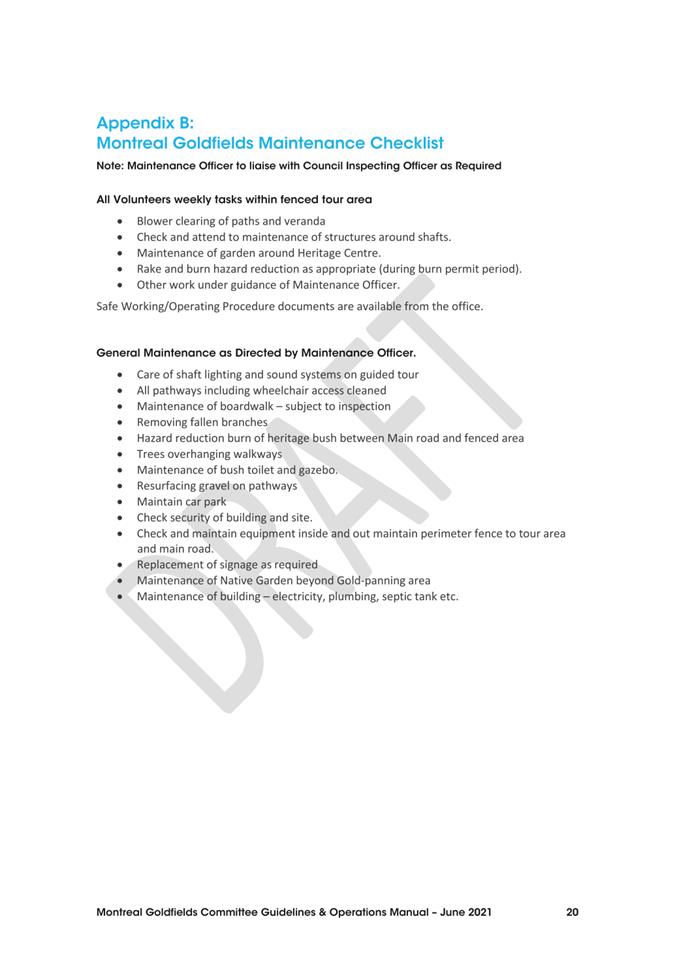




|
11 January 2022 |
|
|
Item 3.7 - Attachment 5 |
Bega Valley Shire Awards Committee Guidelines 2022-25 |




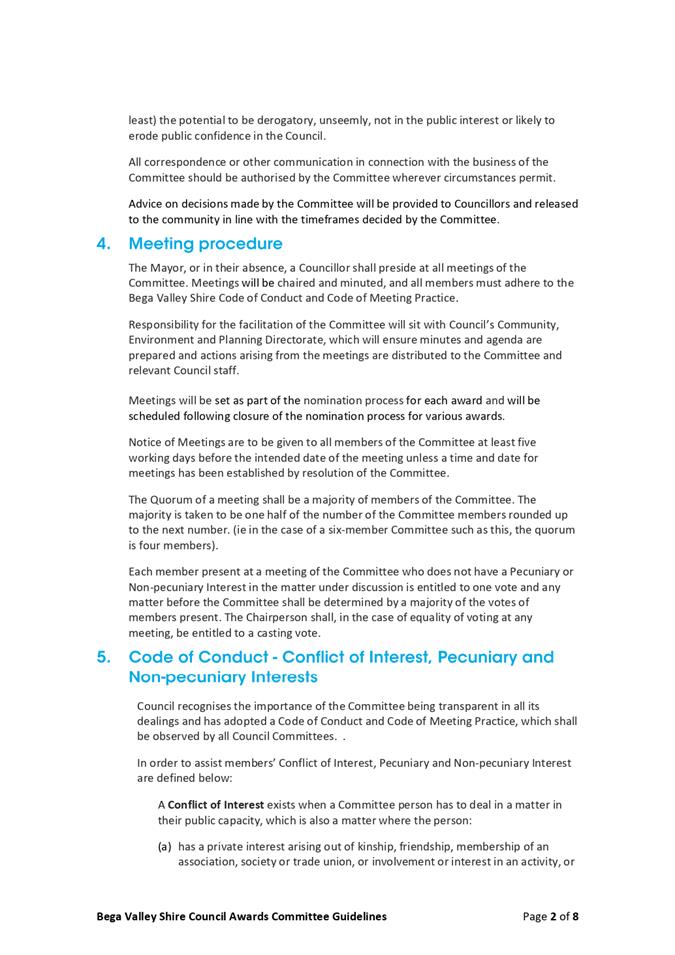

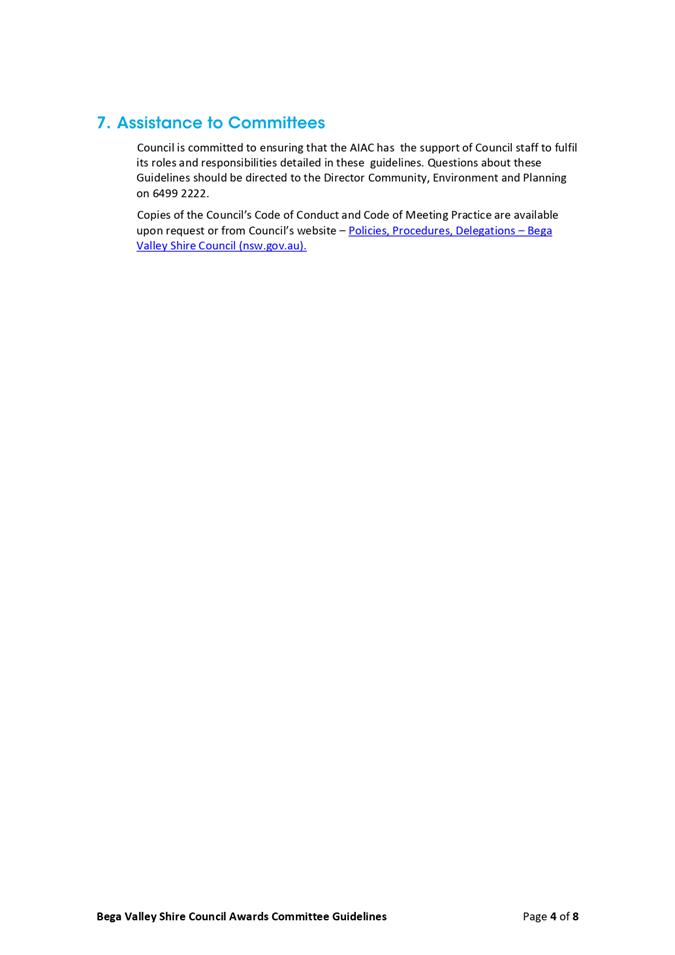
|
11 January 2022 |
|
|
Item 3.7 - Attachment 6 |
Bega Valley Shire Grants Committee Guidelines 2022-25 |
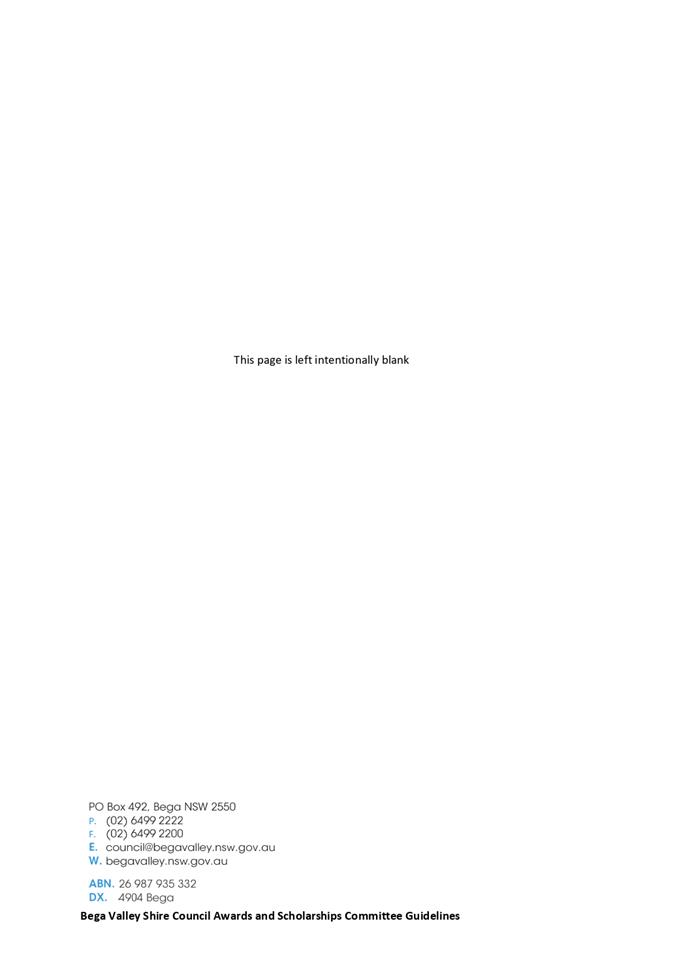

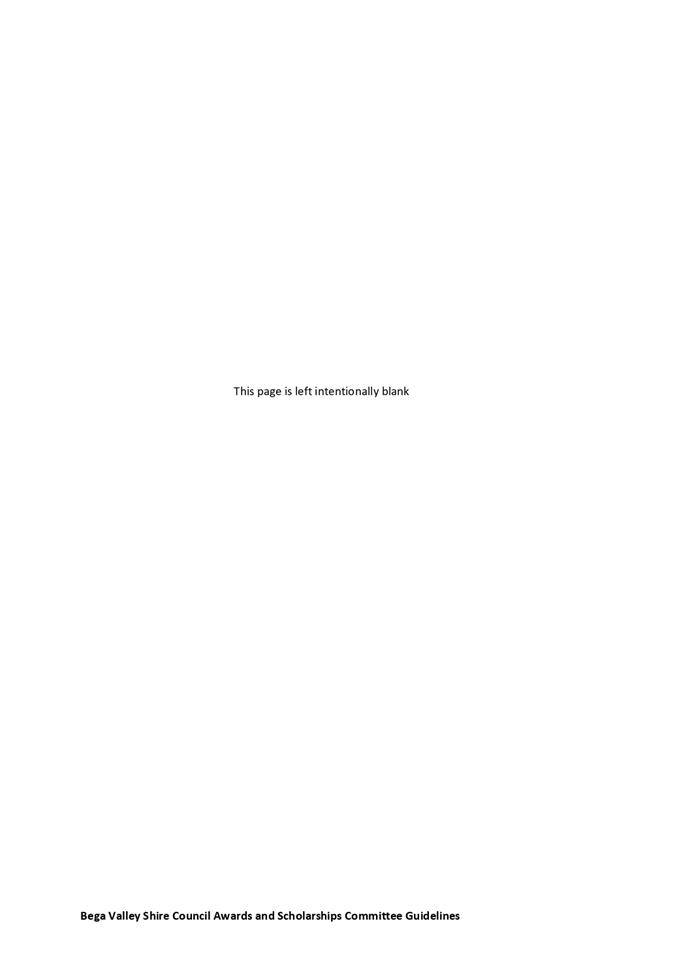

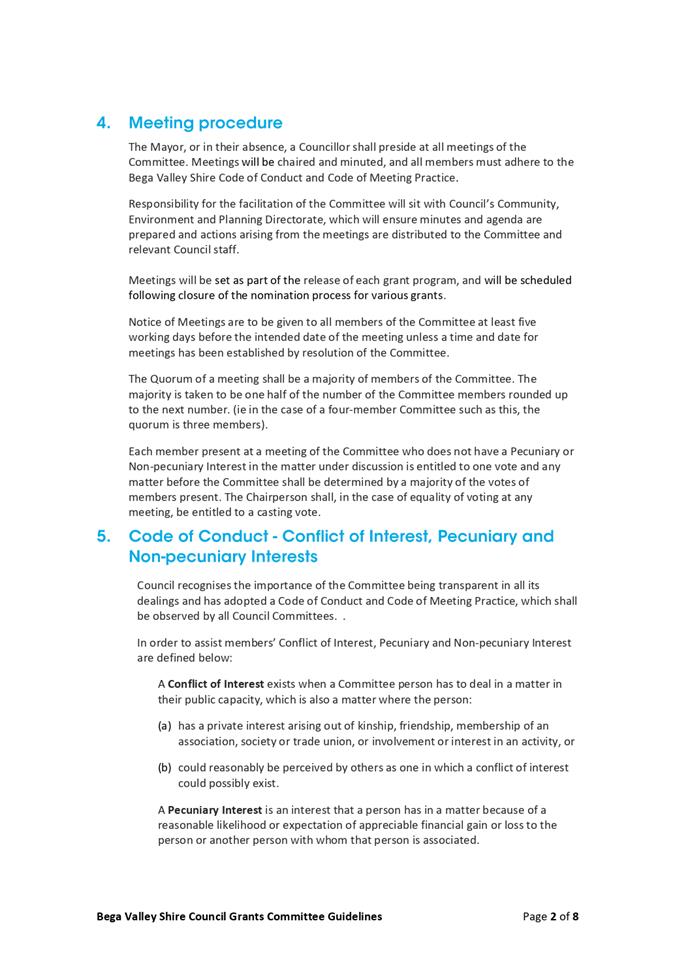

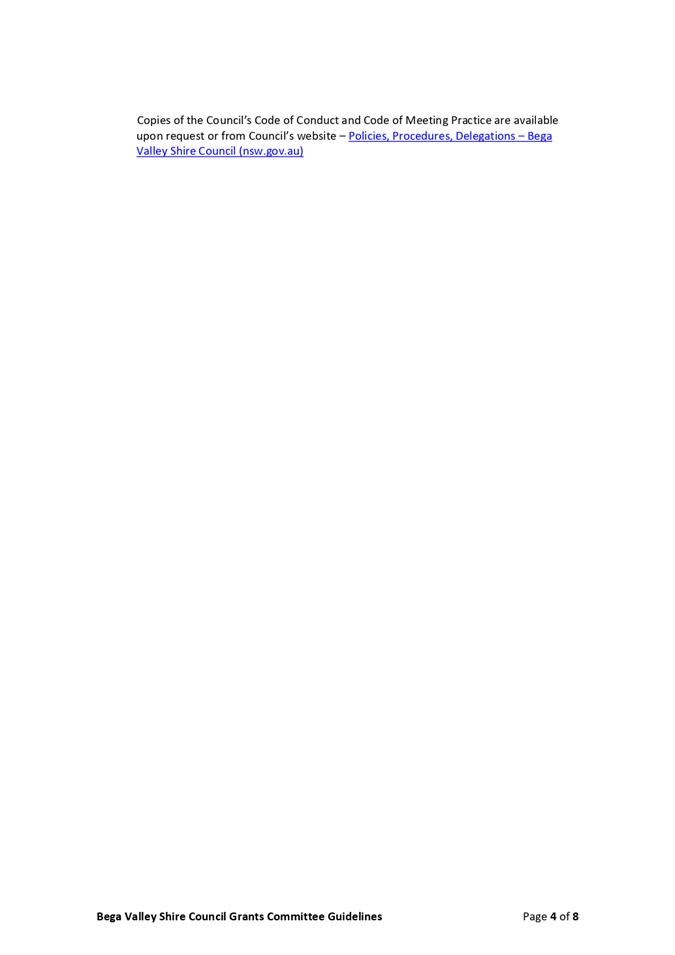
|
11 January 2022 |
|
|
Item 3.7 - Attachment 7 |
Audit, Risk and Improvement Committee Charter |


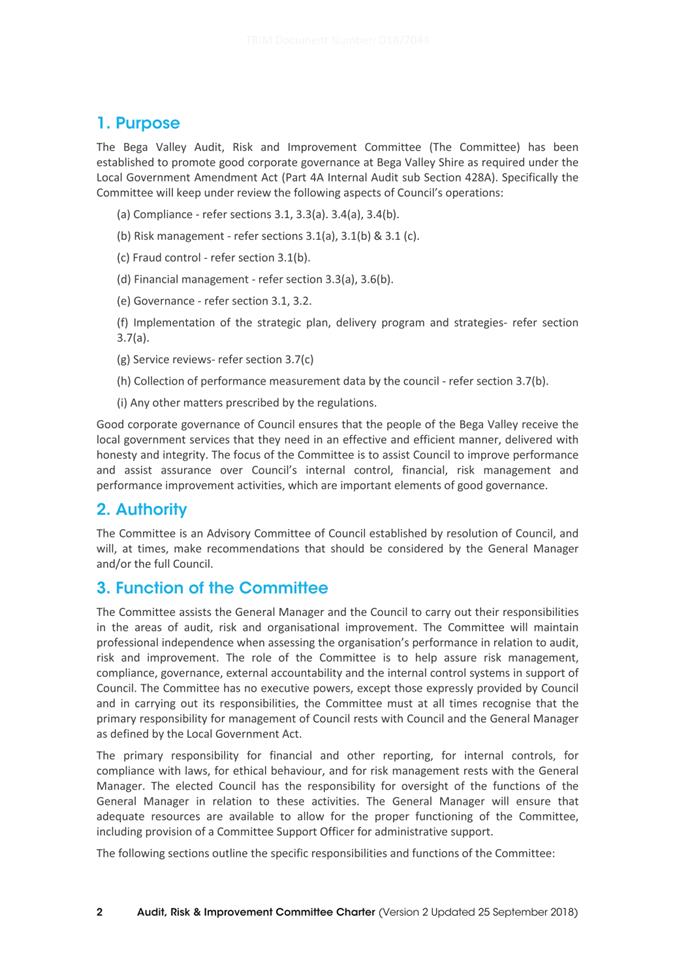

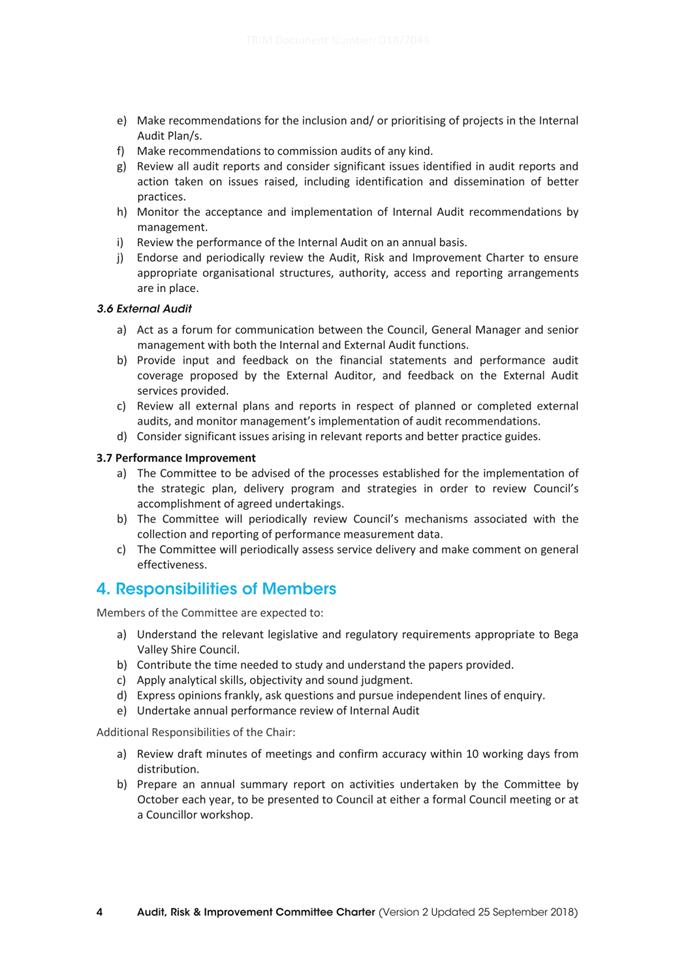

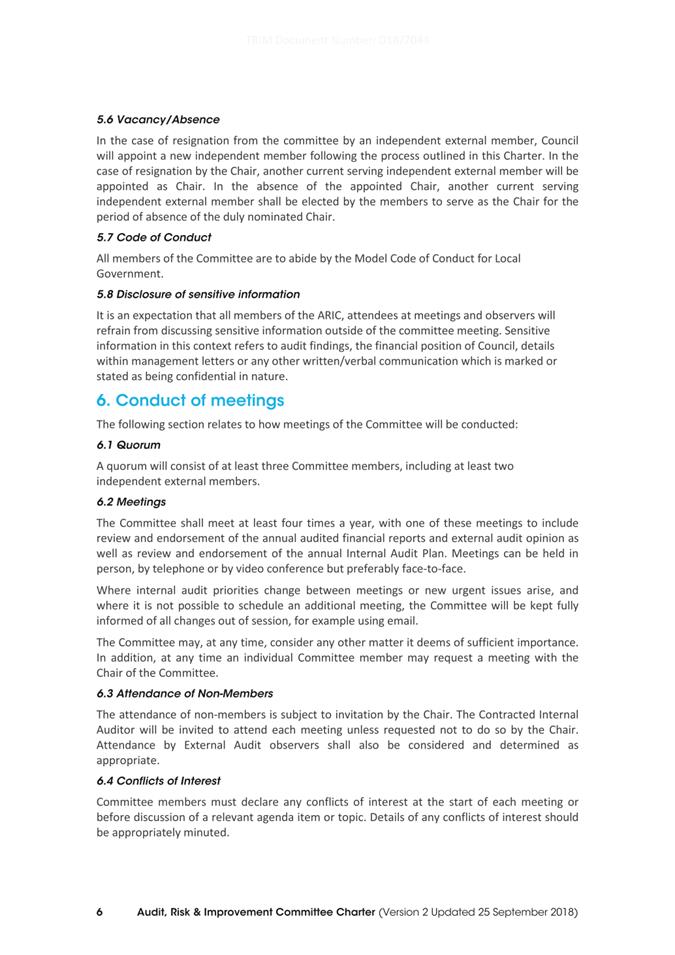

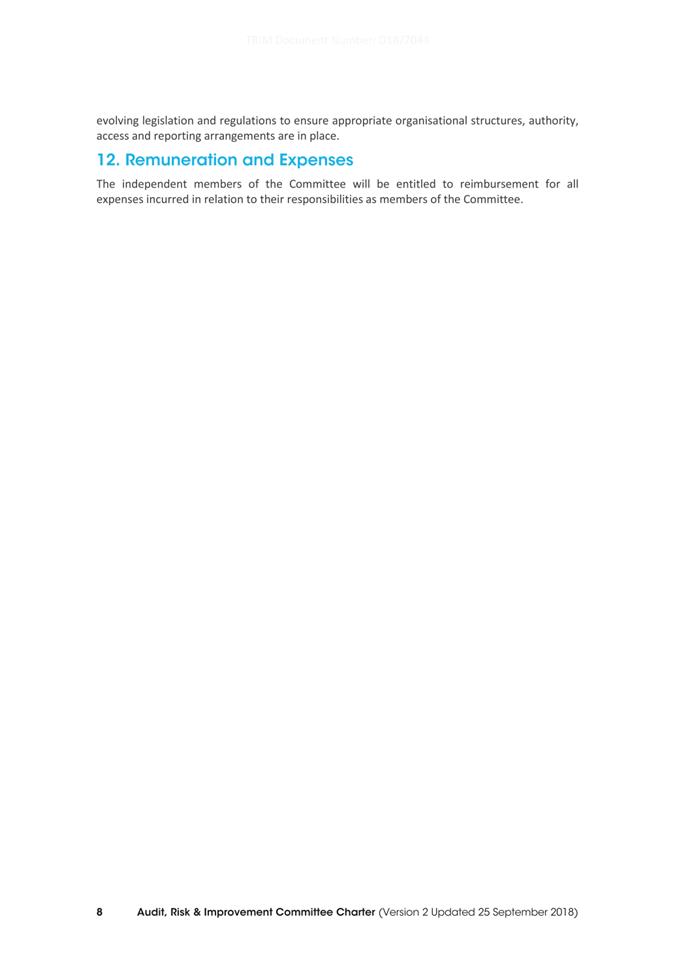
|
11 January 2022 |
|
|
Item 3.7 - Attachment 8 |
Bega Valley Community Disaster Relief Fund Charter |



|
11 January 2022 |
|
|
Item 3.7 - Attachment 9 |
Access and Inclusion Advisory Committee Guidelines 2022-25 |



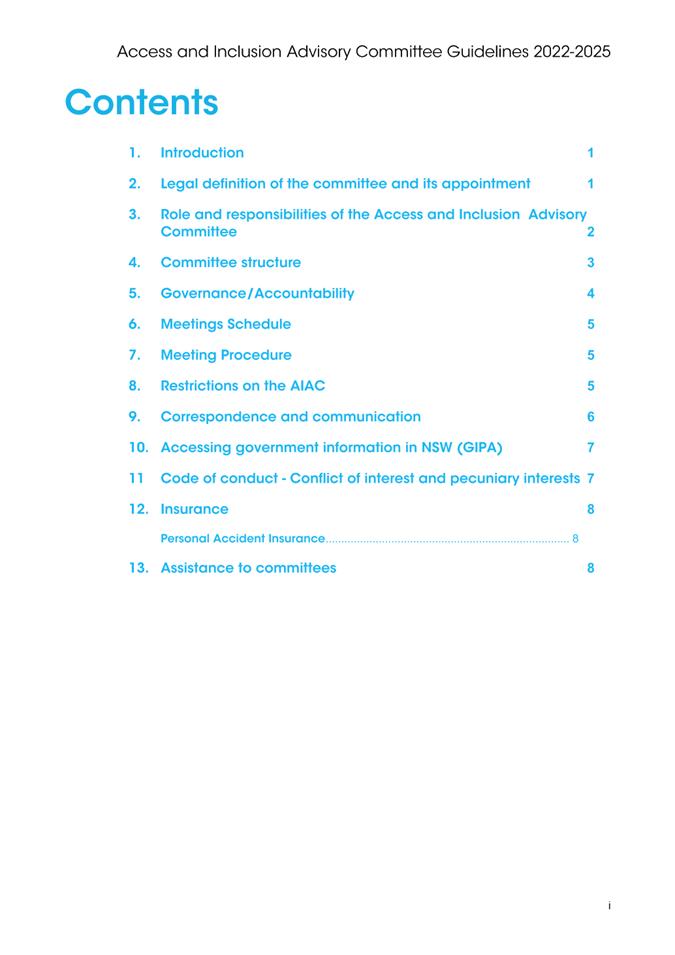

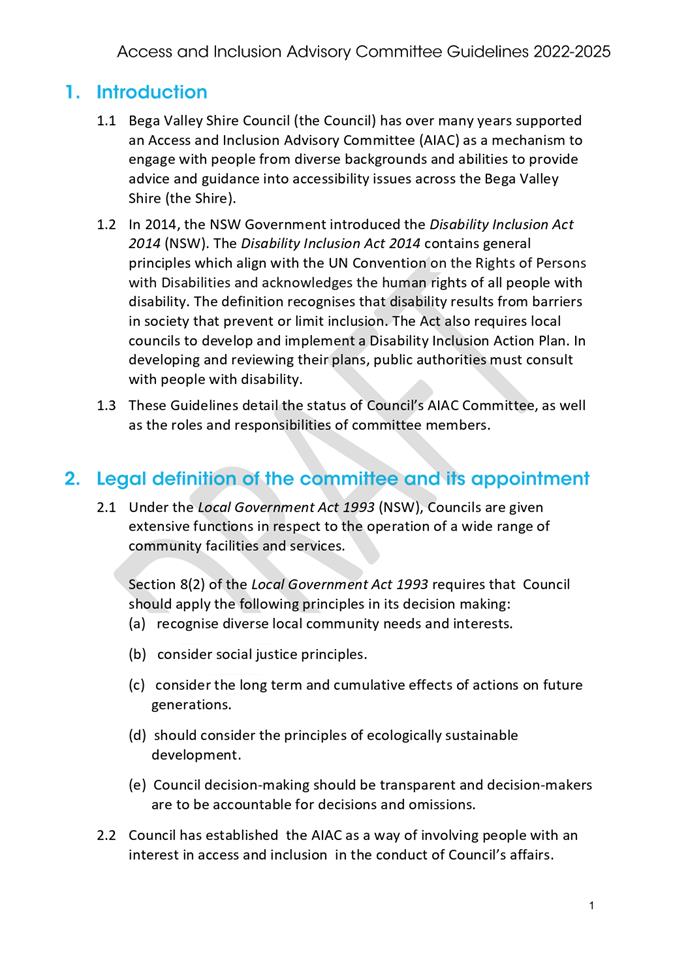
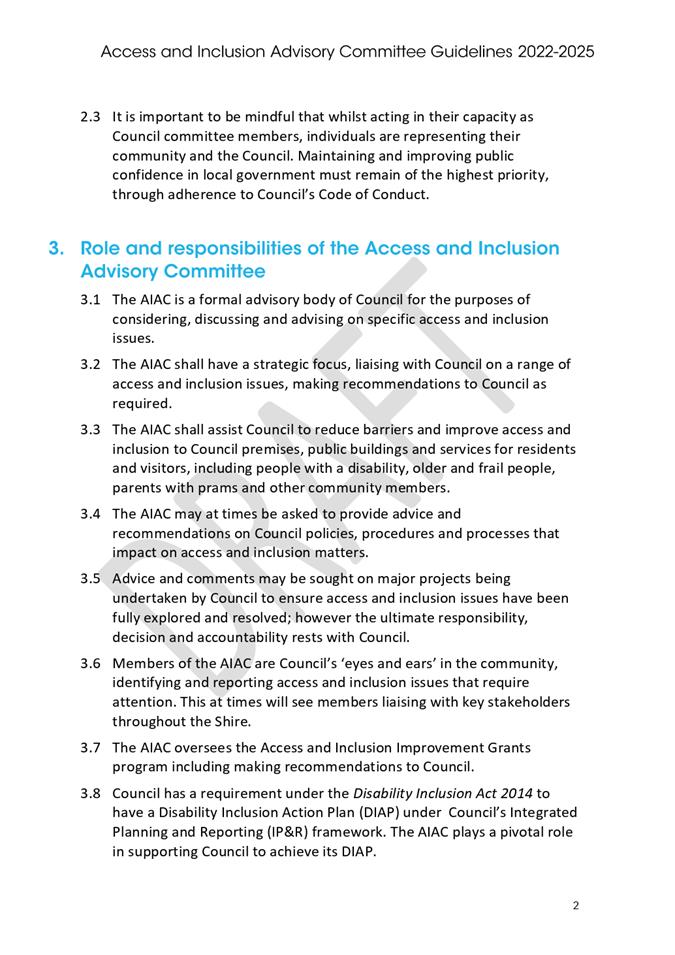
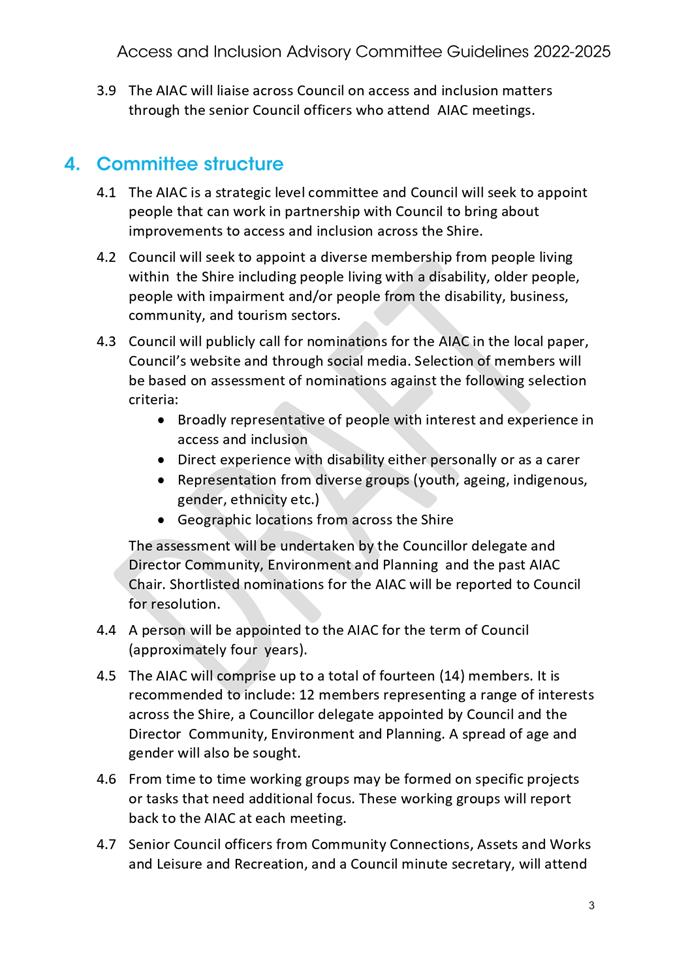
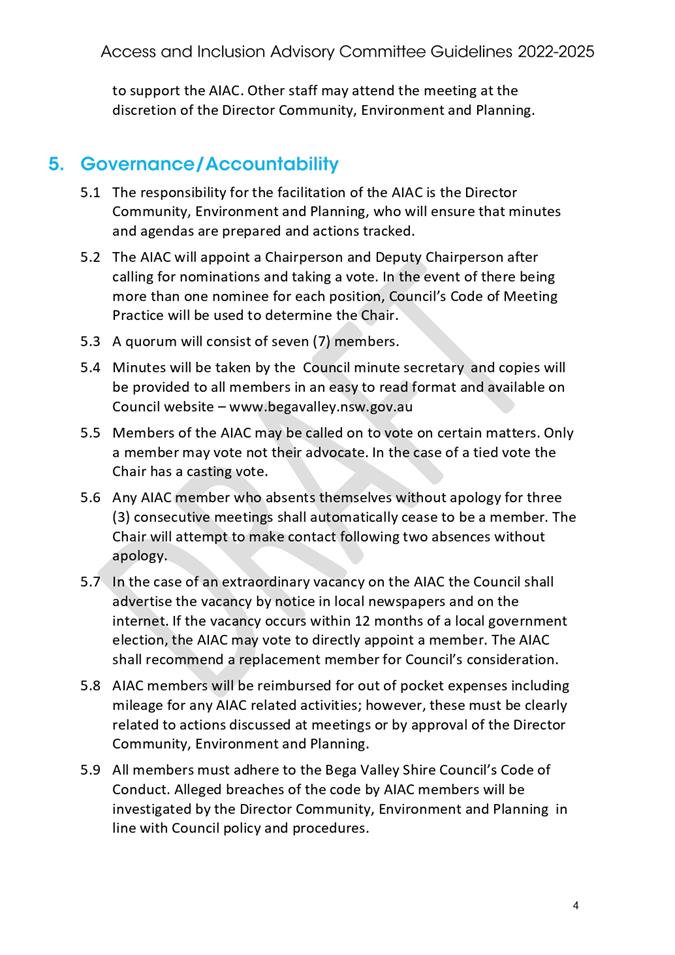
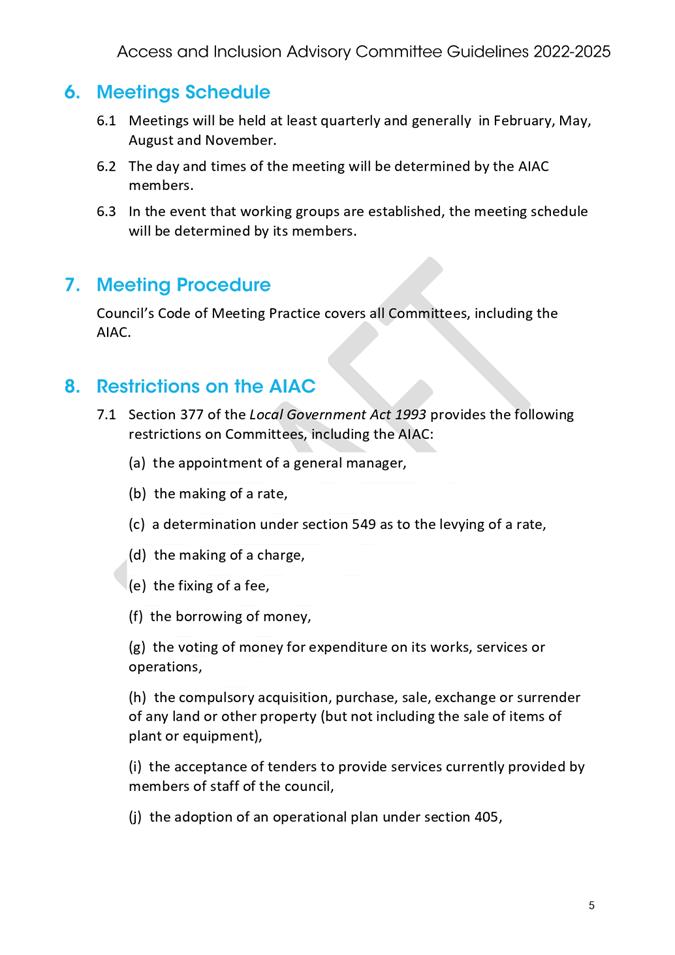
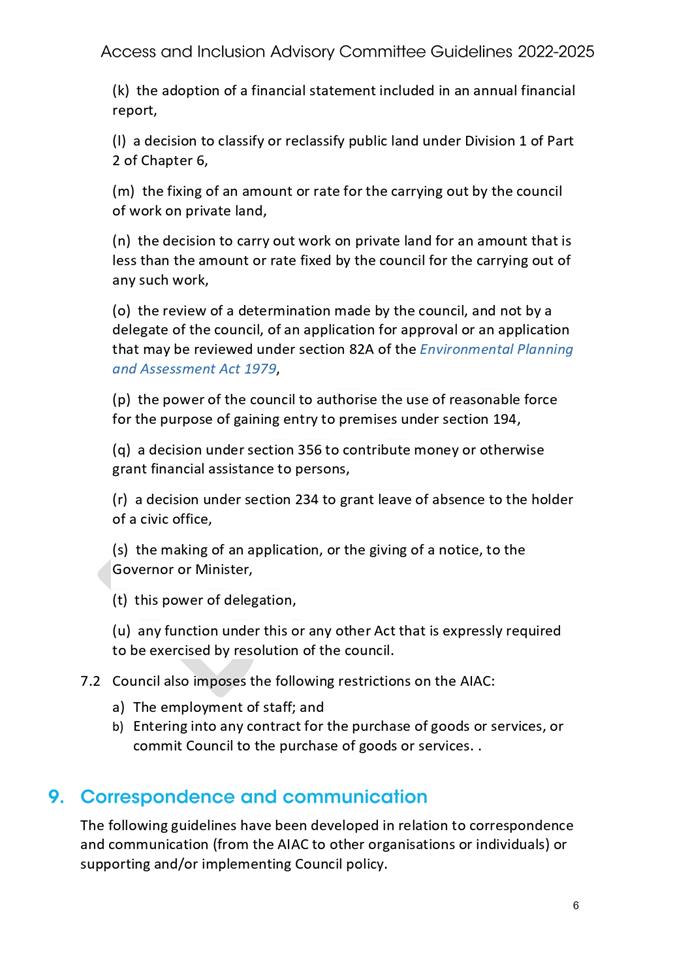
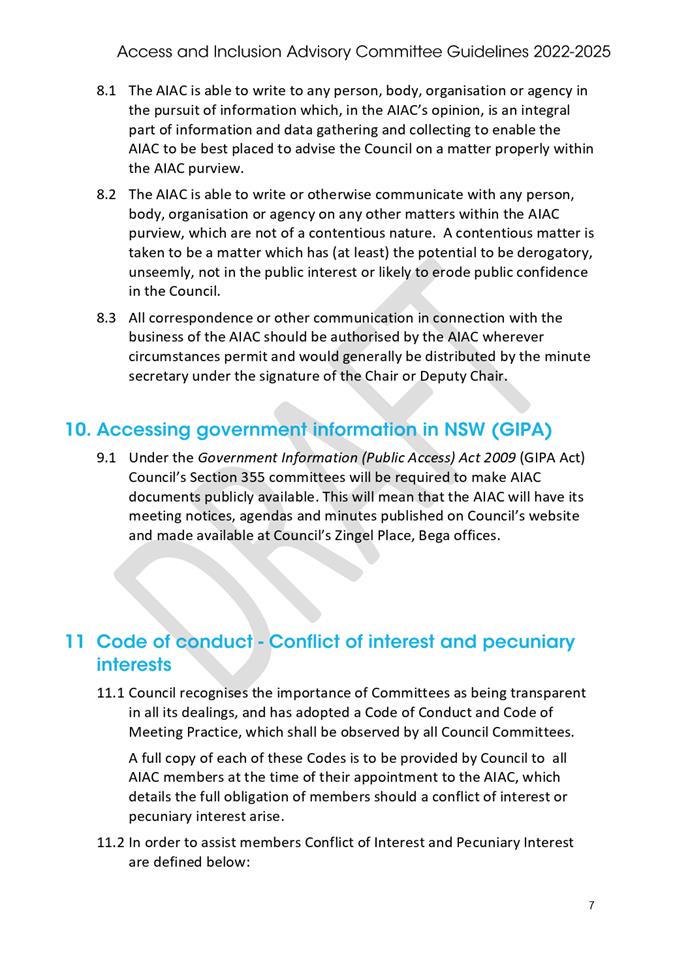
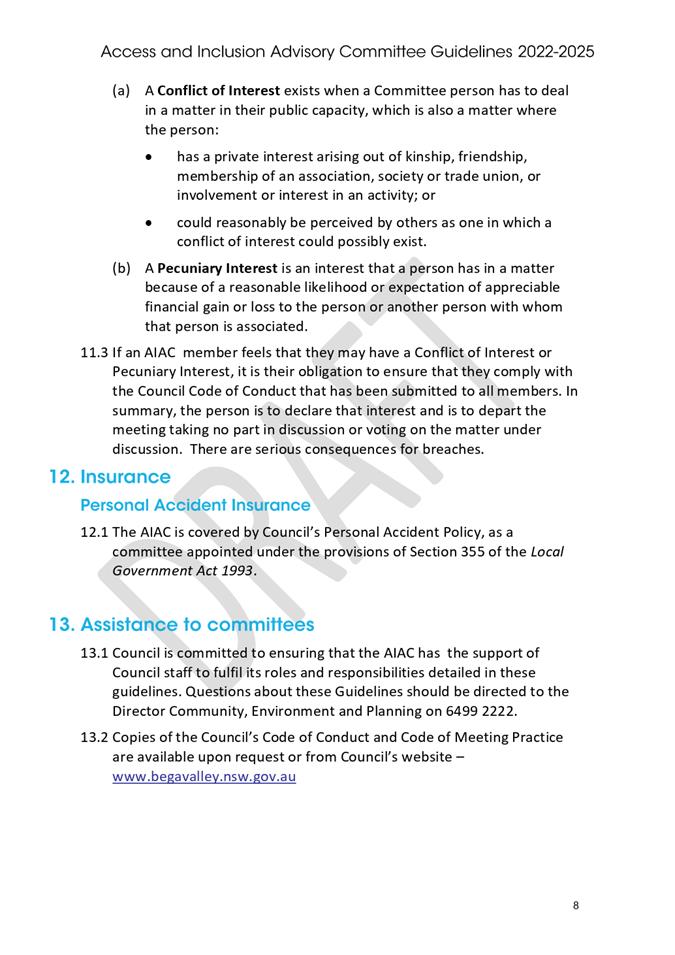
|
11 January 2022 |
|
|
Item 3.7 - Attachment 10 |
Bega, Eden, Merrimans Aboriginal Liaison Committee Guidelines 2022-25 |

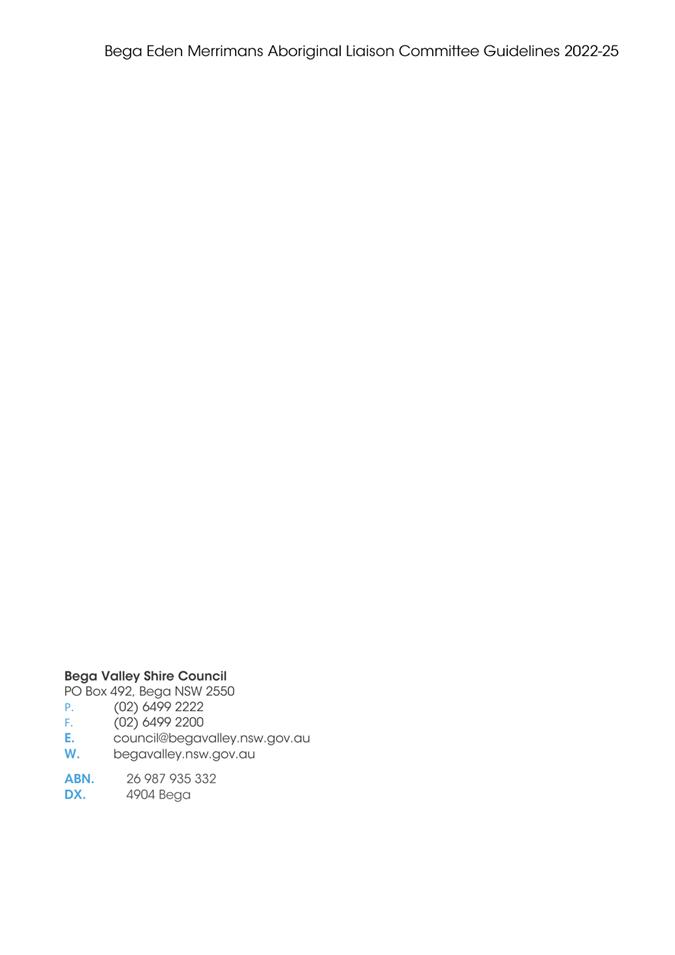

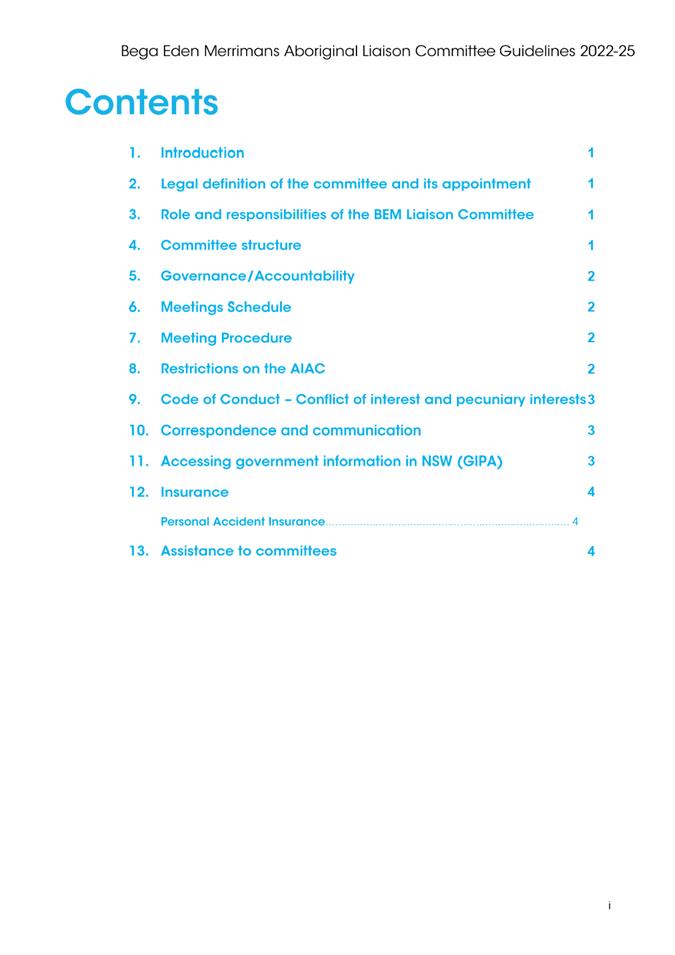

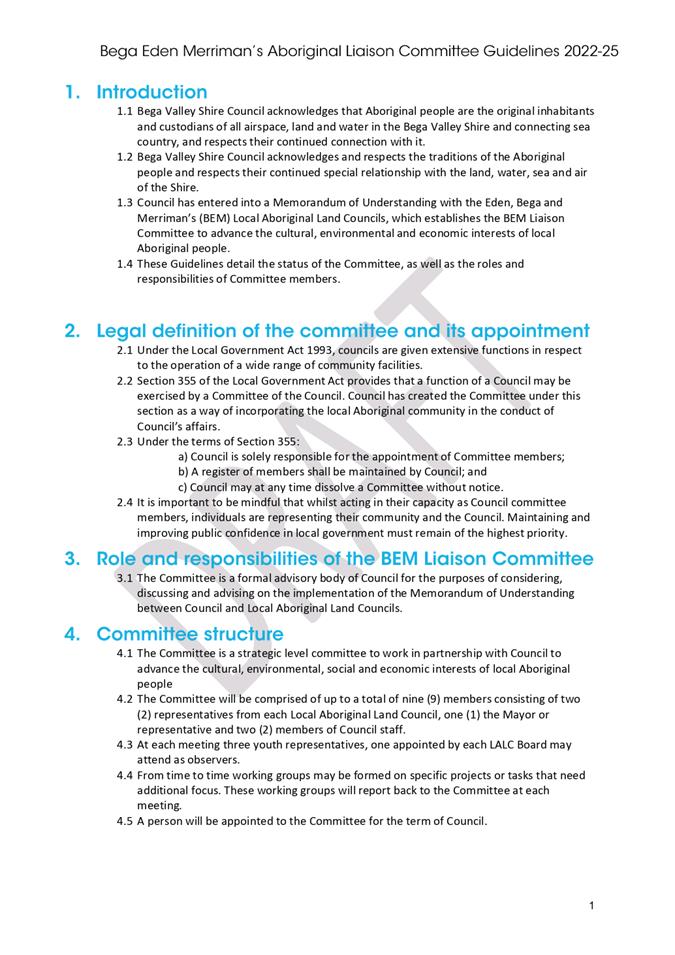
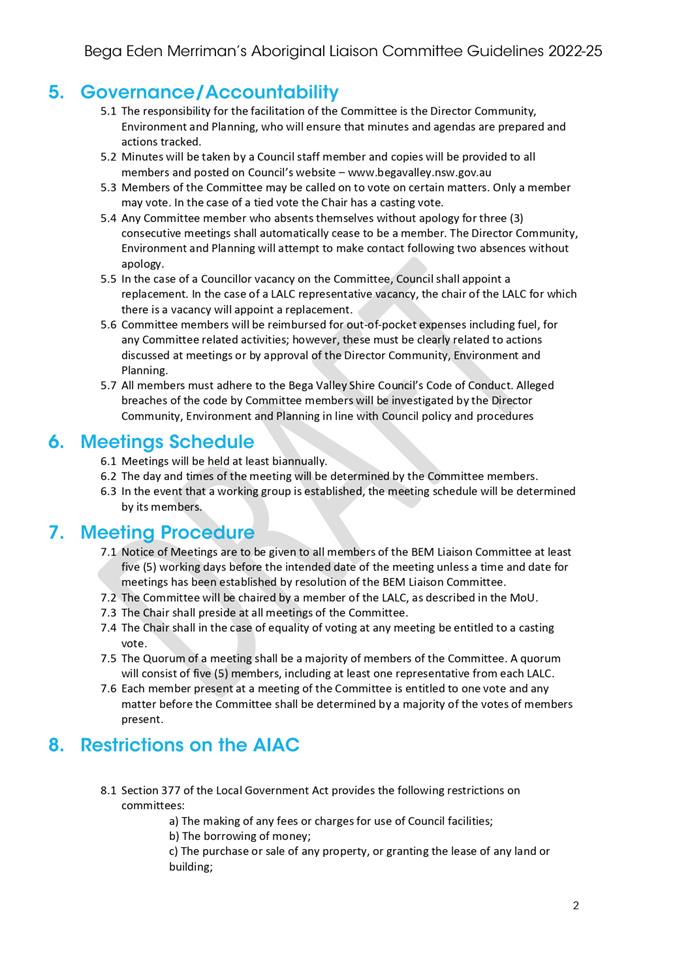
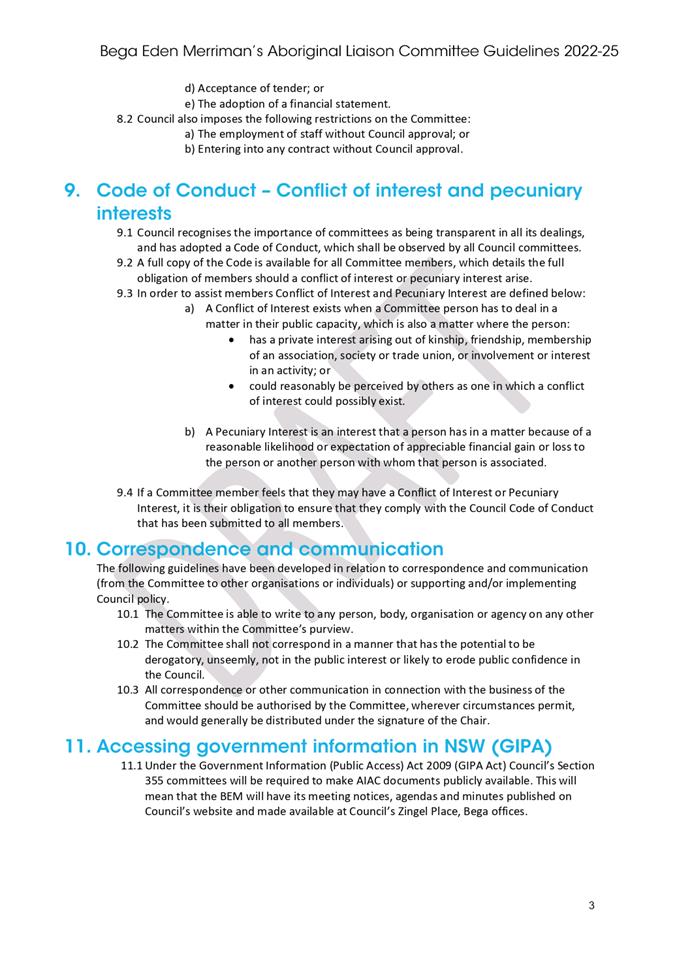
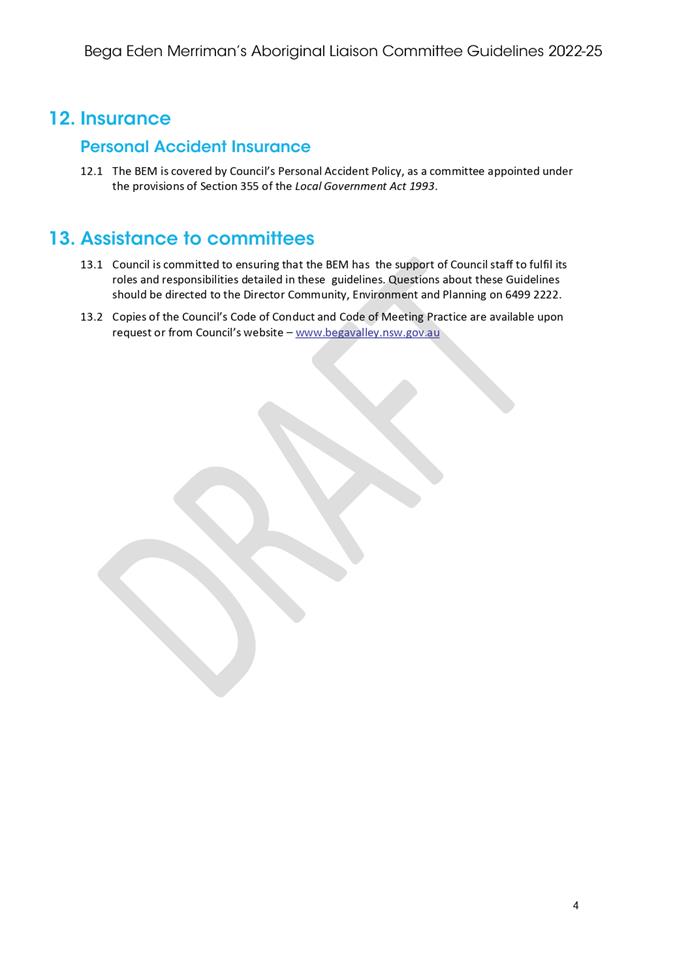
|
11 January 2022 |
|
|
Item 3.7 - Attachment 11 |
Central Waste Facility Consultative Committee Guidelines 2022-25 |
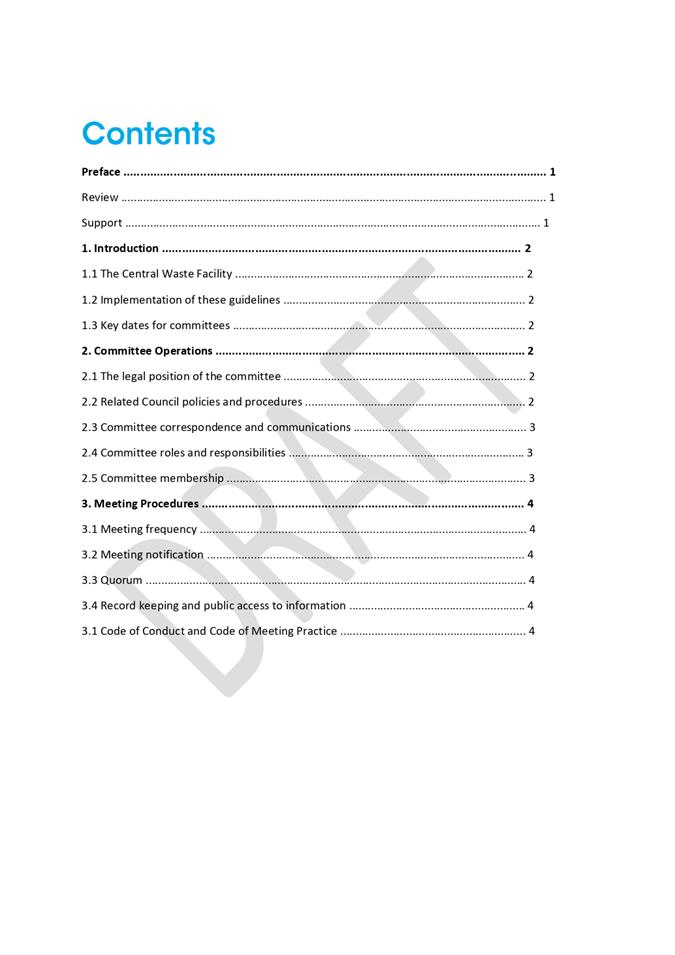
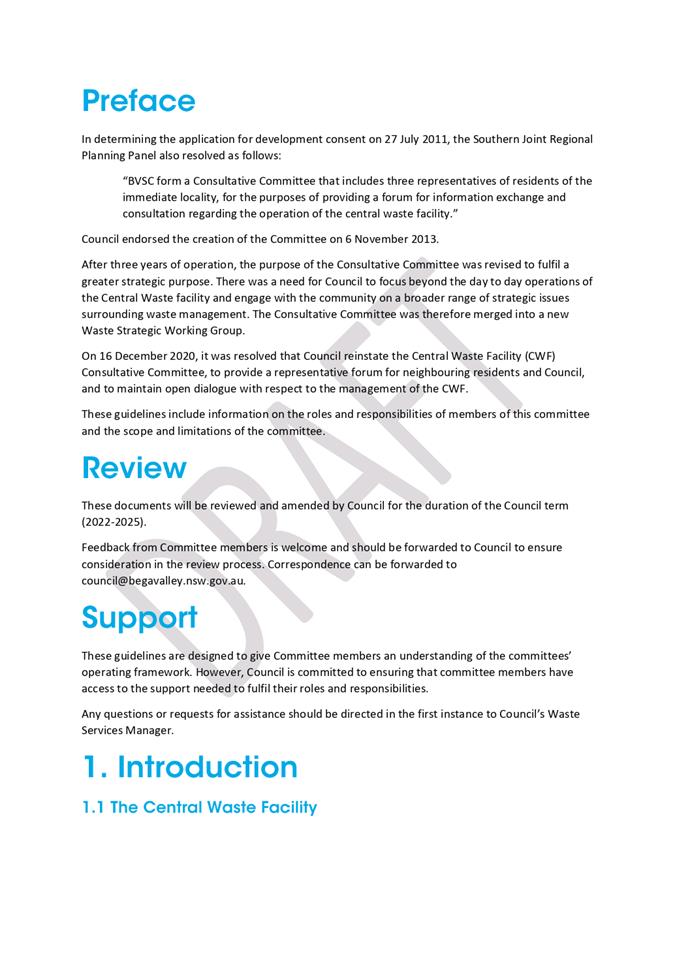
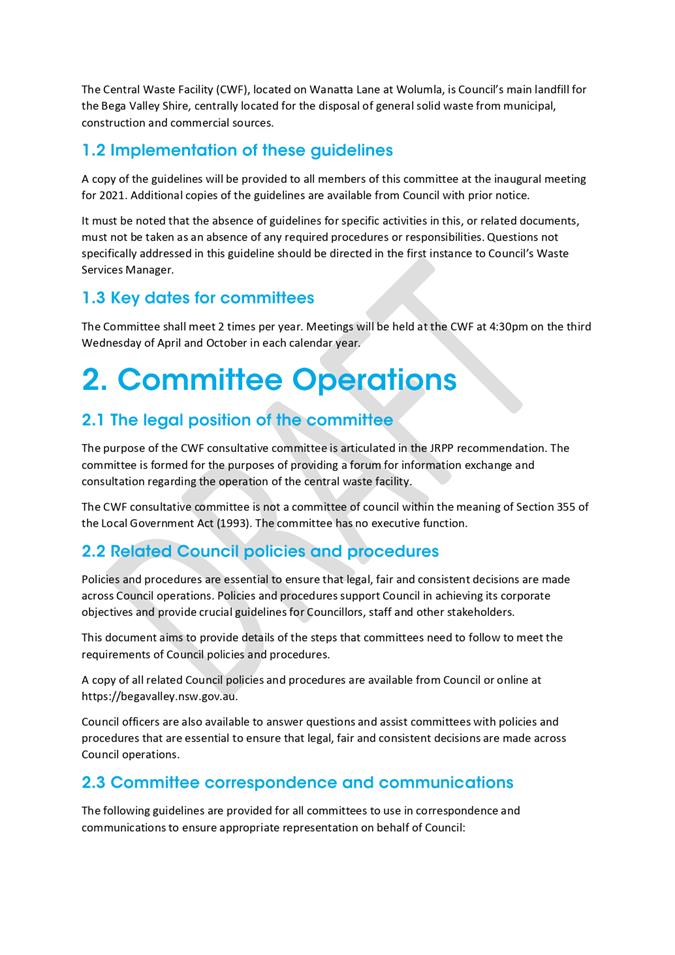
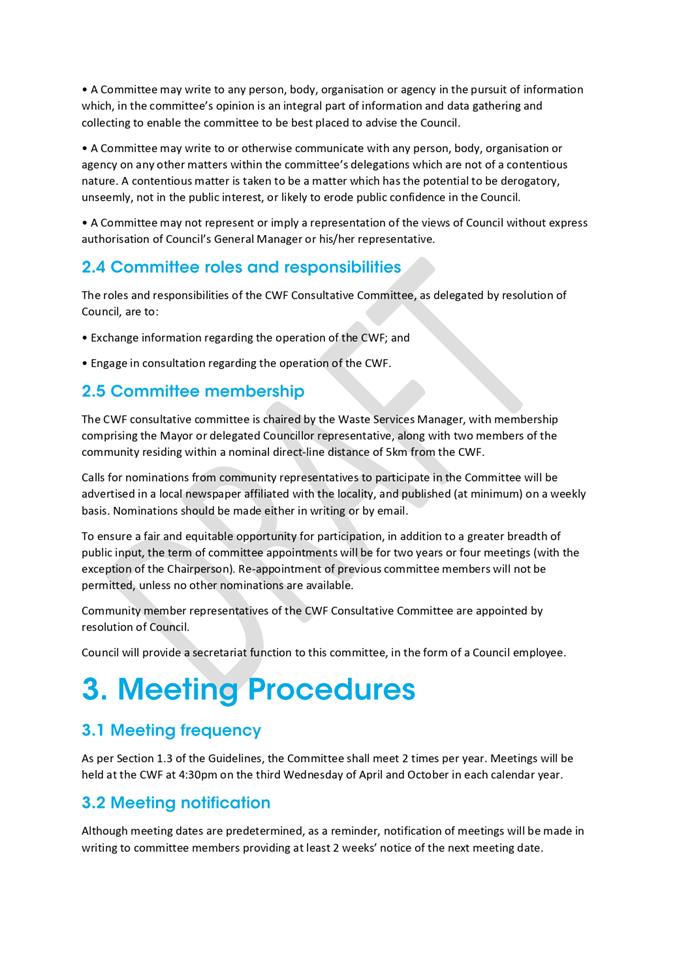
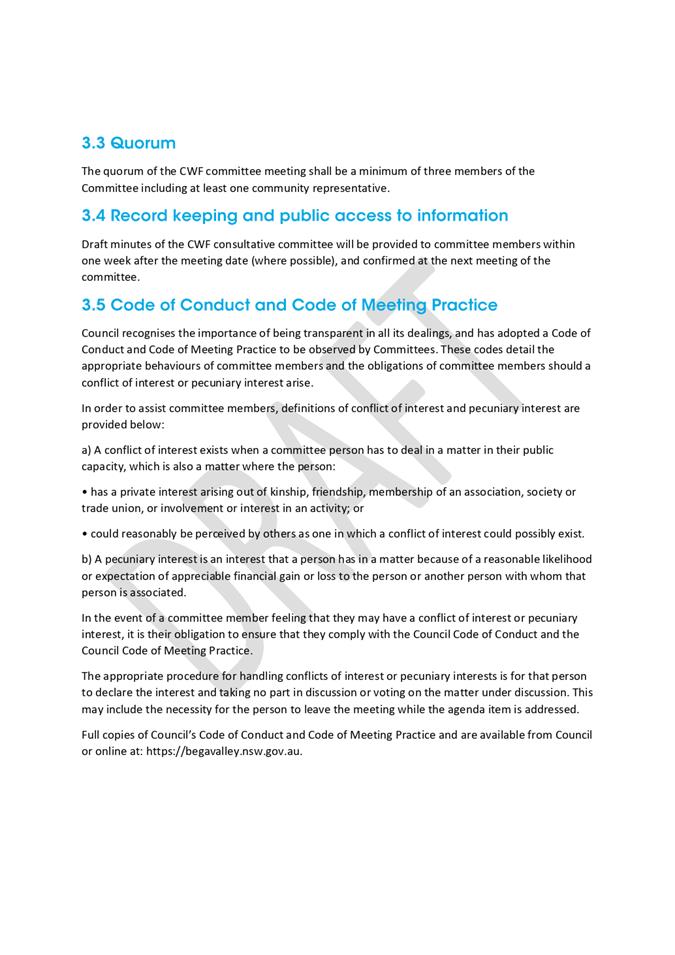
|
11 January 2022 |
|
|
Item 3.7 - Attachment 12 |
Coast and Flood Management Committee Guidelines 2022-25 |

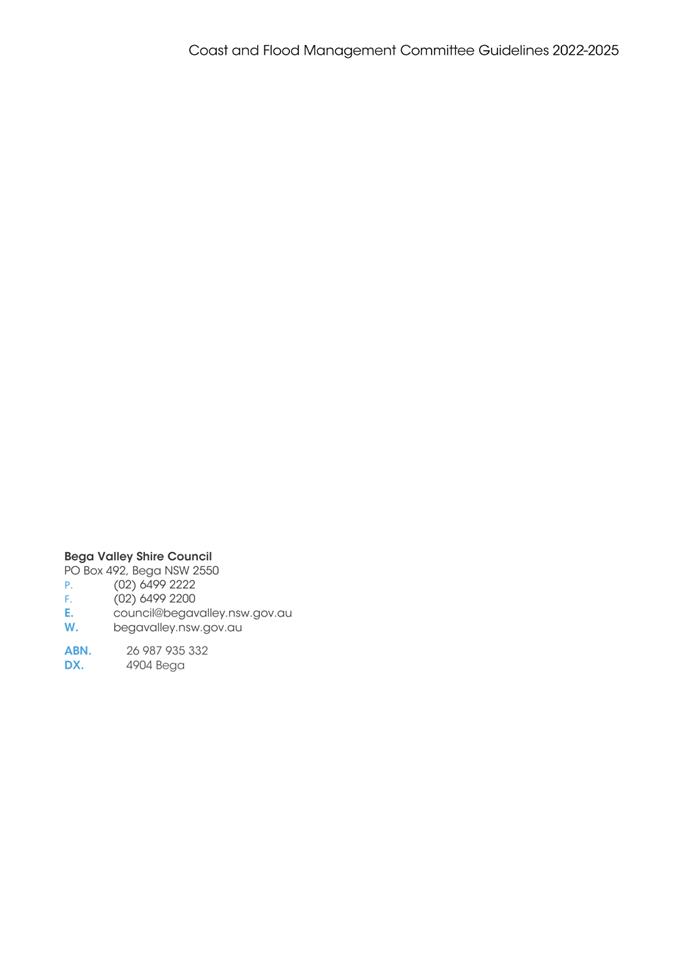

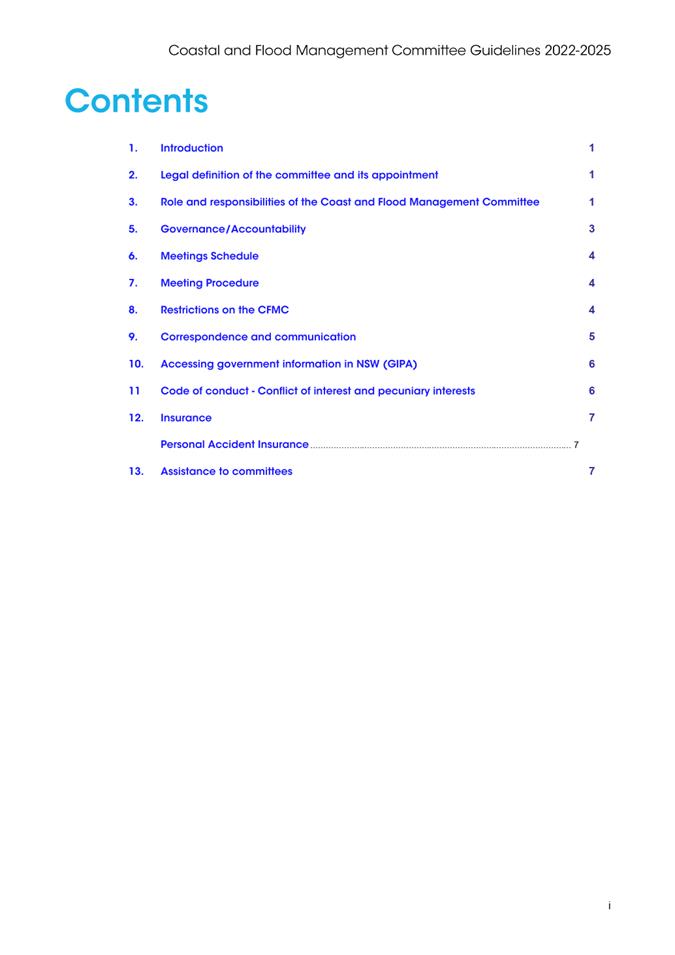

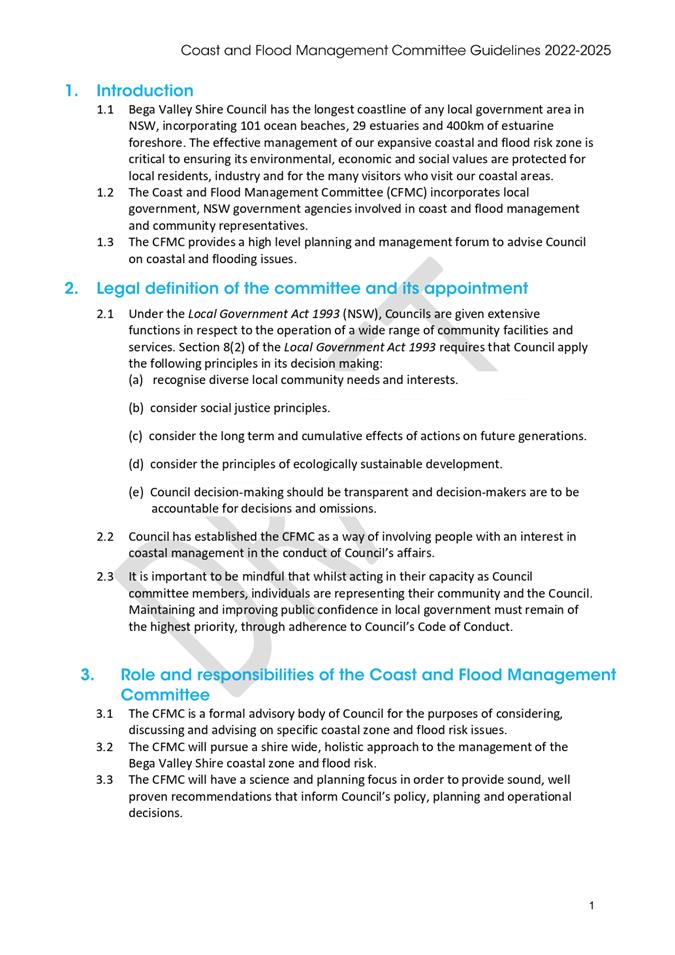
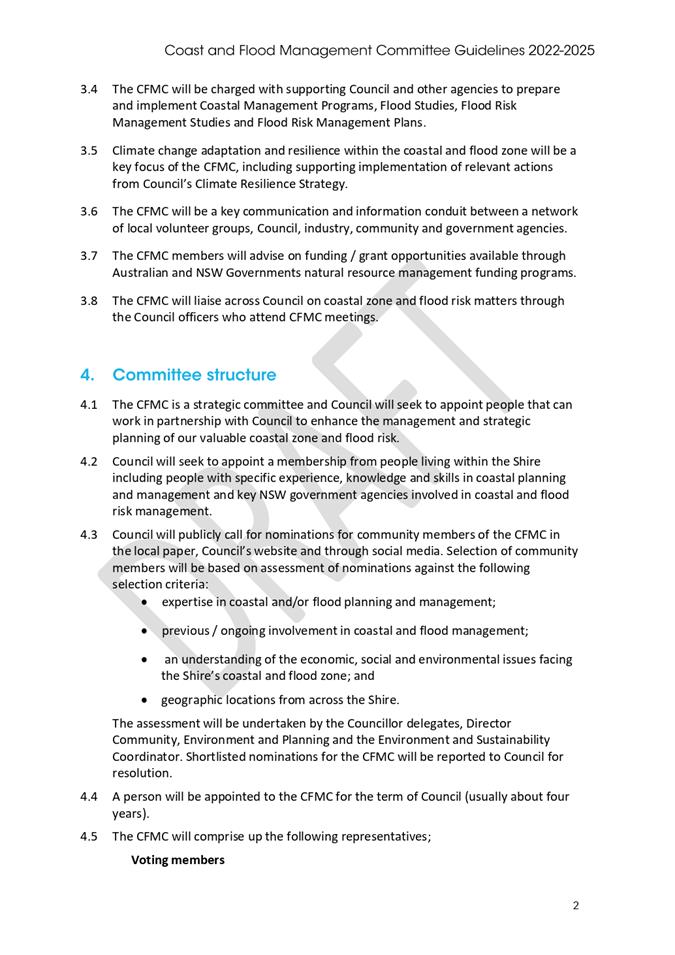
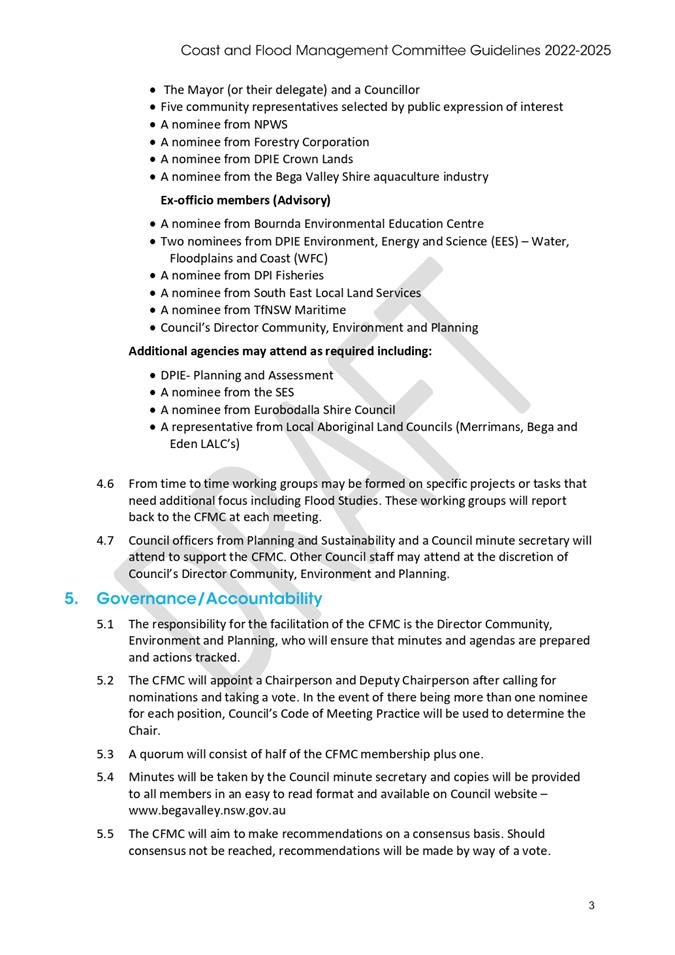
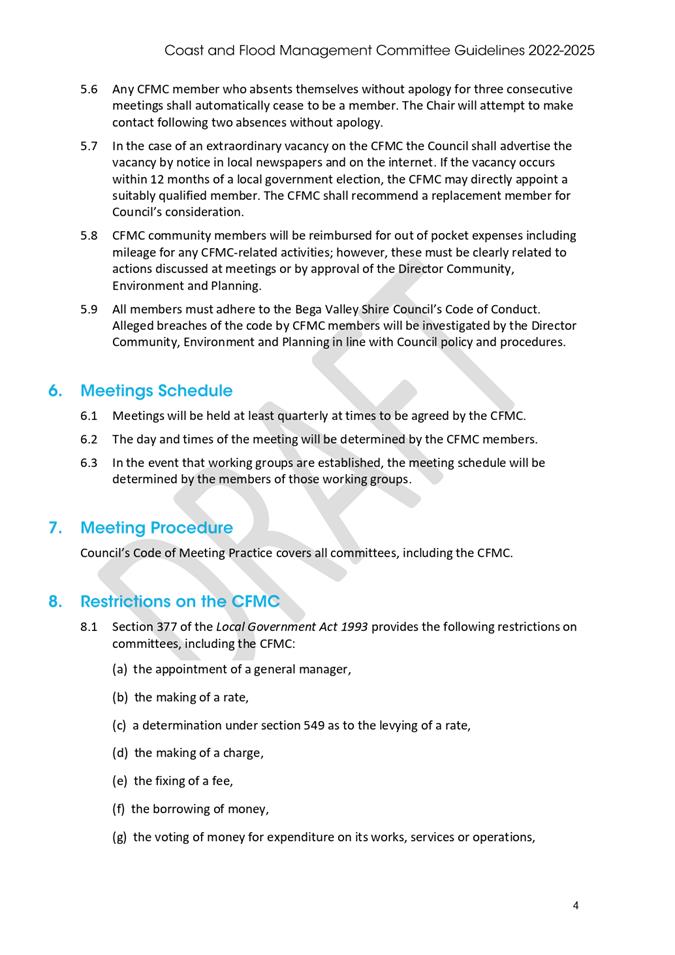
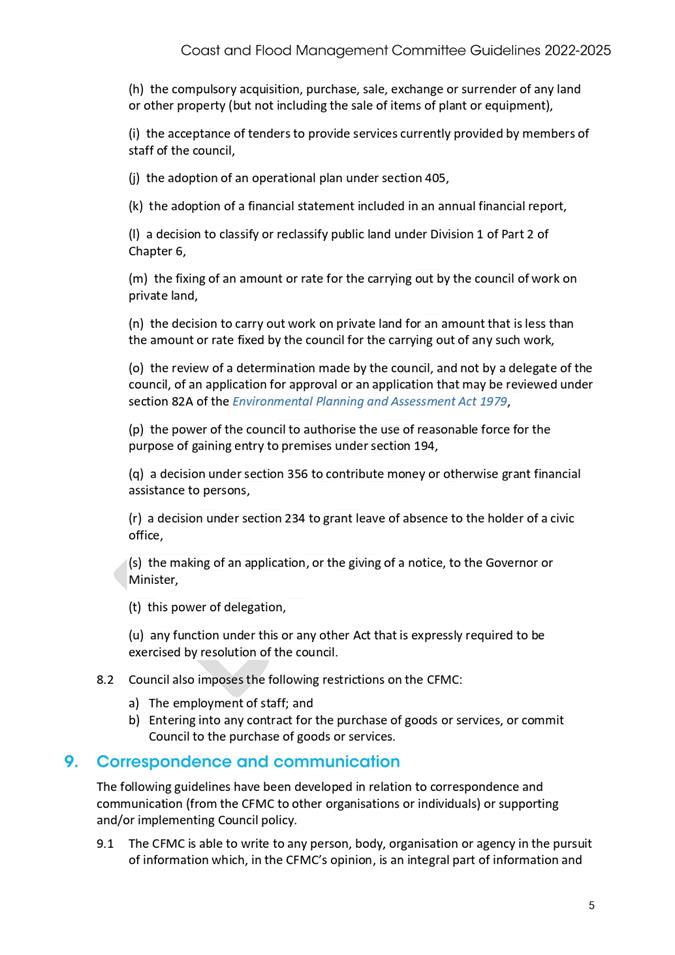
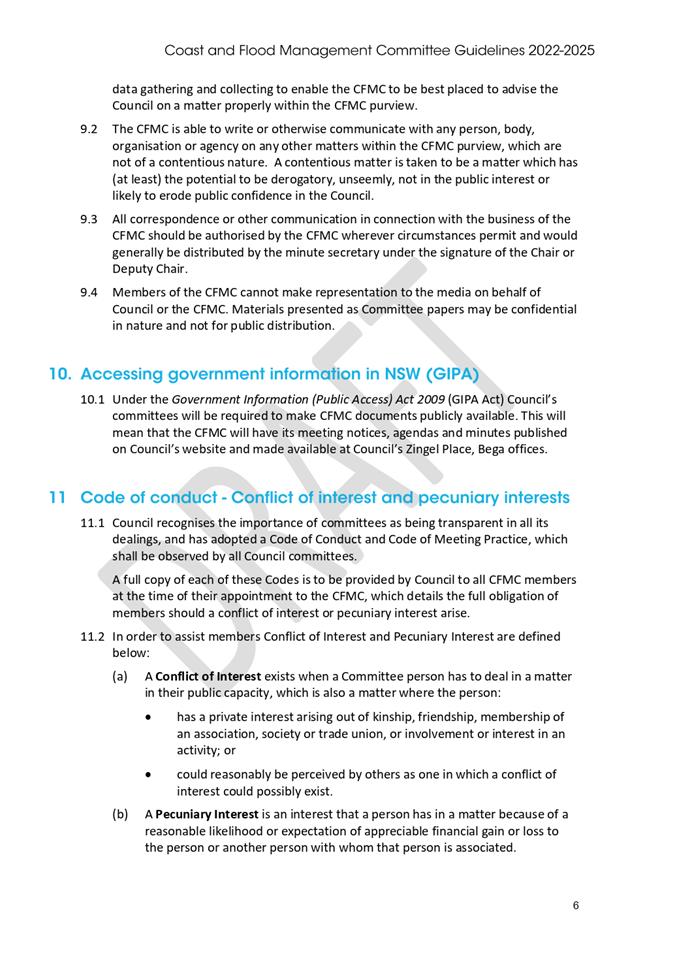
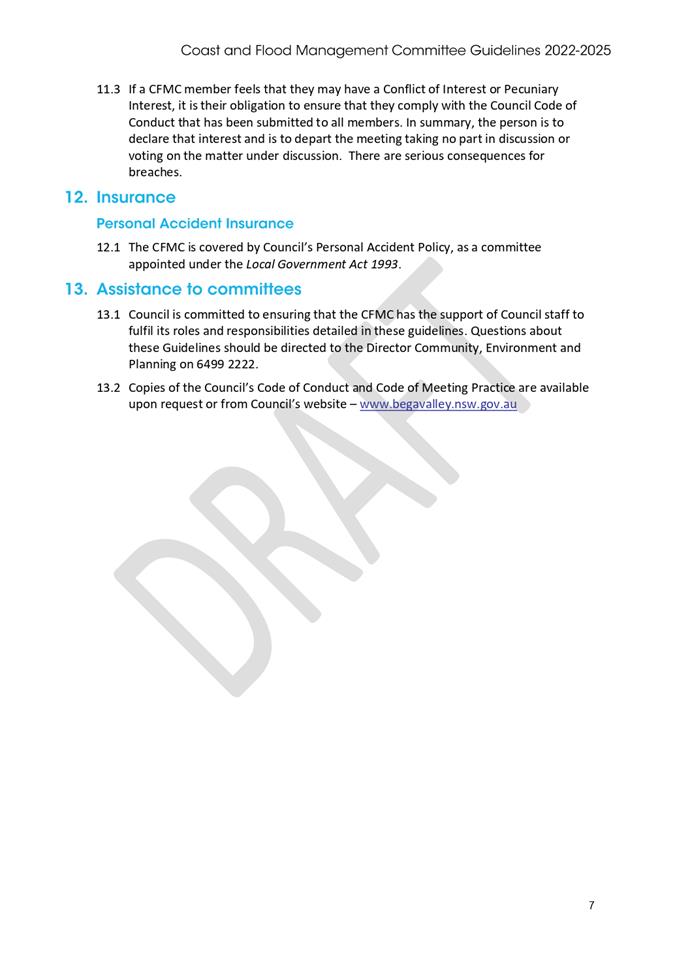
|
11 January 2022 |
|
|
Item 3.7 - Attachment 13 |
Police Liaison Committee Guidelines 2022-25 |

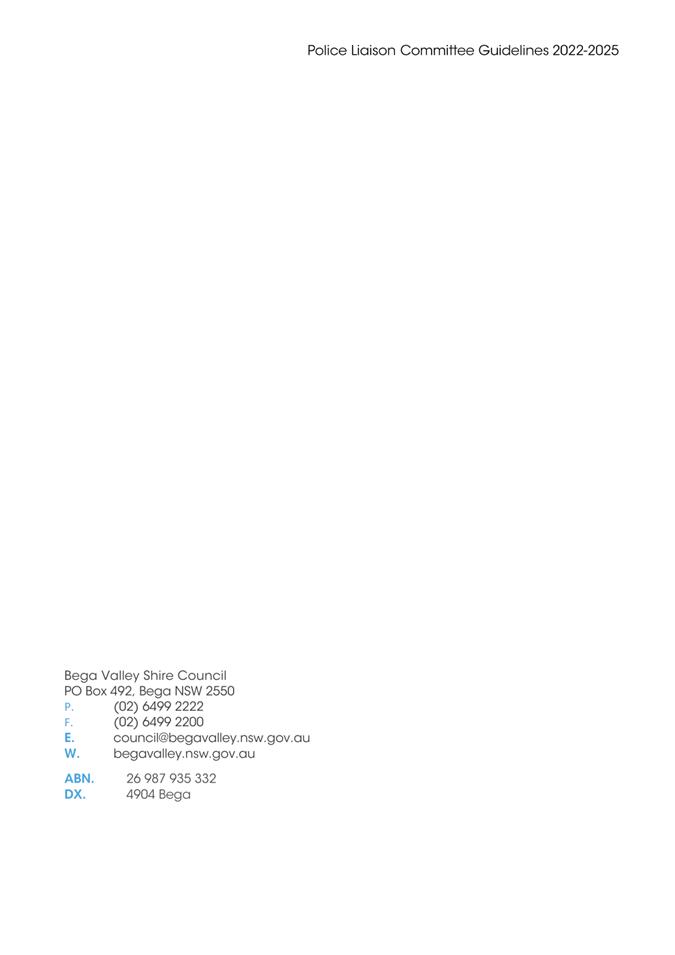

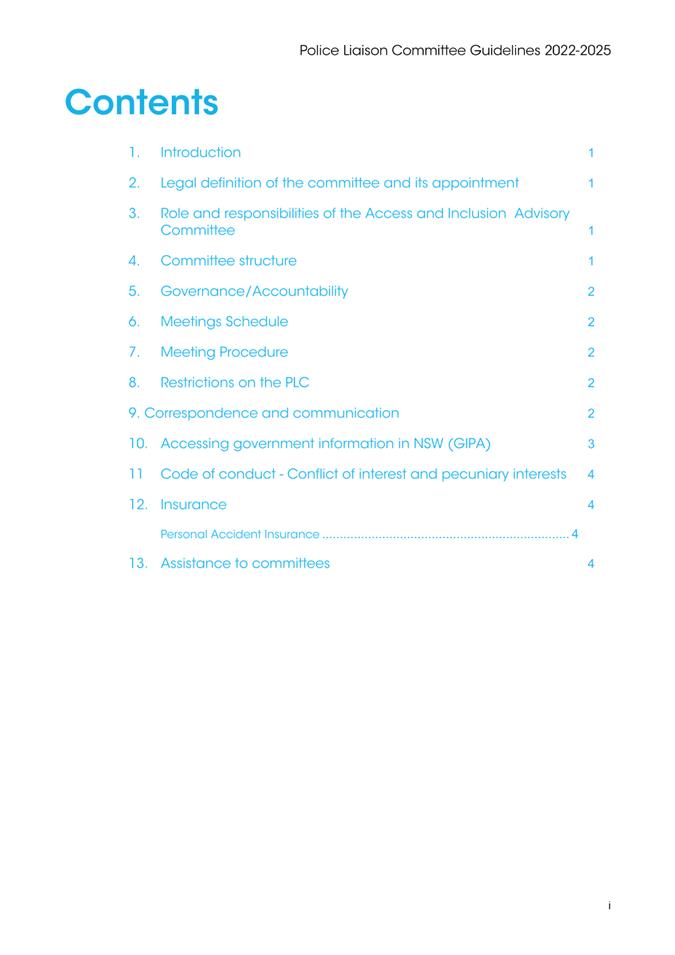

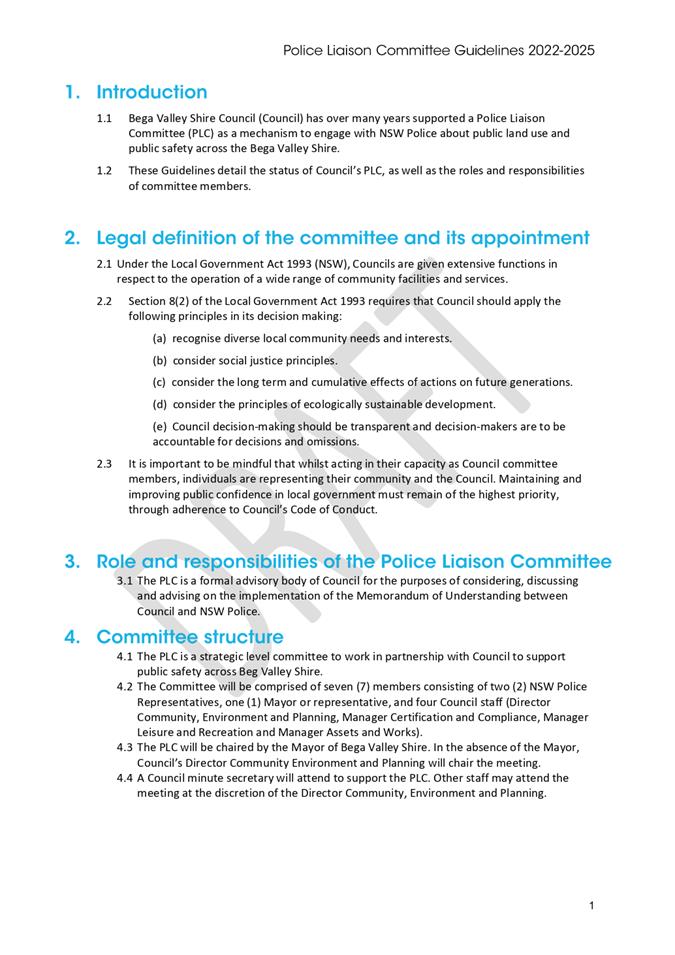
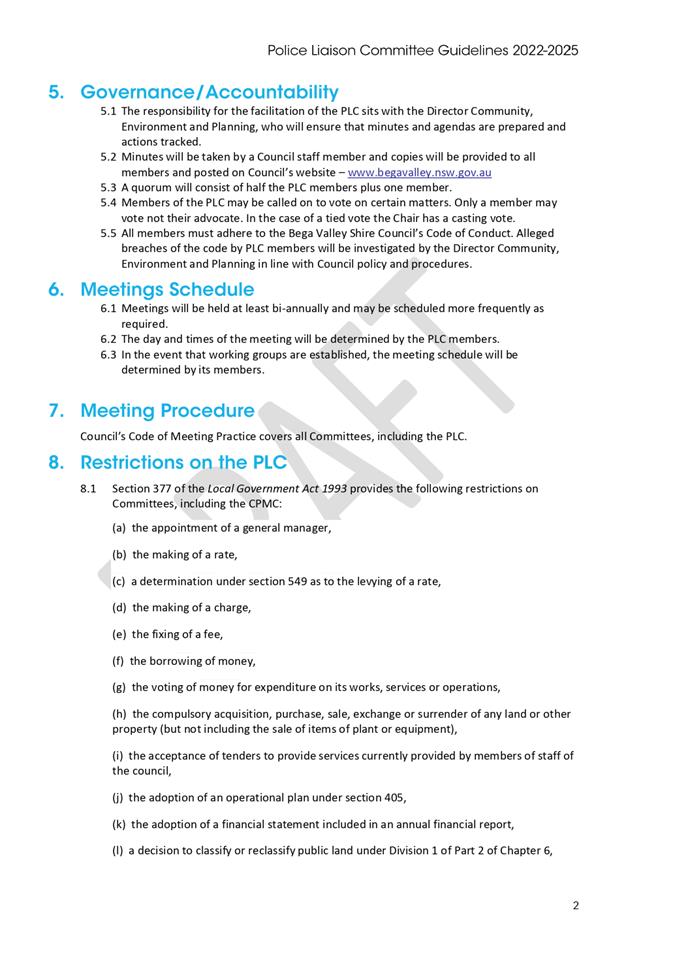
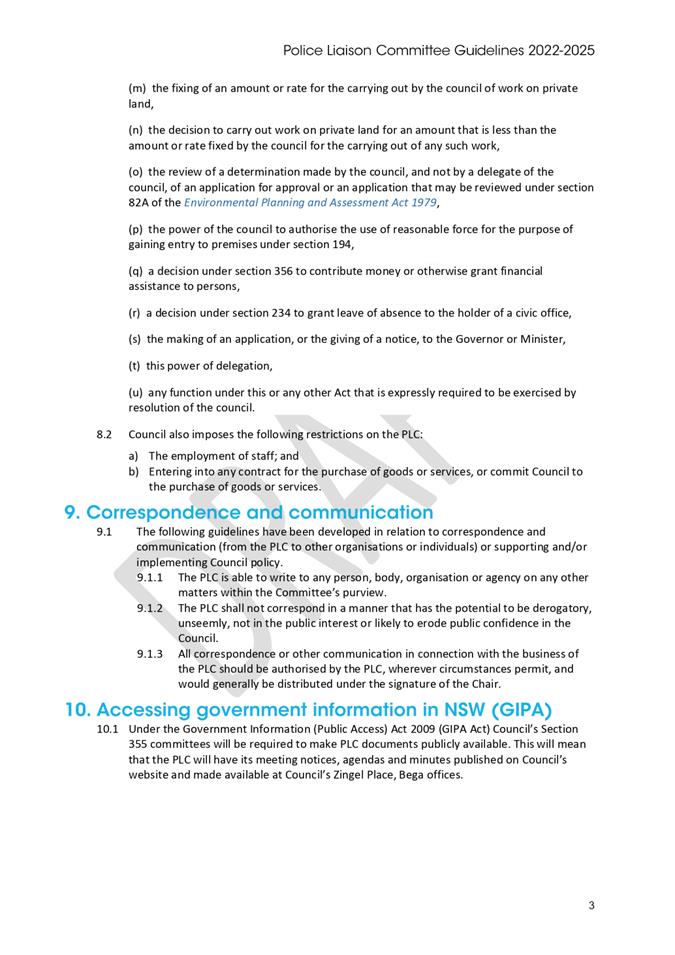
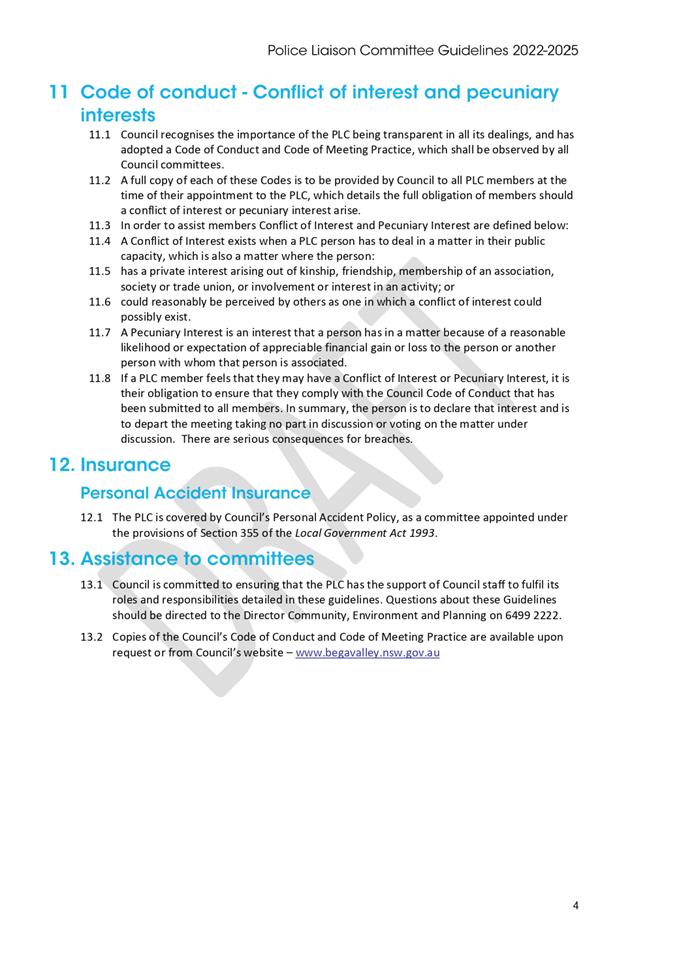
|
11 January 2022 |
|
|
Item 3.7 - Attachment 14 |
Local Traffic Committee Delegation Guidelines |

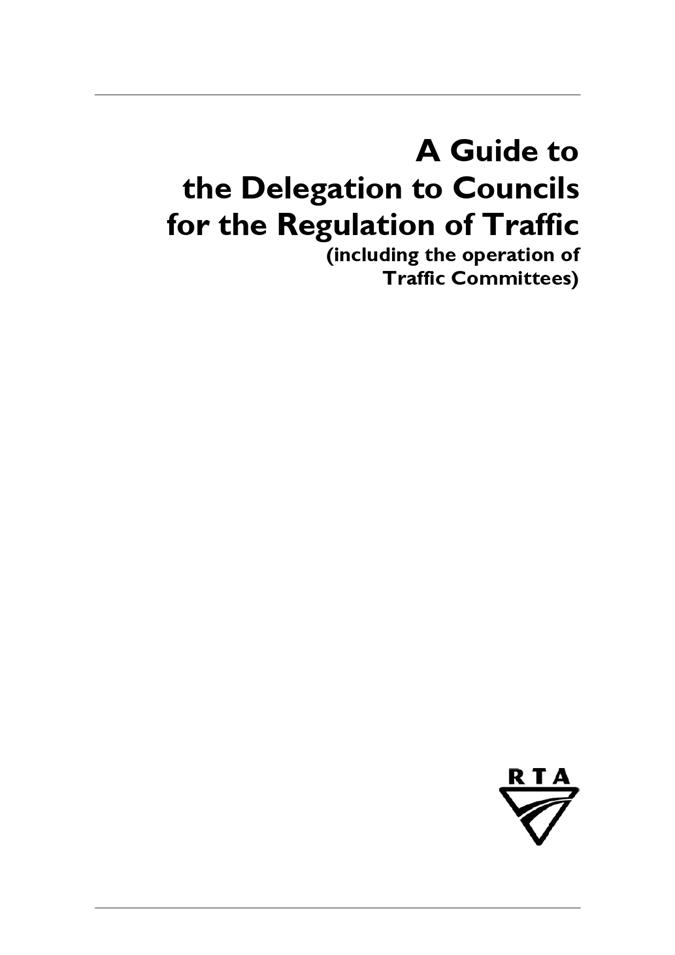
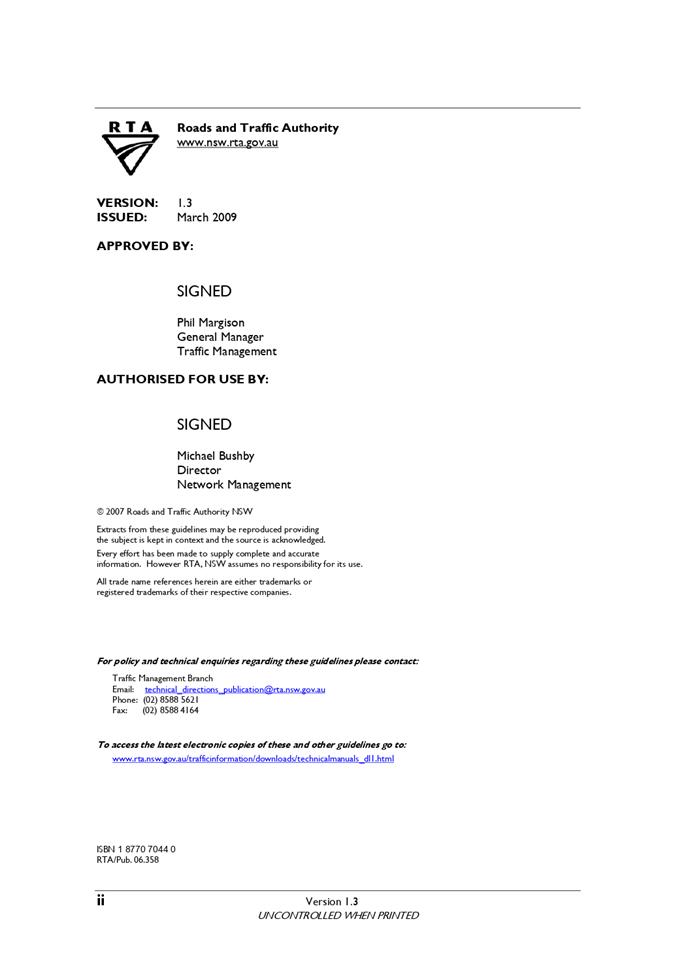
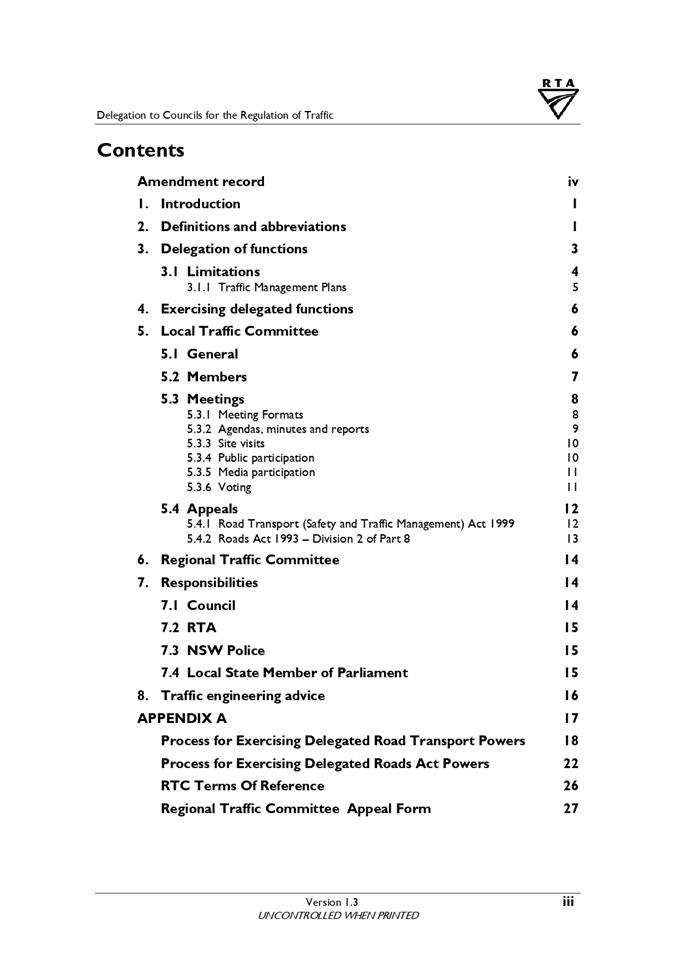
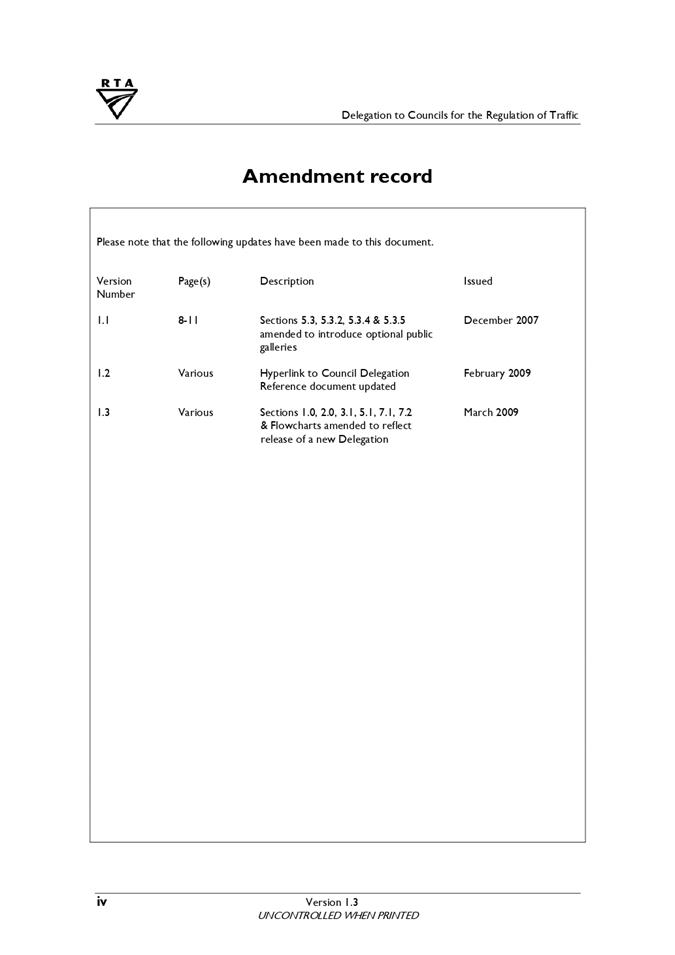
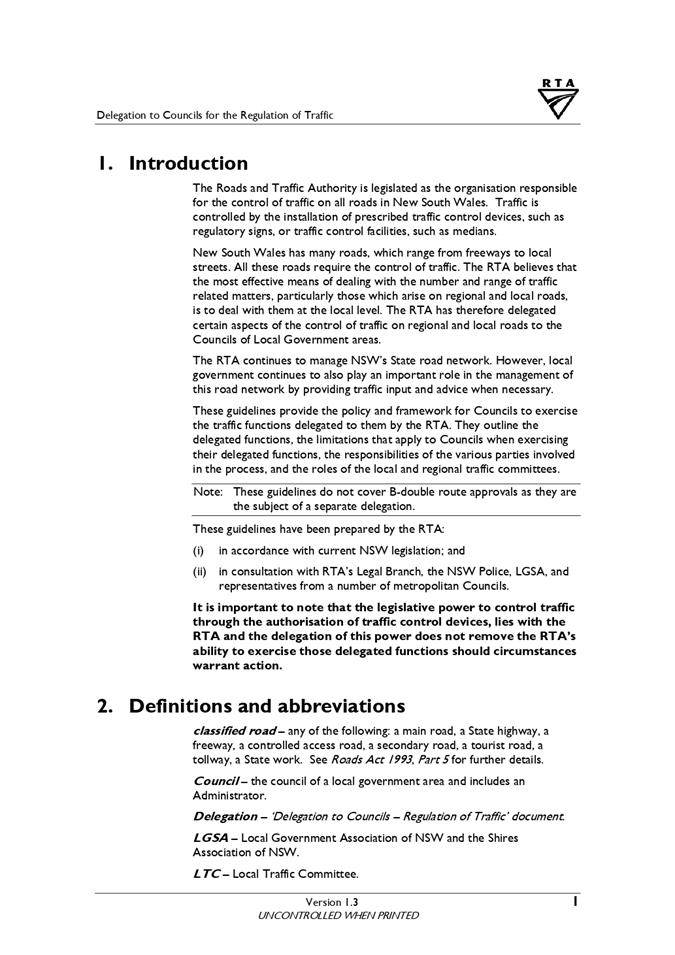
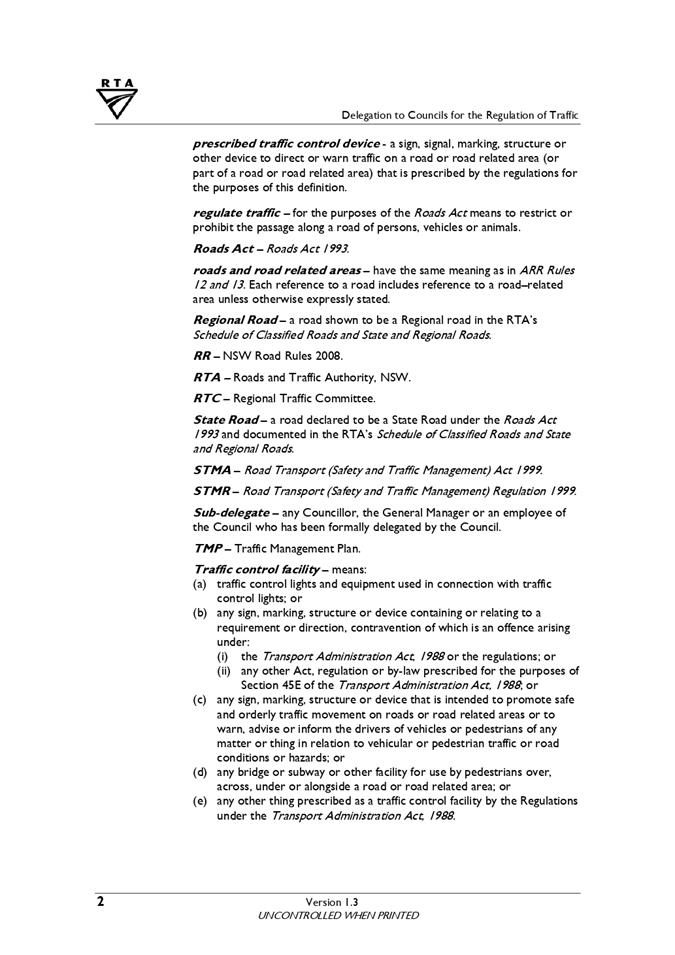
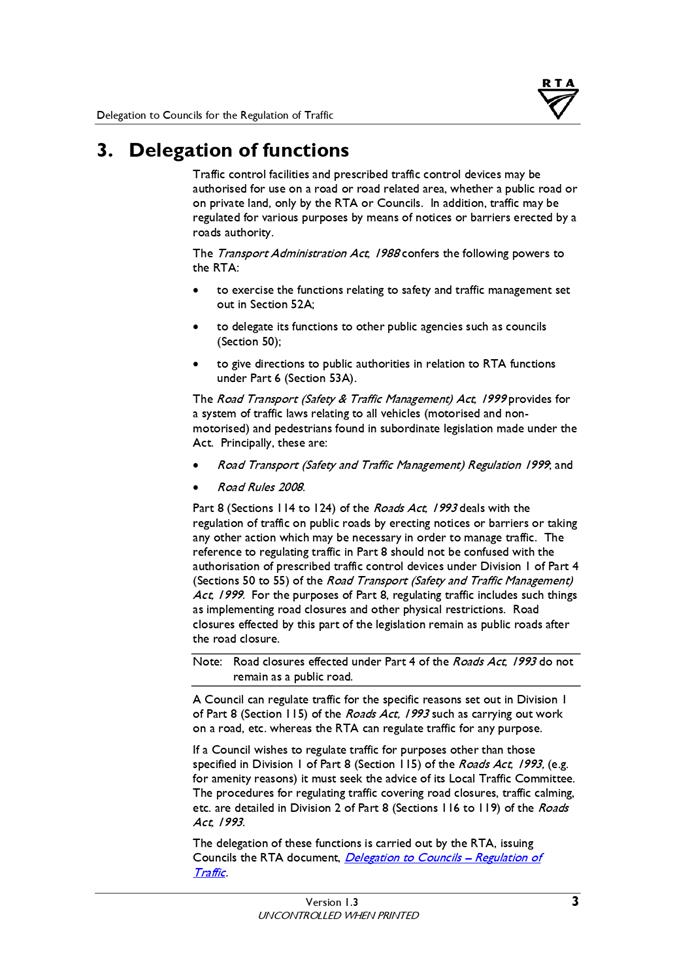
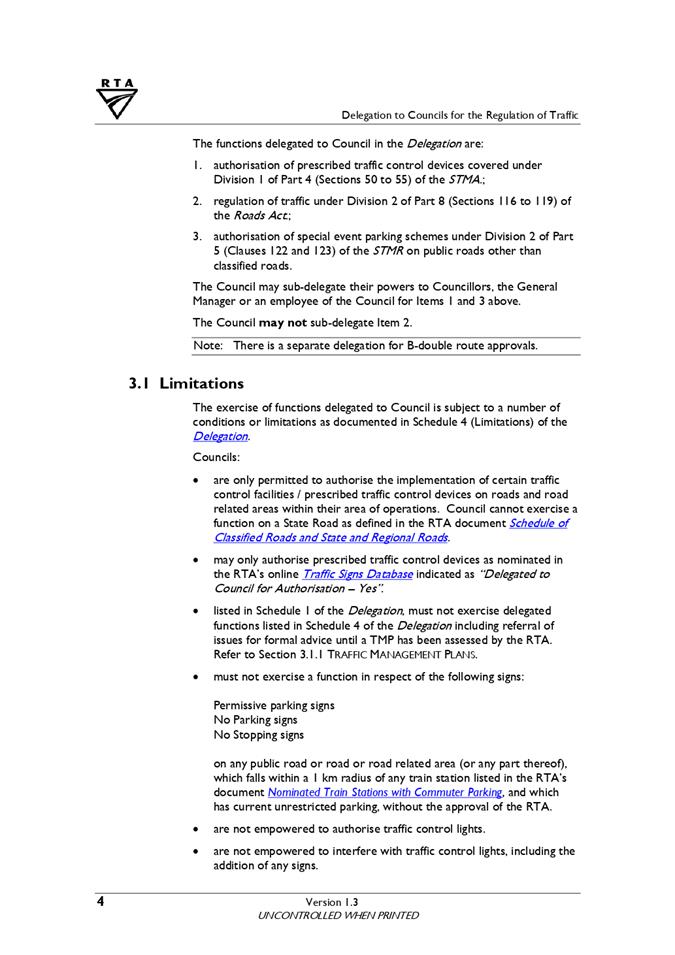
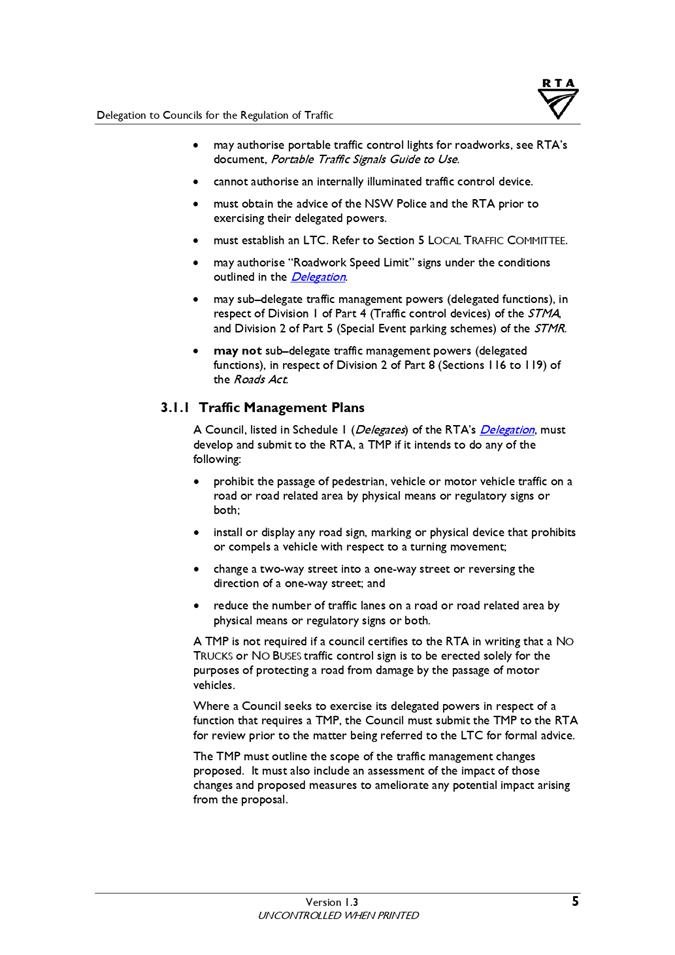

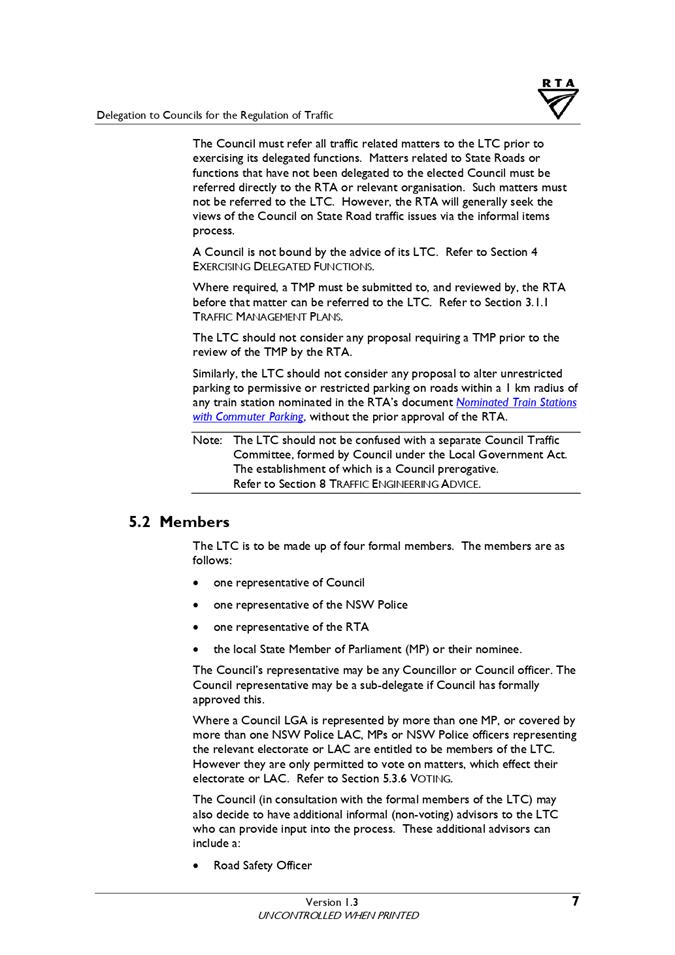

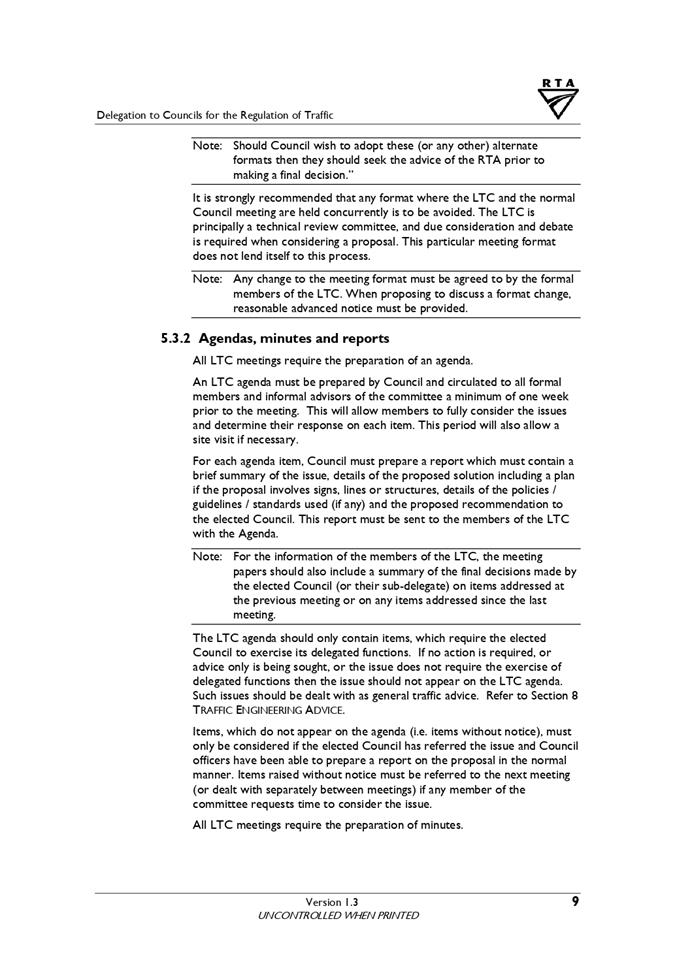

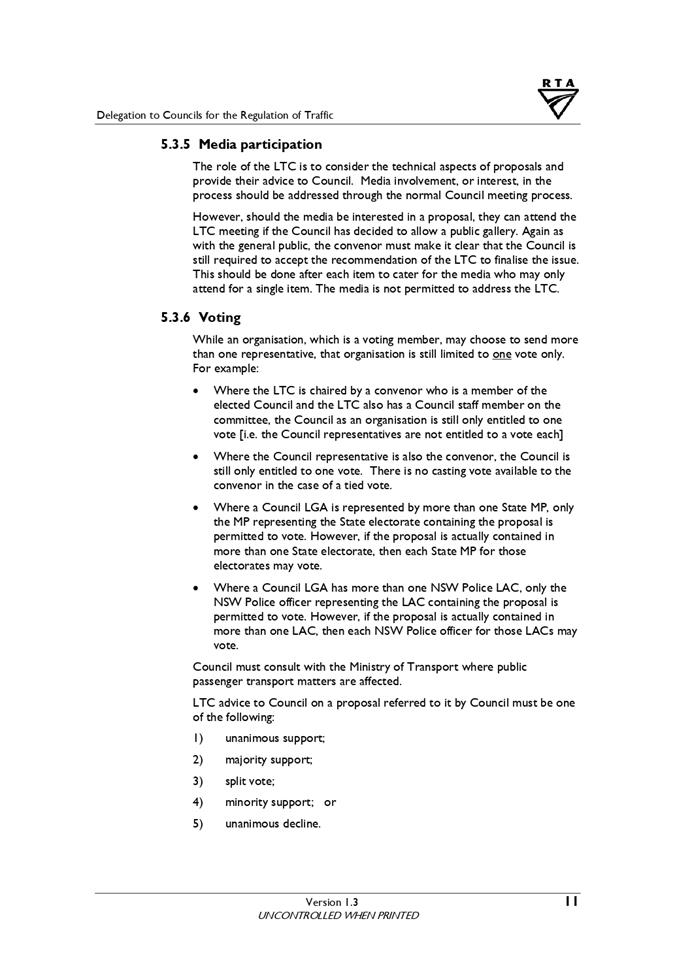
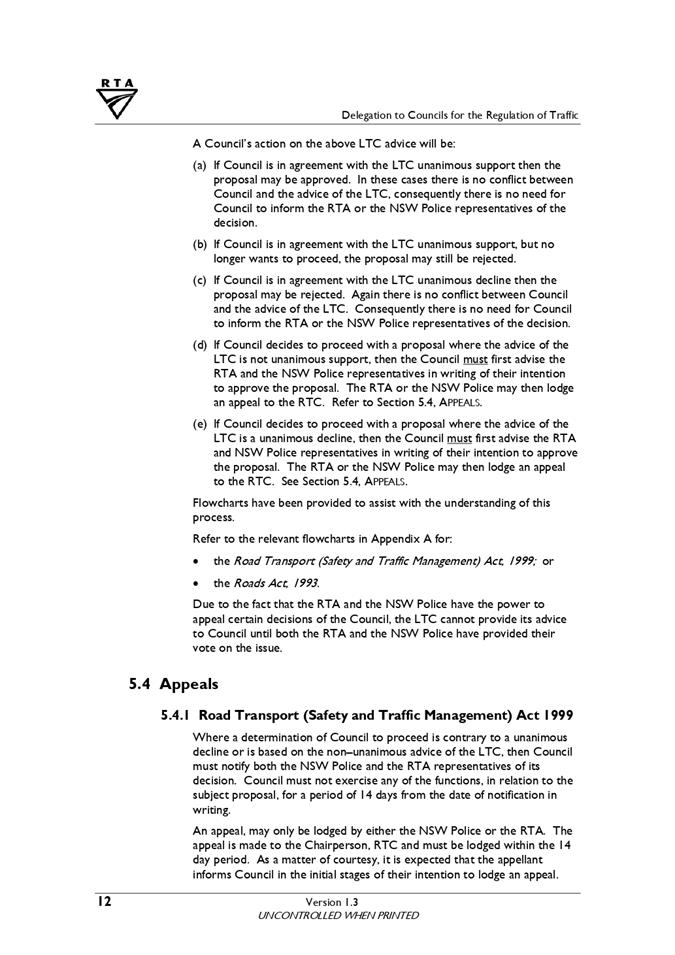
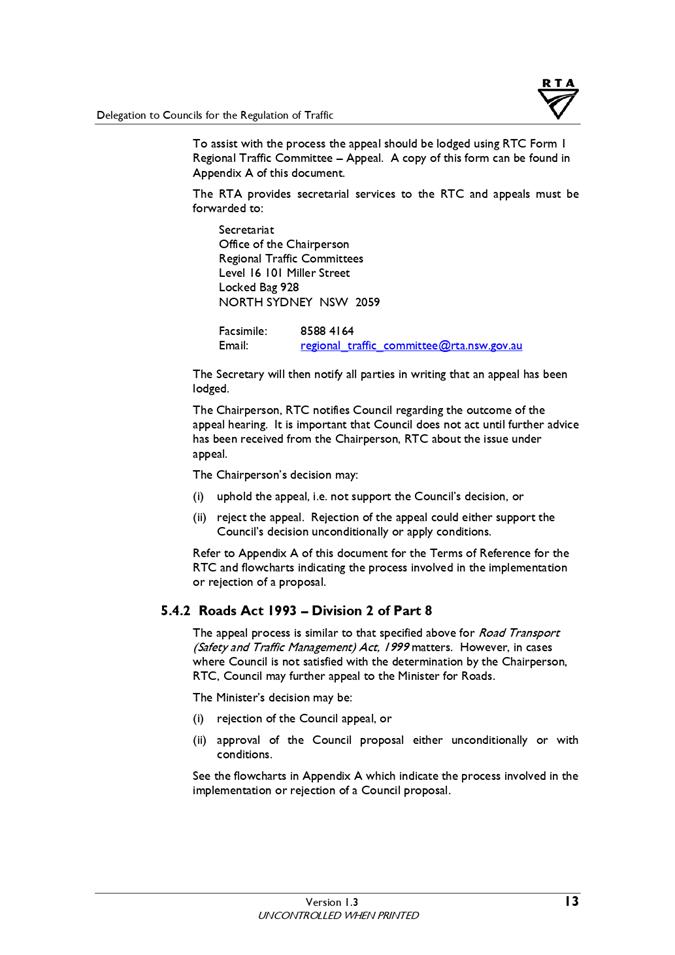
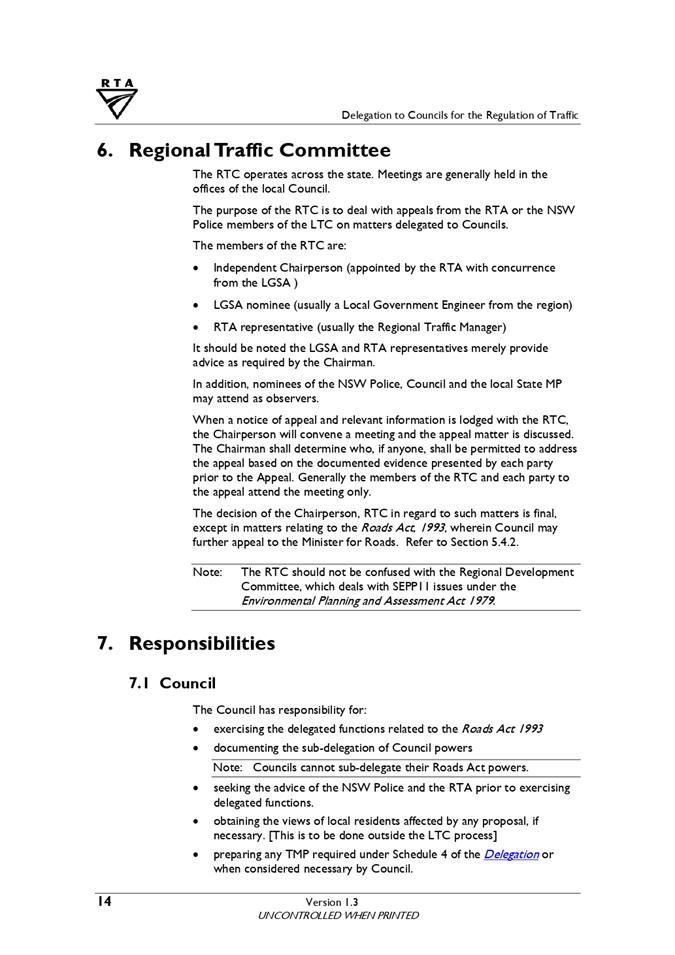
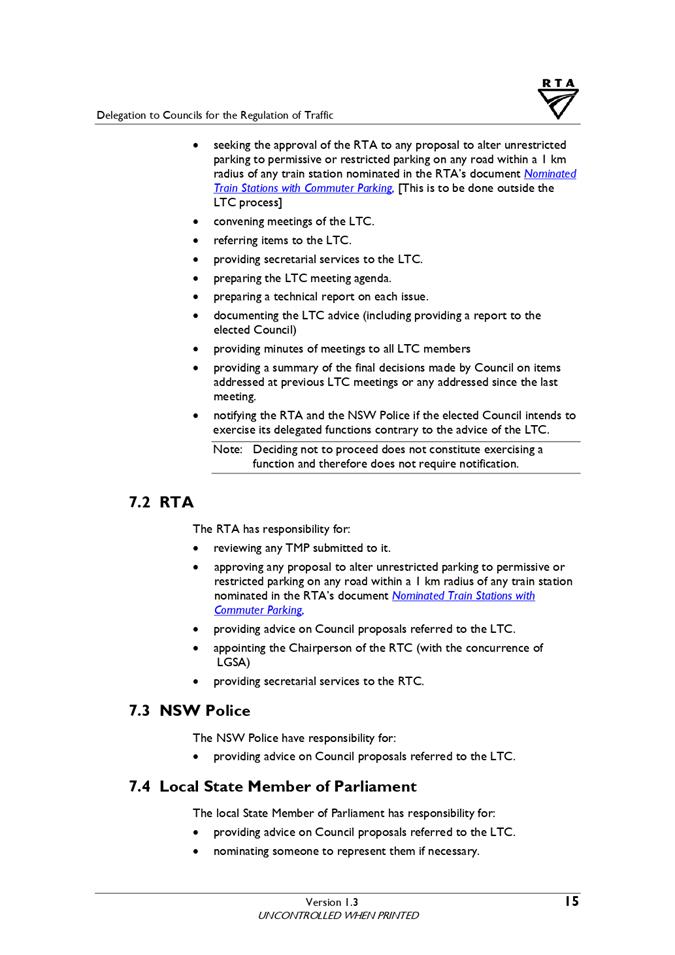
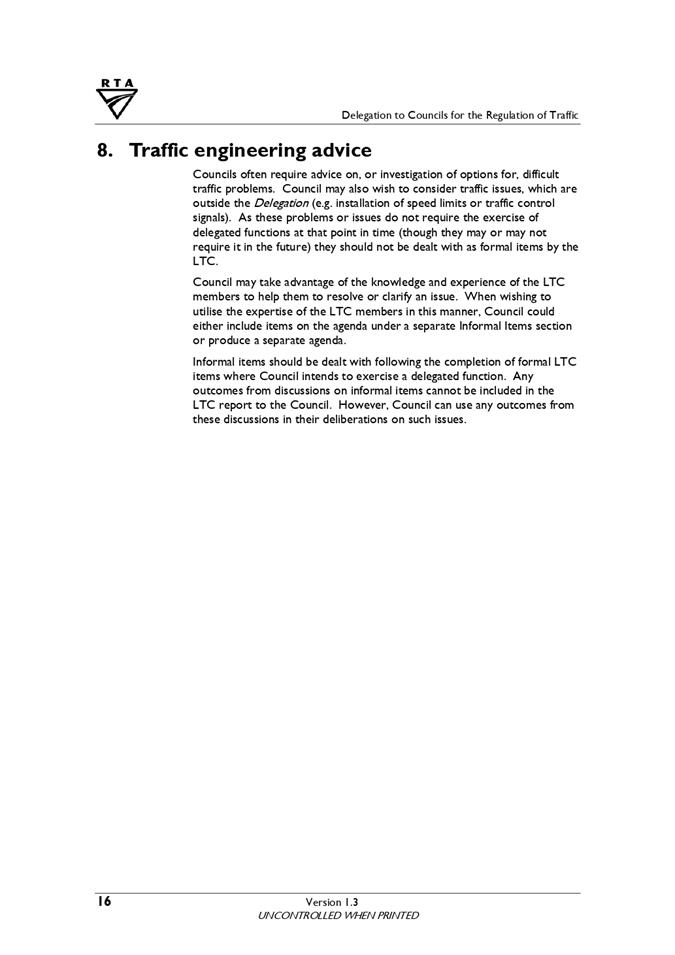
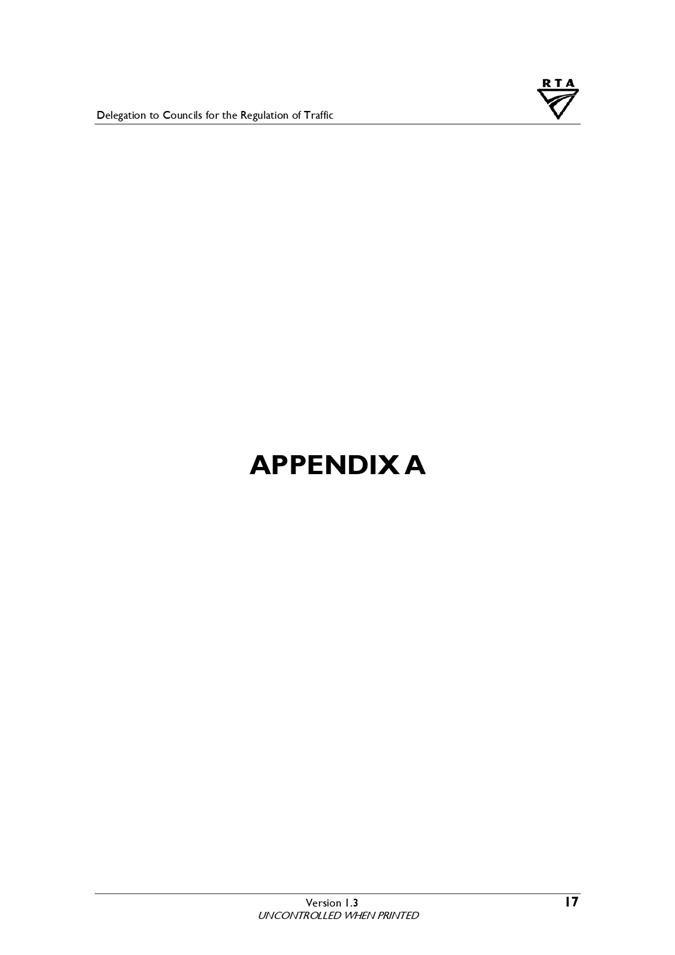
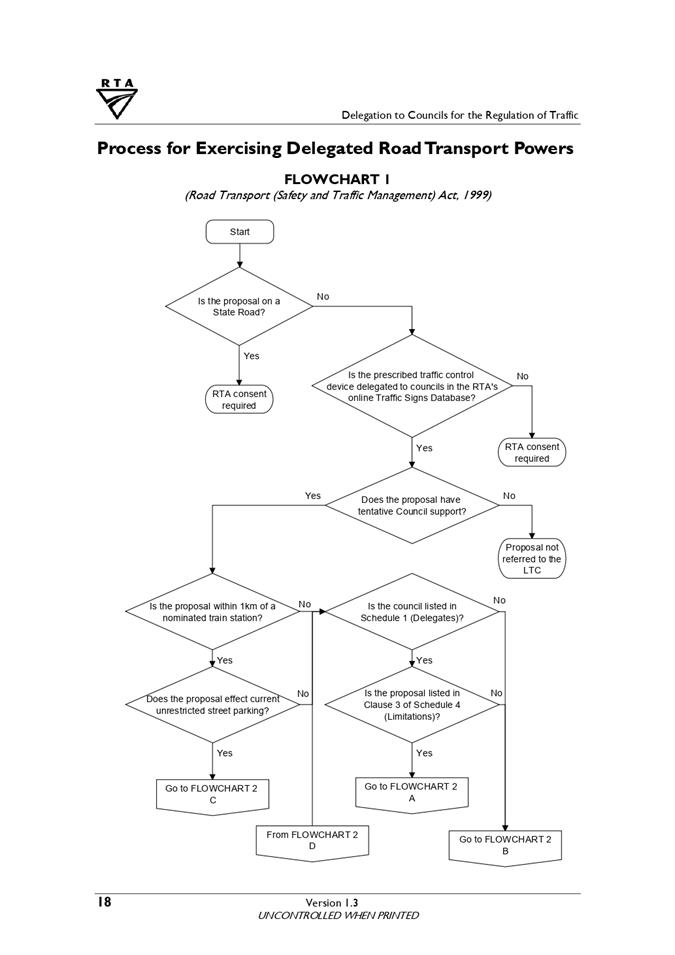
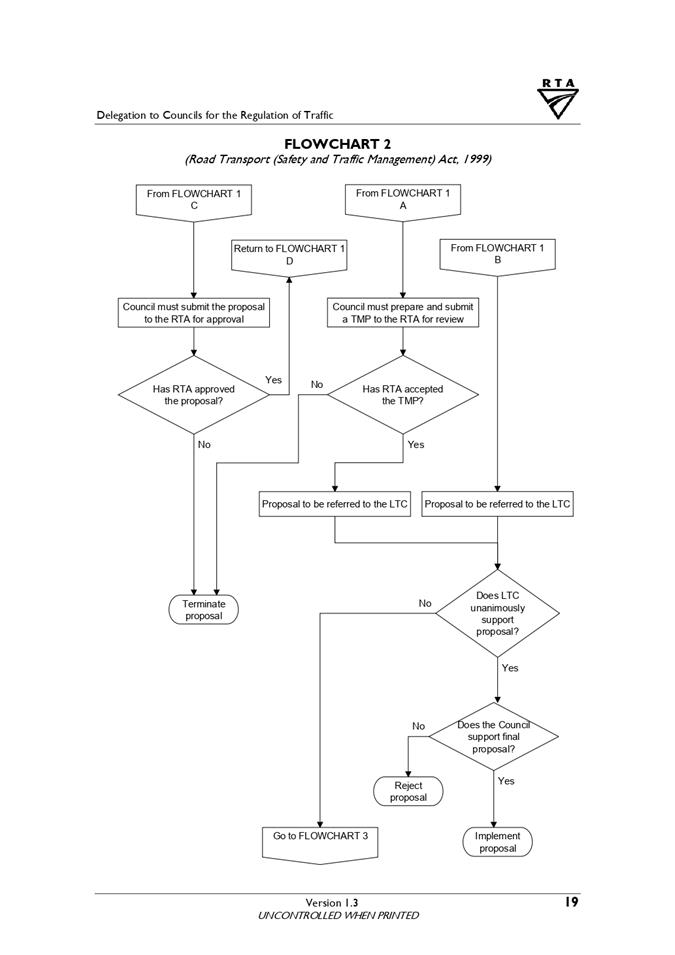
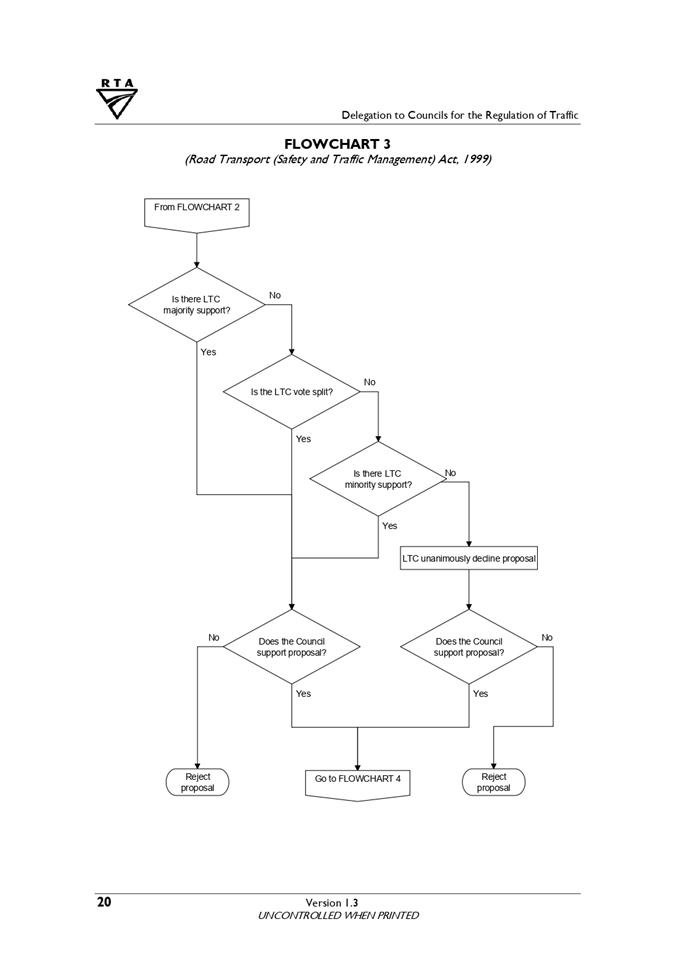
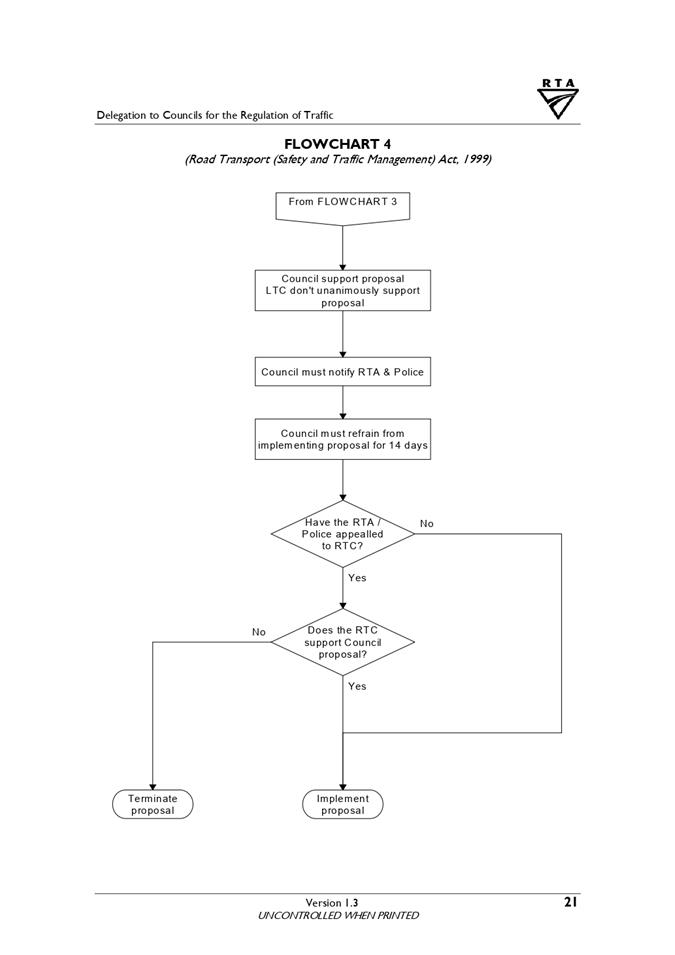
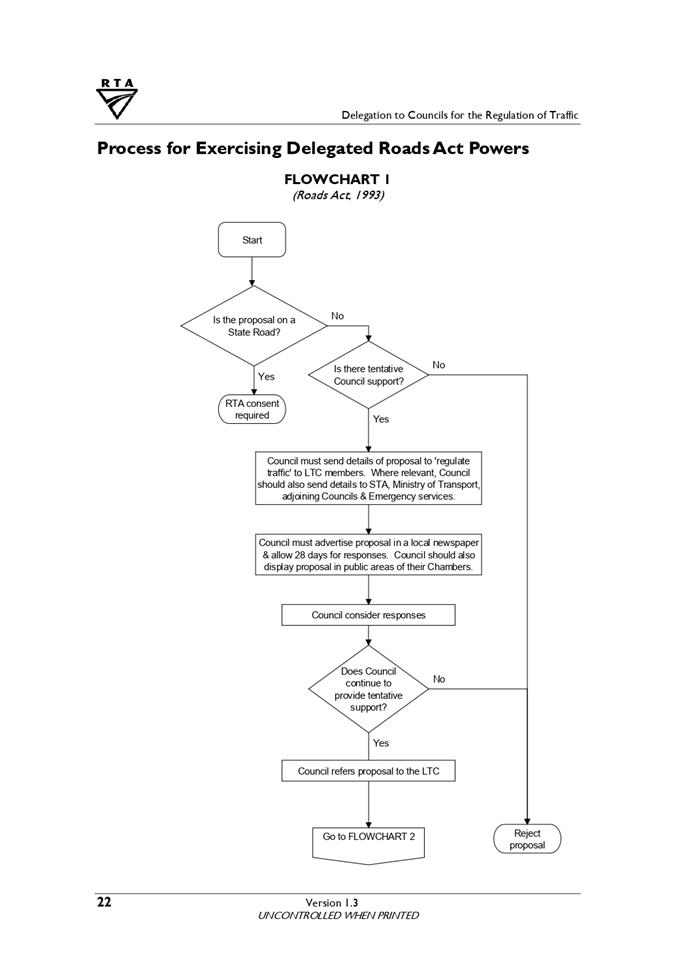
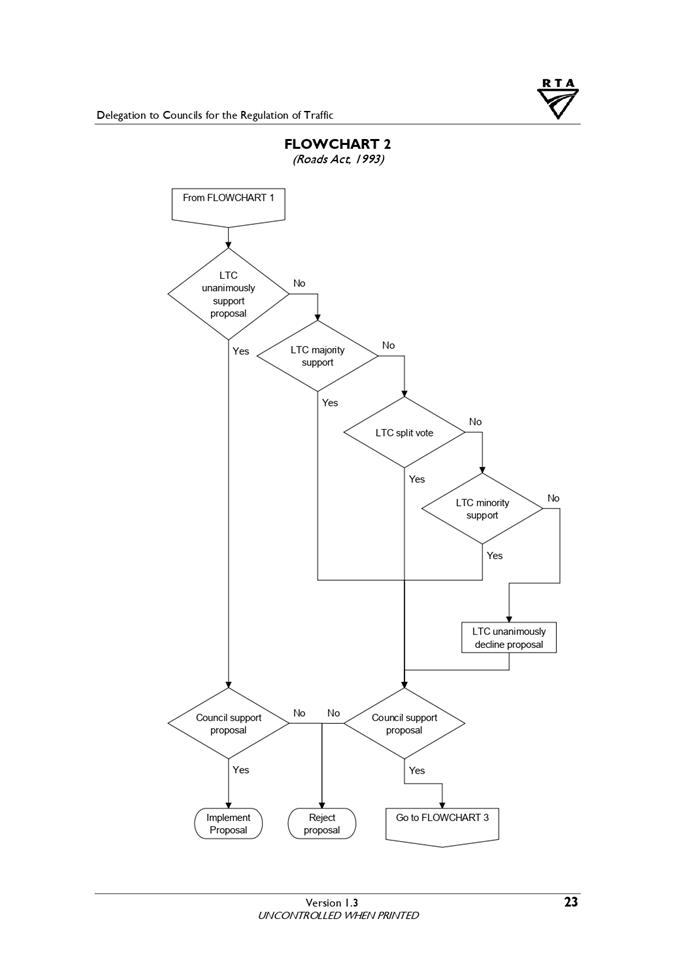
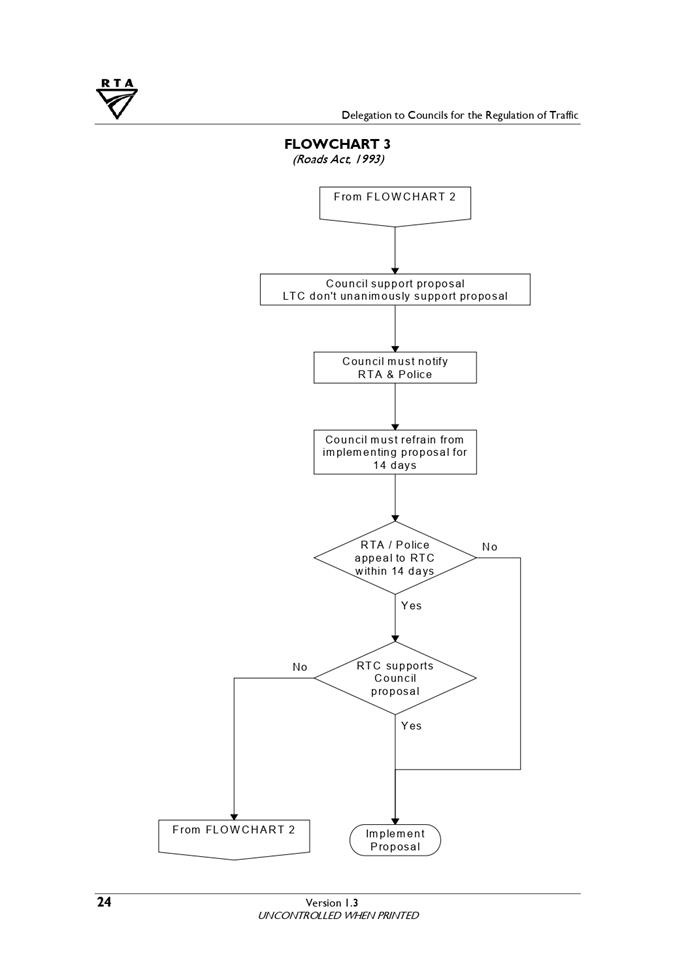
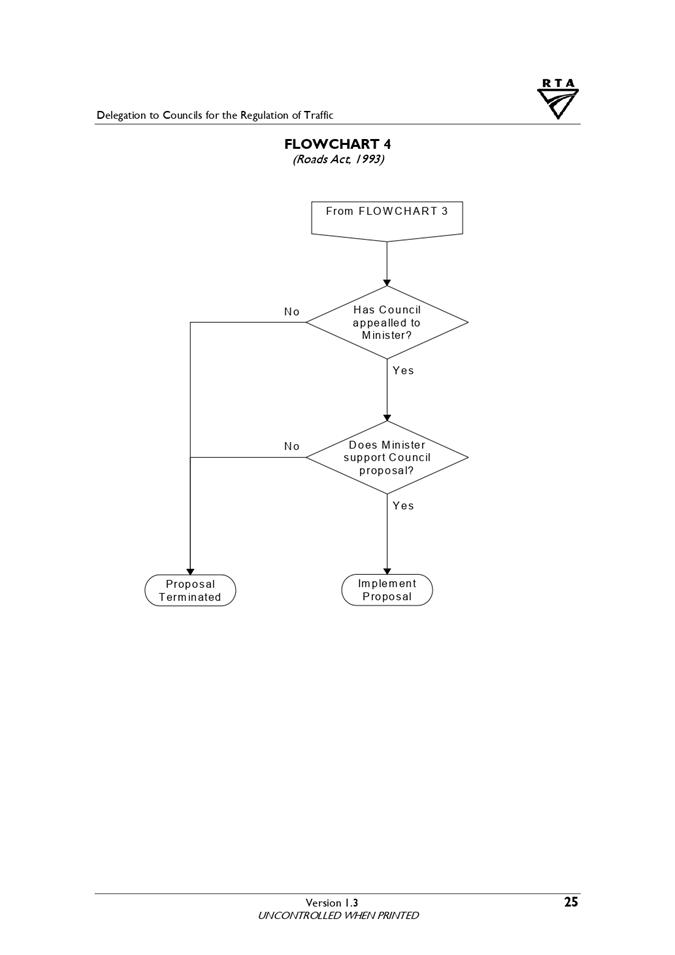
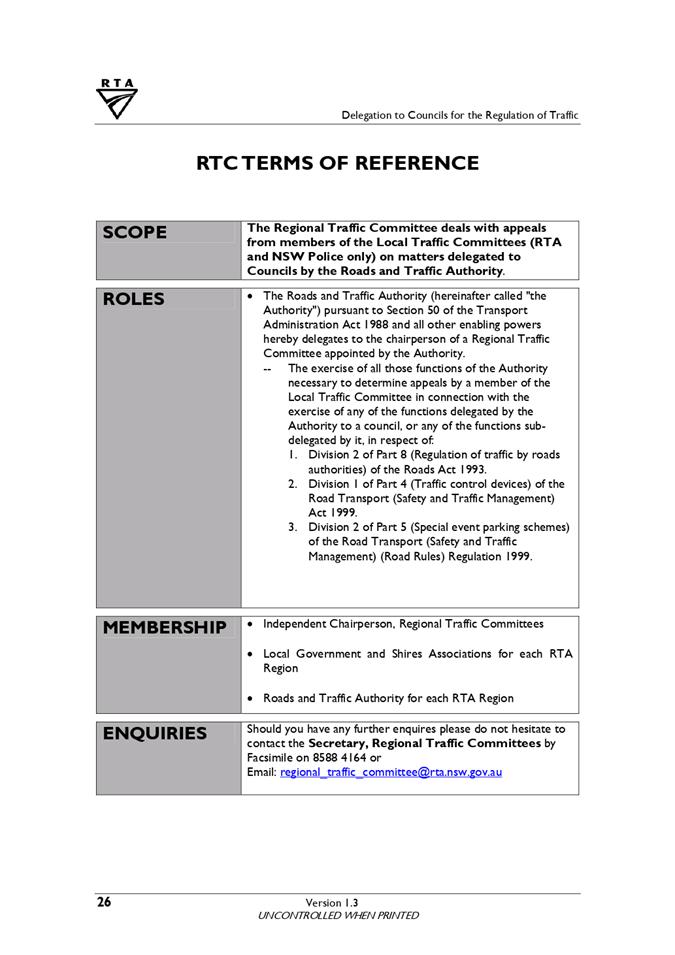
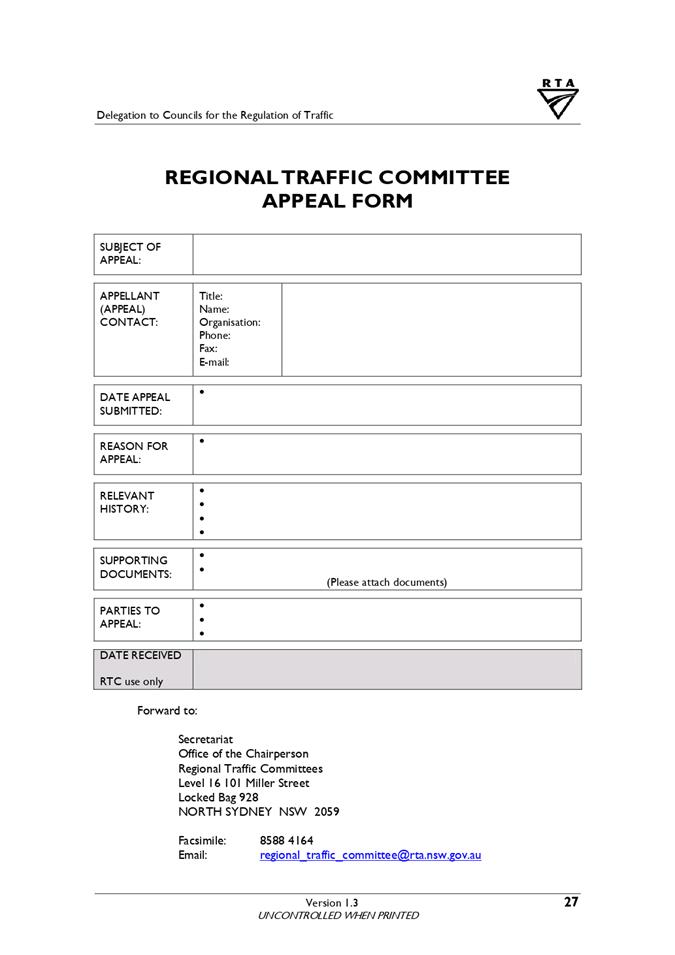
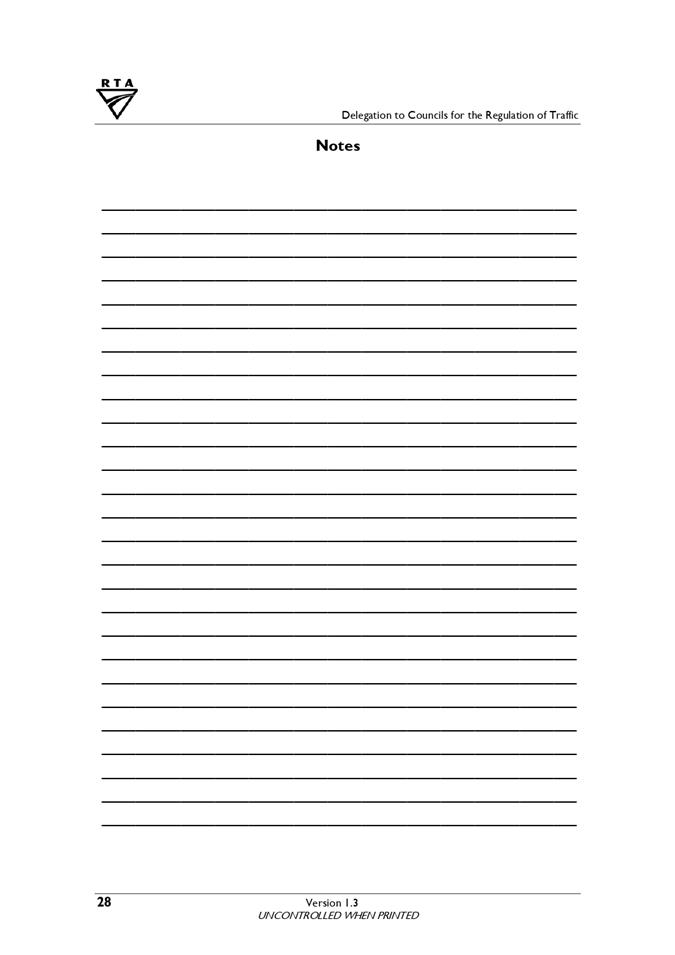


|
11 January 2022 |
|
|
Item 3.7 - Attachment 15 |
Bega Valley Museum Advisory Group Guidelines |

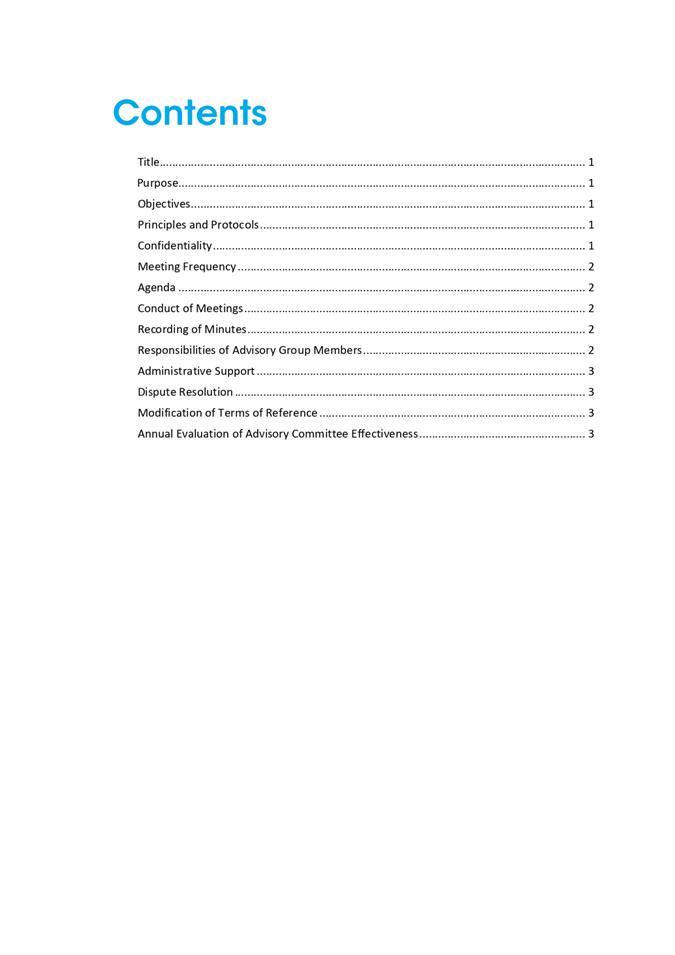
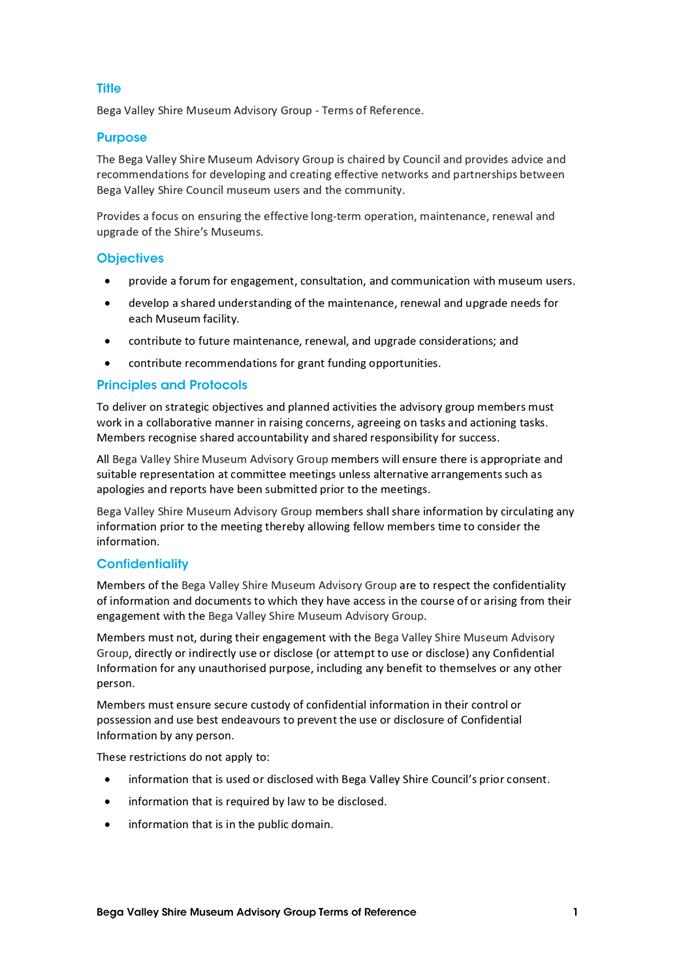
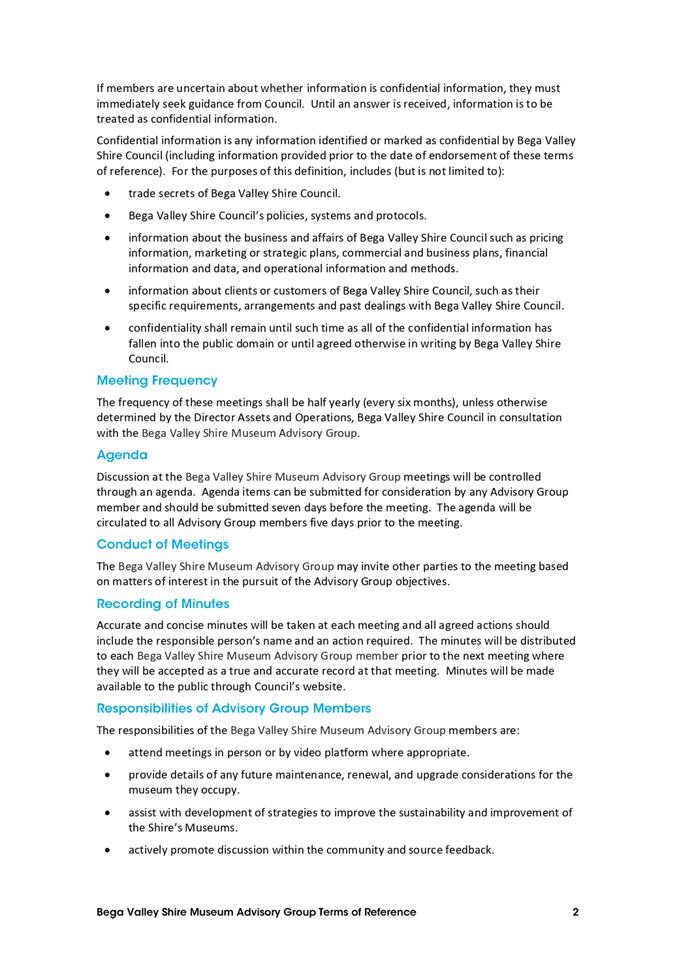
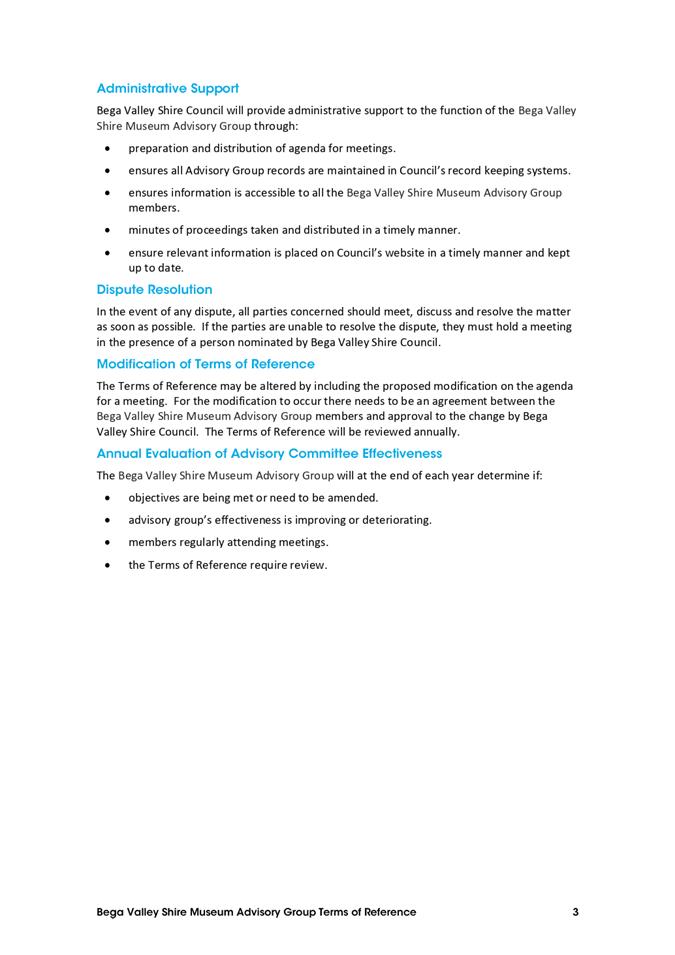
|
Item 3.8 |
3.8. Appointment of Council Delegates and Alternates to Internal and External Committees
Council appoints delegates and representatives to various Committees, Groups and Panels, following the Mayoral election.
Chief Executive Officer
1. That Council confirms the delegates and alternates to the following committees established by Council:
a) General Cemetery Advisory Committee
b) General Community Halls Committee
c) General Sportsground Committee
d) Montreal Goldfields
e) Bega Valley Shire Awards Committee
f) Bega Valley Shire Grants Committee
g) Audit, Risk and Improvement Committee
h) Access and Inclusion Advisory Committee
i) Bega Valley Museum Advisory Group
j) Bega, Eden, Merriman’s Aboriginal Liaison Committee
k) Bega Valley Community Disaster Relief Fund
l) Central Waste Facility Community Consultation Committee
m) Coast and Flood Planning Management Committee
n) Police Liaison Committee
o) Local Traffic Committee
p) Saleyards Advisory Group
2. That Council confirm the delegates and alternates to the following external committees of Council:
a) Australian Coastal Councils Association
b) Batemans Marine Park
c) Bega Valley Bush Fire Management
d) Biamanga National Park
e) Country Mayors Association
f) Canberra Region Joint Organisation
g) Mumbulla Foundation
h) NSW Public Library Association
i) South East Arts
j) South East Australian Transport Strategy (SEATS)
k) Southern Regional Planning Panel
3. That the secretariats for committees listed in Part 2 of the recommendation be advised of the appointed delegates and that they be requested to forward notice of meetings and invitations directly to the Council appointed delegate and to Council’s customer service address.
Executive Summary
Council may establish committees to support its decision making and is invited to nominate representatives to participate in committees established by other organisations. This report seeks advice from Council about how it would like to nominate to various committees.
Background
Section 355 Committees and Advisory Committees
Section 355 Committees and Advisory Committees are established by Council to perform certain functions on behalf of Council. These may include management of assets, performance of services, or joining with other organisations to provide large scale services or projects.
Local government bodies
Council is a member of a number of peak local government bodies. The Mayor is the nominated representative to regular events and meetings held by these organisations with other Councillors able to attend conferences as resolved by Council (see separate report in this business paper seeking nominees for the 2022 Local Government Conference).
Committees managed by other organisations
A number of organisations request Council involvement in committees that they administer. These committees are generally constituted to seek input into the governance of the organisation, development of policy, planning decisions, or the management of assets and services.
An outline of each of the external committees is listed below:
Australian Coastal Councils Association Inc
The Australian Coastal Councils Association Inc. was established in 2004 and is a national body formed to represent the interests of coastal councils. This work includes advocacy and research including identifying priority planning issues facing coastal communities, best practice models for local and regional planning for coastal communities, the impact of non-resident populations on coastal communities and responding to the rapid increase in listing on short-term holiday rental platforms. Membership is restricted to elected Councillors across Australia.
Batemans Marine Park
Batemans Marine Park on the NSW south coast covers 850 km2 extending from the most northerly point of Murramarang Beach near Bawley Point to the southern side of Wallaga Lake entrance at Murunna Point.
Since the commencement of the Marine Estate Management Act 2014, marine park advisory committees have operated as non-statutory advisory bodies. The Batemans Marine Park Board is supported by the Department of Primary Industries, Marine Operations and is comprised of key marine management stakeholders. The Committee’s business often overlaps with marine park management. Where possible, nomination of a local government representative with strong links to a coastal and estuary management committee is encouraged to support linkages between marine park management and the NSW coastal management program.
Bega Valley Bush Fire Management
The Bega Valley Bush Fire Management Committee is a statutory committee established under the Rural Fires Act 1997 to provide a forum for cooperative and coordinated bushfire management in a local area. The Committee is responsible for preparing, coordinating, reviewing and monitoring the Plan of Operations and Bush Fire Risk Management Plan for the area. It also assists in the coordination of bush fire detection, mitigation, control and suppression.
Biamanga National Park Board of Management
The Biamanga National Park is located north of Bega in the Bega Valley Shire. The Biamanga National Park Board of Management is appointed by the Minister of Energy and Environment to partake in decisions to do with the operation and maintenance of the park. Industry stakeholders include local Aboriginal Land groups, National Parks and Wildlife Services and representatives from across the Shire.
Country Mayors Association
The Country Mayors Association furthers the interests of rural and regional councils by advocating and lobbying on relevant NSW and national issues. It works with NSW and Australian governments and other appropriate organisations to further the interests of members and to act as an information sharing forum.
Canberra Region Joint Organisation
The Canberra Region Joint Organisation (CRJO) provides a forum for councils, NSW government agencies and other stakeholders to work together at a regional level to identify shared priorities, delivering important regional projects and better outcomes for communities.
In 2017, the NSW Parliament passed the Local Government Amendment (Regional Joint Organisations) Act 2017, to establish a network of joint organisations (JOs). The JOs are local government entities with legal powers to enable councils to work together at a regional level to achieve improved planning, economic development and service delivery outcomes in regional NSW.
The Board is formed from mayors across the 10 councils that are part of the CRJO.
Mumbulla Foundation
Council has a Memorandum of Understanding with Mumbulla Foundation to executive the community endeavours of the Foundation and support the Foundation’s work through the delivery of shared activities, including community grants and scholarships to progress social, cultural, economic and environmental status of the Shire and all members of the community within it.
The Mumbulla Foundation provide a forum of discussion of big ideas to enhance the society, environment and economy of Bega Valley Shire. It provides opportunity to engage and inspire the Bega Valley Shire community to participate in civic life.
NSW Public Library Association
New South Wales Public Libraries Association is a single voice for public libraries in NSW. The public library network across NSW reflects the vibrant communities within which they operate. NSWPLA pride the relationships developed with Local Government, the providers of public libraries across NSW, and is continuously working with them to strengthen then dynamic and innovative public library network. It is the peak body for public libraries across NSW providing advocacy, network, opportunities, professional development, collaboration and recognition.
South East Arts
South East Arts (SEA) is the regional arts and cultural development organisation covering the Bega Valley, Eurobodalla and Snowy Monaro local government areas. SEA actively supports the ongoing development of, and participation in, arts and culture throughout the South East region of NSW.
It is supported by artists and art organisations, communities and councils across the operating region. The services in which it provides include the promotion of art events, information and research on artists, audiences, venue and resources regarding funding, sponsorship and donations.
South East Australian Transport Strategy
South East Australian Transport Strategy Inc. (SEATS) was created by a group of Victorian and New South Wales councils concerned with the poor transport infrastructure in south eastern Australia. SEATS has developed a Transport Network Strategy, which identifies a number of priority transport projects that benefit the region and beyond, and advocates for investment in those priorities.
Southern Regional Planning Panel
The Southern Regional Planning Panel (SRPP) is a statutory body comprising a group of planning experts appointed by the NSW Government and councillors to determine regionally significant development applications and provide advice about planning proposals. The SRPP makes decisions about DAs in an open forum without political or other interference.
The SRPP is made up of five members. Three of these are independent experts appointed by the Minister for Planning. The other two are Council representatives.
Committees proposed for Councillor membership
|
Committees of Council |
Delegate |
Alternate |
Council staff support |
|
General Cemetery Advisory Committee |
One Councillor |
|
AAO |
|
General Community Halls Committee |
One Councillor |
|
AAO |
|
General Sportsground Committee |
One Councillor |
|
AAO |
|
Montreal Goldfields Committee |
One Councillor |
|
AAO |
|
Bega Valley Shire Awards Committee |
Mayor and two Councillors |
|
CEP |
|
Bega Valley Shire Grants Committee |
Mayor and two Councillors |
|
CEP |
|
Audit, Risk and Improvement Committee |
Mayor and one Councillor |
|
BAG |
|
Access and Inclusion Advisory Committee |
Councillor |
|
CEP |
|
Bega Valley Museum Advisory Group |
Nil |
|
AAO |
|
Saleyards Advisory Group |
One Councillor |
|
AAO |
|
Bega, Eden, Merrimans Aboriginal Liaison Committee |
Mayor |
One Councillor |
CEP |
|
Bega Valley Community Disaster Relief Fund |
Mayor and one Councillor |
|
BAG |
|
Central Waste Facility Community Consultation Committee |
Mayor |
|
AAO |
|
Coast and Flood Management Committee |
Mayor and one Councillor |
|
CEP |
|
Police Liaison Committee |
Mayor |
|
CEP |
|
Local Traffic Committee |
One Councillor |
|
AAO |
|
External Committees of Council |
Delegate/Representative |
Alternate |
|
|
Australian Coastal Councils Association Inc |
One Councillor |
|
CEP |
|
Batemans Marine Park |
One Councillor |
|
CEP |
|
Bega Valley Bush Fire Management |
One Councillor |
|
AAO |
|
Biamanga National Park |
One Councillor |
One Alternate |
CEP |
|
Country Mayors Association |
Mayor |
|
EXE |
|
Canberra Region Joint Organisation |
Mayor |
|
EXE |
|
Mumbulla Foundation |
One Councillor |
|
CEP |
|
One Councillor |
|
CEP |
|
|
South East Arts |
One Councillor |
|
CEP |
|
South East Australian Transport Strategy |
One Councillor |
|
AAO |
|
Southern Regional Planning Panel |
Two Councillors with relevant experience |
Two alternate Councillors with relevant experience |
CEP |
Note: AAO – Assets and Operations Directorate, BAG – Business and Governance Directorate, CEP – Community, Environment and Planning Directorate, EXE – Executive Office
Options
It is recommended Council determine the delegate for the term of Council. Council may elect not to provide a nominee for one or more committees.
Community and Stakeholder Engagement
Engagement undertaken
Council officers have liaised with the external committees Council to determine the requirement for Councillor representation. Guidelines for internal committees were generally discussed with the members of those committees in the previous term of Council.
Engagement planned
Community participation in the committees of Council will occur through an expression of interest process for interested volunteers to join in January/February 2022 period.
Financial and Resource Considerations
Establishment and operation of committees of Council is part of the regular business of Council.
Legal /Policy
Section 355 of the Local Government Act 1993 provides that the exercise of certain functions of a Council may be undertaken by a committee of the Council.
Impacts on Strategic/Operational/Asset Management Plan/Risk
Strategic Alignment
6. Strong, Consultative Leadership
6.11 We are an informed and engaged community with a transparent, consultative and responsive Council
6.11.1 Improve communication about Council activities, decisions and achievements
Environment and Climate Change
There are no direct environment or climate change implications associated with the recommendation of this report.
Economic
There are no direct economic implications associated with the recommendation of this report.
Risk
The establishment and operation of committees of Council are part of the regular business of Council. The recommendation of this report does not introduce any new risks to Council.
Social / Cultural
These committees seek to provide a mechanism for interested community members to play an active role in advocating for change at a local level. Committees of Council are an instrument for facilitating open and transparent discussion about decisions made by Council.
Attachments
Nil
|
Extraordinary Council 11 January 2022 |
Item 3.9 |
3.9. Countback Elections for filling Councillor casual vacancy
The NSW Electoral Commission has advised of changes which allow filling of a casual vacancy on the Council to be managed by way of a Countback election in the 18 months following the local government ordinary election. A countback election can only be conducted, if the relevant council passed a resolution at its first meeting after the ordinary election that any vacancy would be filled by a countback of votes.
Director Business & Governance
Pursuant to section 291A(1)(b) of the Local Government Act 1993 (the Act) Bega Valley Shire Council declares that casual vacancies occurring in the office of a councillor within 18 months after the last ordinary election of councillors for the Council on 4 December 2021 are to be filled by a countback of votes cast at that election for the office in accordance with section 291A of the Act and directs the general manager to notify the NSW Electoral Commission Council’s decision within 7 days of the decision.
Executive Summary
A by-election is an election in a single local government area or ward and can take place outside the normal four-year cycle. By-elections are held when a vacancy arises in a Council, for example when a Councillor resigns or dies in office.
An alternative to a by-election is a countback election. Following the next NSW Local Government elections, a council may resolve to have vacancies that occur on the council in the 18 month period after the elections to be filled by a ‘countback’ of the votes, instead of a by-election. This does not apply to a vacancy in the office of mayor.
Background
Following the 2021 local government elections, councils will, for the first time, have the option of using a countback of votes cast at the last ordinary election to fill casual vacancies occurring in the offices of councillors in the first 18 months after the election.
This will allow councils to use a countback to fill vacancies at a lower cost than the cost of holding a by-election.
To exercise the option of using a countback to fill casual vacancies occurring in the first 18 months following the election, councils must resolve, at their first meeting after the election, to use a countback to fill casual vacancies.
If councils do not resolve this at the first meeting after the election, they will be required to fill casual vacancies through a by-election.
Options
Filling a councillor casual vacancy
When a casual vacancy occurs after the local government elections in a councillor position (for example through resignation or death), the vacancy is filled by way of a by-election, unless one of the following options is used:
In the 18 months following the local government ordinary election, a countback election will be conducted, but only if the relevant council passed a resolution at its first meeting after the ordinary election that any vacancy would be filled by a countback of votes and if the vacating councillor was elected under the proportional representation method (that is, where two or more candidates were elected).
In the 18 months prior to the next local government ordinary election, the council may receive ministerial approval to leave the position vacant until that next election.
Filling a popularly elected mayor casual vacancy
When a casual vacancy occurs in the office of a popularly elected mayor (for example through resignation or death), the vacancy is filled by way of a by-election, unless it occurs within 18 months before the next ordinary election.
If so, the Governor of New South Wales will appoint a councillor nominated by the council to the vacant office. If the council does not nominate a councillor, the Governor may appoint one of the councillors to the office.
Countback elections
A countback election is used to elect a councillor to fill a single vacancy, where the vacating councillor was elected under the proportional representation method (i.e. where two or more candidates were elected at a local government ordinary election). If there are multiple vacancies, a separate countback election is held for each vacancy.
The returning officer contacts all unelected candidates from the local government ordinary election who may still qualify to be elected to the office of councillor. Where the candidate is interested, they must submit a formal application to the returning officer. All candidates who submit and do not withdraw their application, become eligible candidates.
Timeline
The timeline for a countback election is:
· The Electoral Commissioner is notified of a casual vacancy, within seven days of it occurring.
· A returning officer is appointed within 14 days of the notification of the vacancy.
· Casual vacancy notices are issued 2 to 14 days from the appointment of the returning officer.
· Where a candidate is interested, they must submit a formal application to the returning officer. The application period closes after 10 days of the notices being issued.
· The countback is conducted within 14 days of the vacancy notices being issued.
· It may take up to a month for the results to be declared.
A countback election must be completed within 49 days, and applications for candidates to participate is open for 10 days.
If there are no eligible candidates, an attendance by-election must be held. If there is only one eligible candidate, that candidate is elected. If there are multiple eligible candidates, a countback election is conducted. In a countback election, the returning officer
· uses preference data from ballot papers from the previous local government ordinary election
· uses the same proportional representation method used in the original election
· effectively re-runs the election making the vacating councillor ineligible and distributing each of their ballot papers to the next preference on the ballot paper
· if a non-eligible candidate would be elected, the election is re-run with that candidate’s ballot papers also distributed to their next preference on the ballot paper
· re-runs the countback until an eligible candidate is elected.
Eligible candidates and the council are then notified of the result.
At a countback election, a sitting councillor cannot be unelected, and non-eligible candidates cannot be elected.
Community and Stakeholder Engagement
Engagement undertaken
There has not been and is not intended to be any community engagement on this item.
Engagement planned
There has not been and is not intended to be any community engagement on this item.
Financial and Resource Considerations
There are significant financial savings in conducting a by election using the Countback system.
Legal /Policy
All local government elections in NSW are conducted in accordance with the Local Government Act 1993 and the Local Government (General) Regulation 2005.
The postponement of the 2020 Local Government elections, until 4 December 2021, will not affect the schedule of subsequent council elections. After the December 2021 elections, the next Local Government election will take place in September 2024.
Impacts on Strategic/Operational/Asset Management Plan/Risk
Strategic Alignment
Review and adoption of this procedure aligns with the following FY2022 Delivery Program and Operational Plan activities:
6.11.8: Develop and implement good governance systems
6.11.5: Support Councillors and ensure open and
effective Local Government in our Shire
6.11.5.1: Coordinate the 2021 Local Government Election including the
Councillor Induction and Training
Environment and Climate Change
There are no Environment and Climate Change implications associated with this report.
Economic
There are no major economic benefits, apart from any financial savings to Council in conducting a by election using the Countback system.
Risk
There are no identified risks in adopting the NSW Electoral Commission.
Social / Cultural
There are no social or cultural impact in running a by election using the countback system.
Attachments
Nil
|
Extraordinary Council 11 January 2022 |
Item 3.10 |
3.10. Local Government NSW Special Conference 2022
Due to the impacts of COVID 19 and deferral of the Local Government Elections to 4 December 2021, Local Government NSW (LGNSW) have implemented modified arrangements for the 2021 LGNSW Annual conference.
Chief Executive Officer
It is recommended that Council endorse the Mayor and nominate two other Councillors as voting delegates for the 2022 LGNSW special conference and note the Chief Executive Officer’s attendance at the conference.
Executive Summary
Due to the impacts of COVID 19 and deferral of the Local Government Elections to 4 December 2021, Local Government NSW (LGNSW) have implemented modified arrangements for the 2021 LGNSW Annual conference. This report intends to provide information on the current conference arrangements and to recommend Council nominate voting delegates for the conference.
Background
LGNSW have implemented modified arrangements for the 2021 LGNSW annual conference. Below is an extract from the LGNSW conference website that outlines current conference arrangements.
“ The postponement of local government elections in NSW has had a significant flow-on effect for LGNSW’s Annual Conference, previously scheduled to take place at the Hyatt Regency Sydney from 28-30 November.
As a result, we’ve had to take the difficult decision to split our premier annual event into two components:
· A one-hour Annual Conference to present our annual report and financial reports, which will be conducted online from 9.30am on Monday 29 November 2021; and
· A special conference – including the debate and resolution of motions setting our advocacy agenda for 2022 - to be held in-person at the Hyatt Regency Sydney from Monday 28 February to Wednesday 2 March 2022.
The previous timetable (28-30 November) would have placed the three-day event squarely in the last week of the election campaign period – a schedule not only inconvenient for all Councillors, but also one with potentially far-reaching implications.
LGNSW is working hard to navigate the complex interplay between the rules and regulations for registered organisations, while helping our members uphold the strict requirements of electoral law.
The Letter of Invitation includes all the details you need to participate fully in the conference.
In the interim, we have also developed the following FAQs for members, which will grow in detail as more information becomes available.
Please check back regularly for more information or if you have further questions.”
Bega Valley Shire Council has three voting rights at the annual conference.
Further information on the conference can be found at Home | Local Government NSW | Annual Conference (lgnswconference.org.au)
Options
There are limited options associated with this report.
Community and Stakeholder Engagement
There has not been and is not intended to be any community engagement on this item.
Engagement undertaken
There has not been and is not intended to be any community engagement on this item.
Engagement planned
There has not been and is not intended to be any community engagement on this item.
Financial and Resource Considerations
Councils currently adopted budget makes adequate provision for attendance at the LGNSW conference for three Councillors.
Legal /Policy
There are no legal policy implications associated with this report.
Impacts on Strategic/Operational/Asset Management Plan/Risk
Strategic Alignment
There are no Strategic Alignment implications associated with this report.
Environment and Climate Change
There are no Environment and Climate Change implications associated with this report.
Economic
There are no Economic implications associated with this report.
Risk
There are no Risks associated with this report.
Social / Cultural
There are no Social/Cultural implications associated with this report.
Attachments